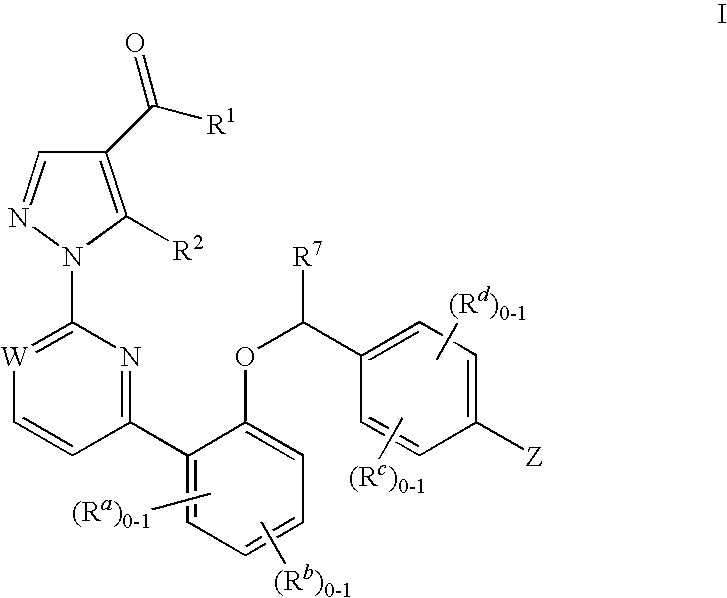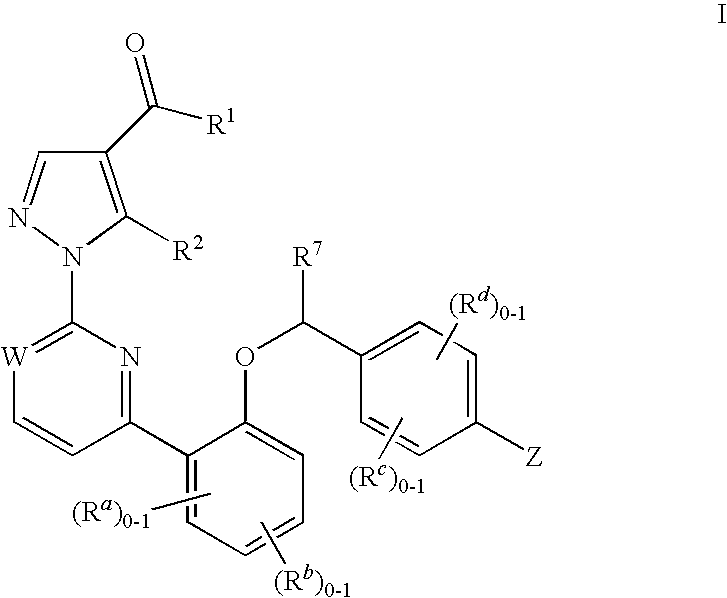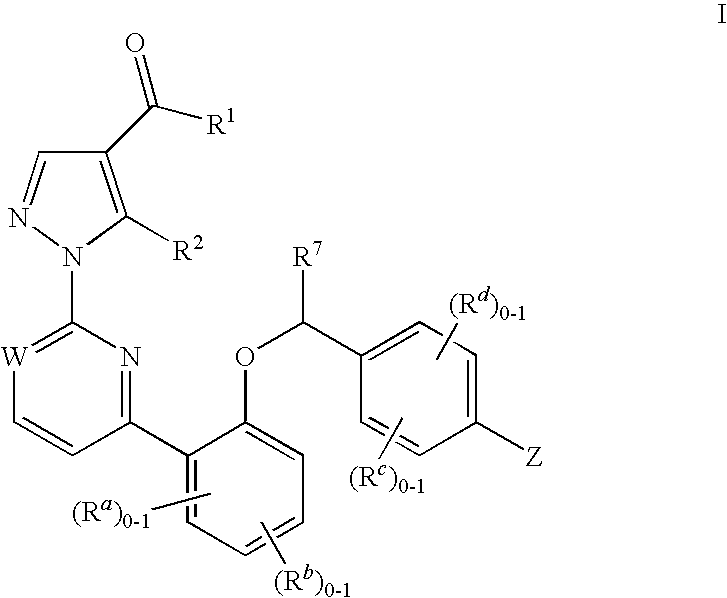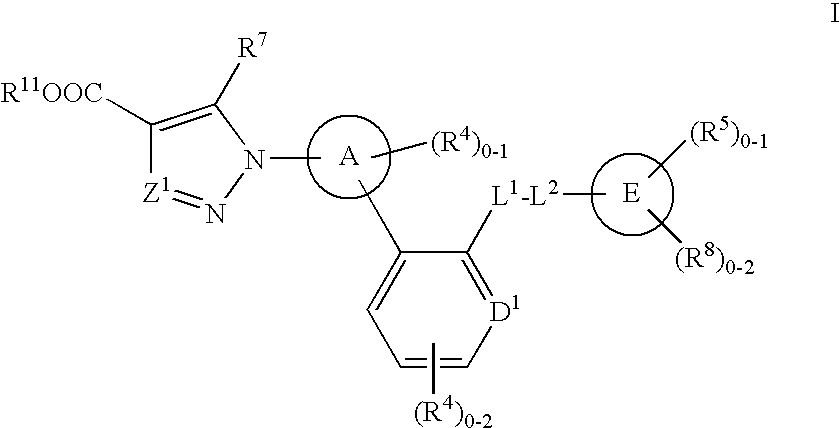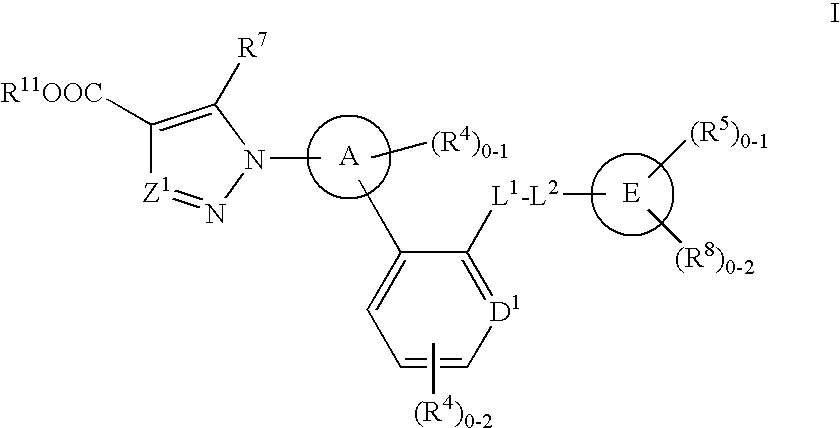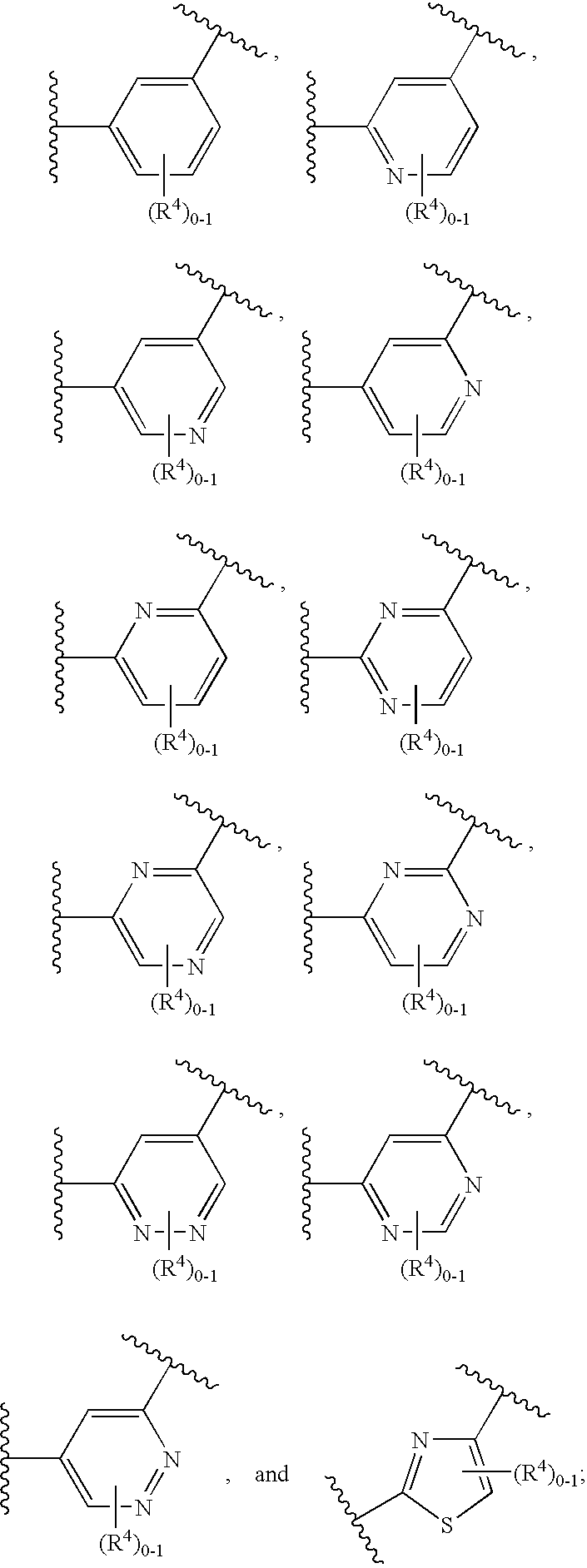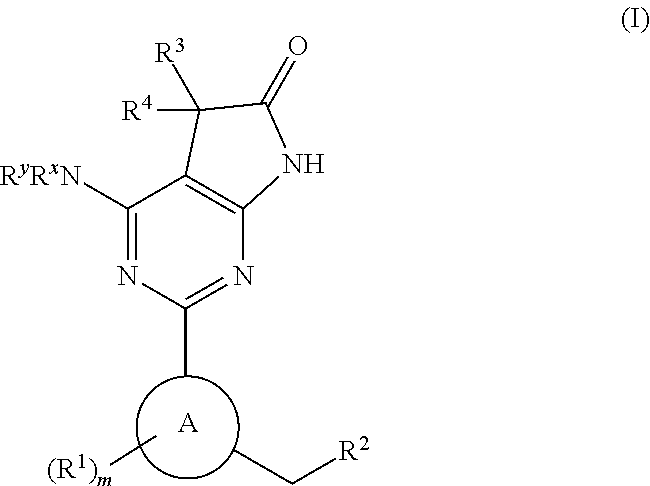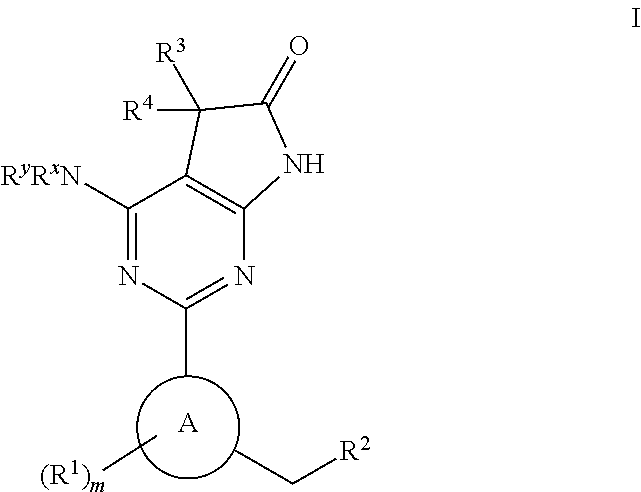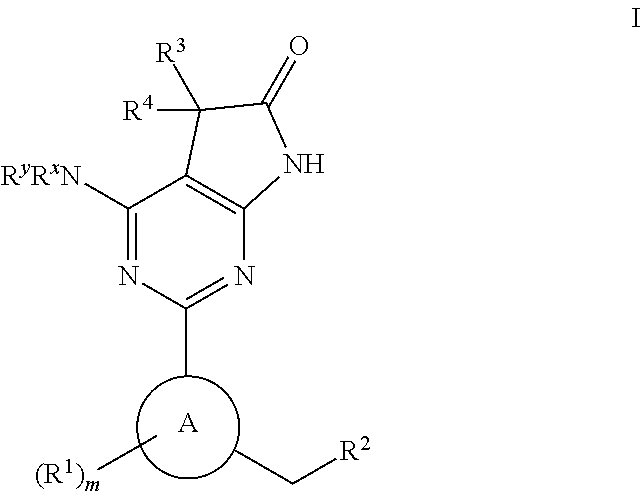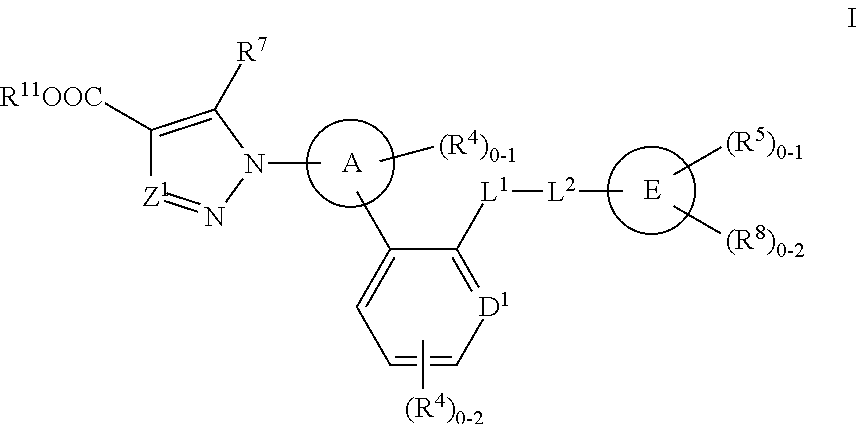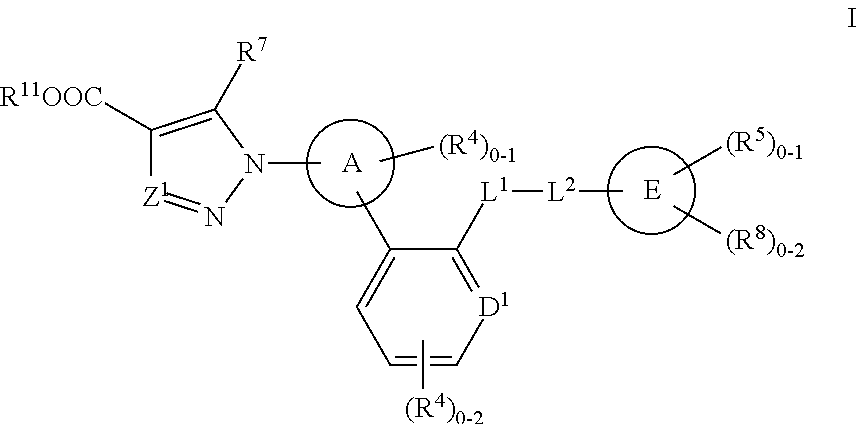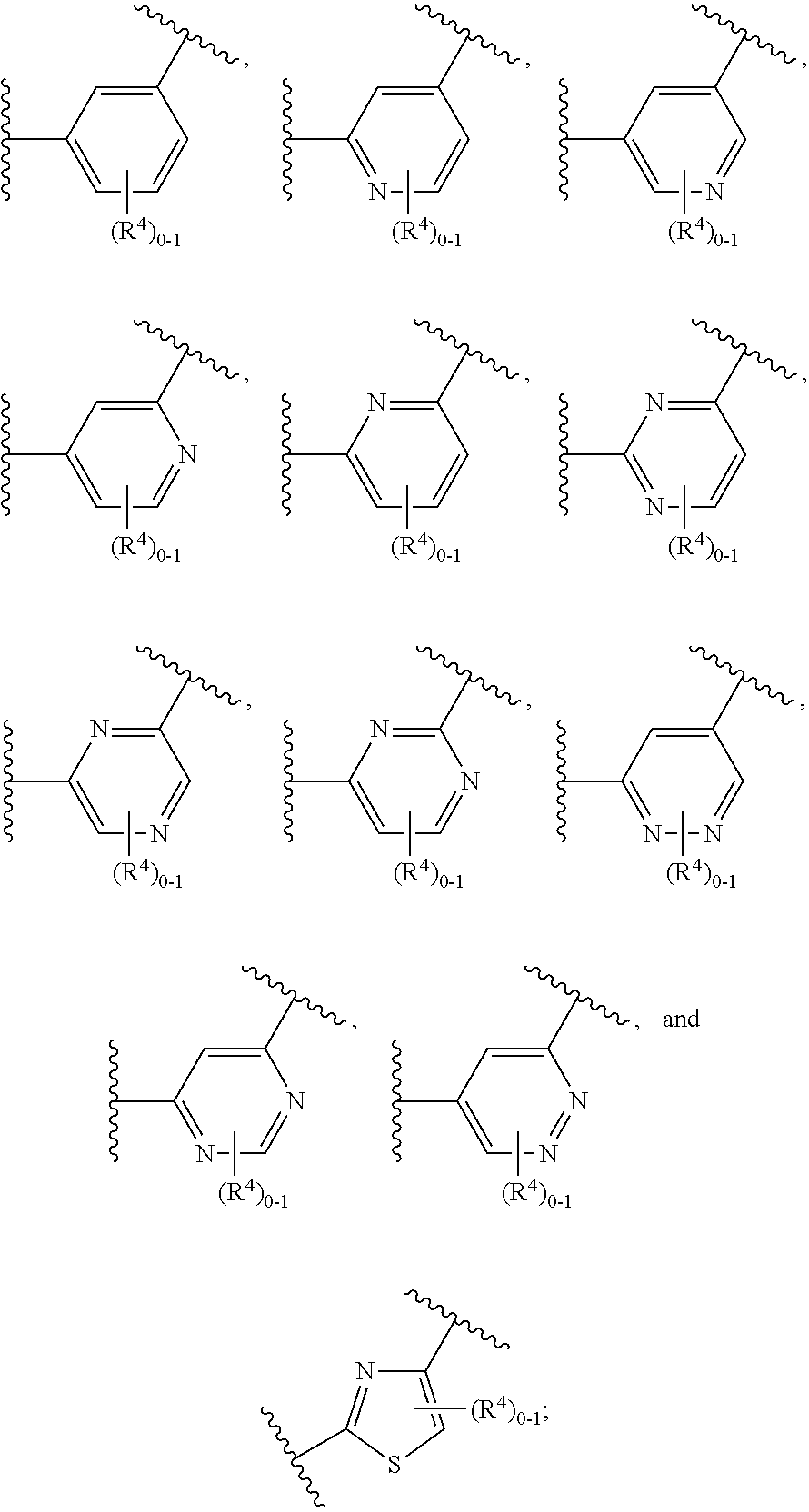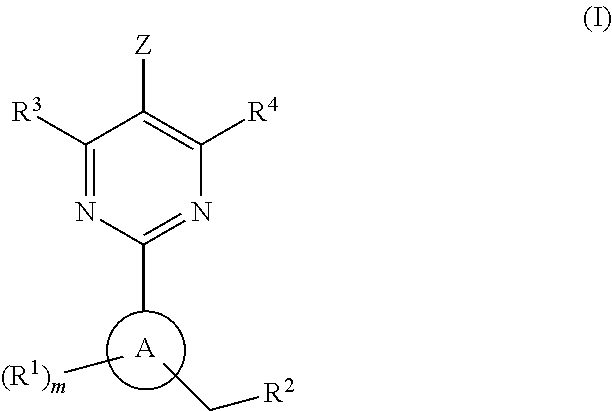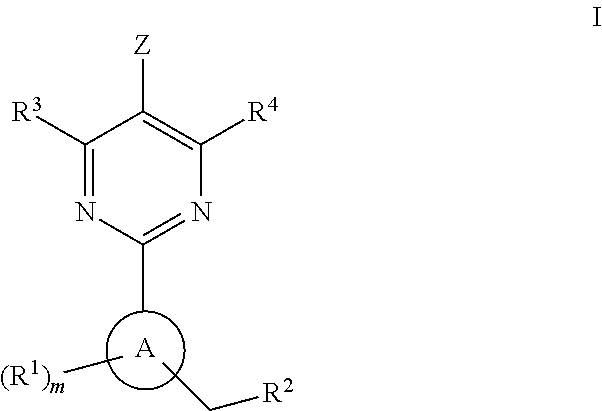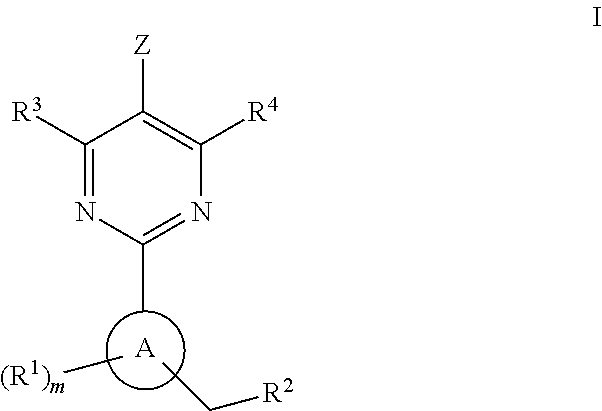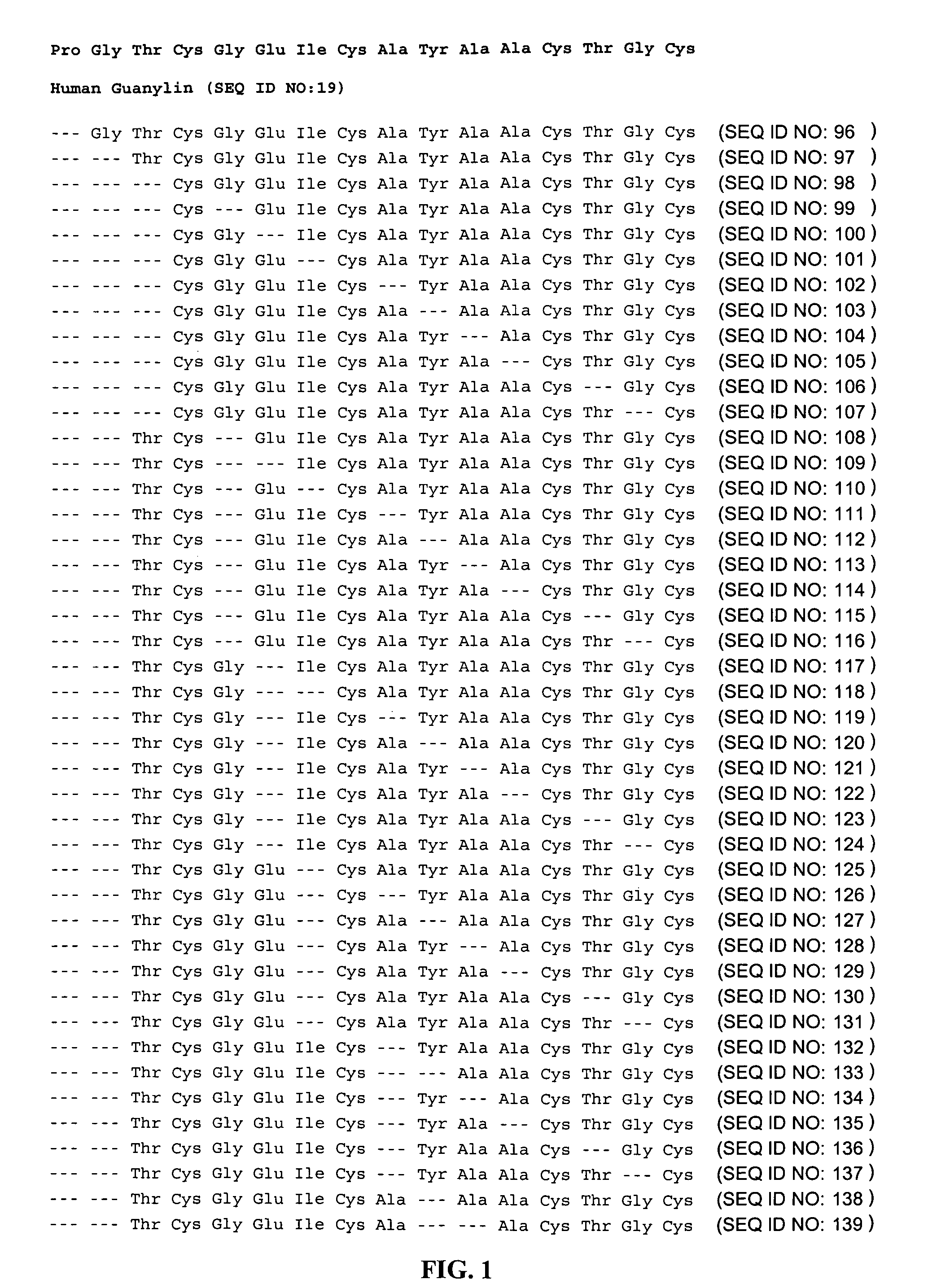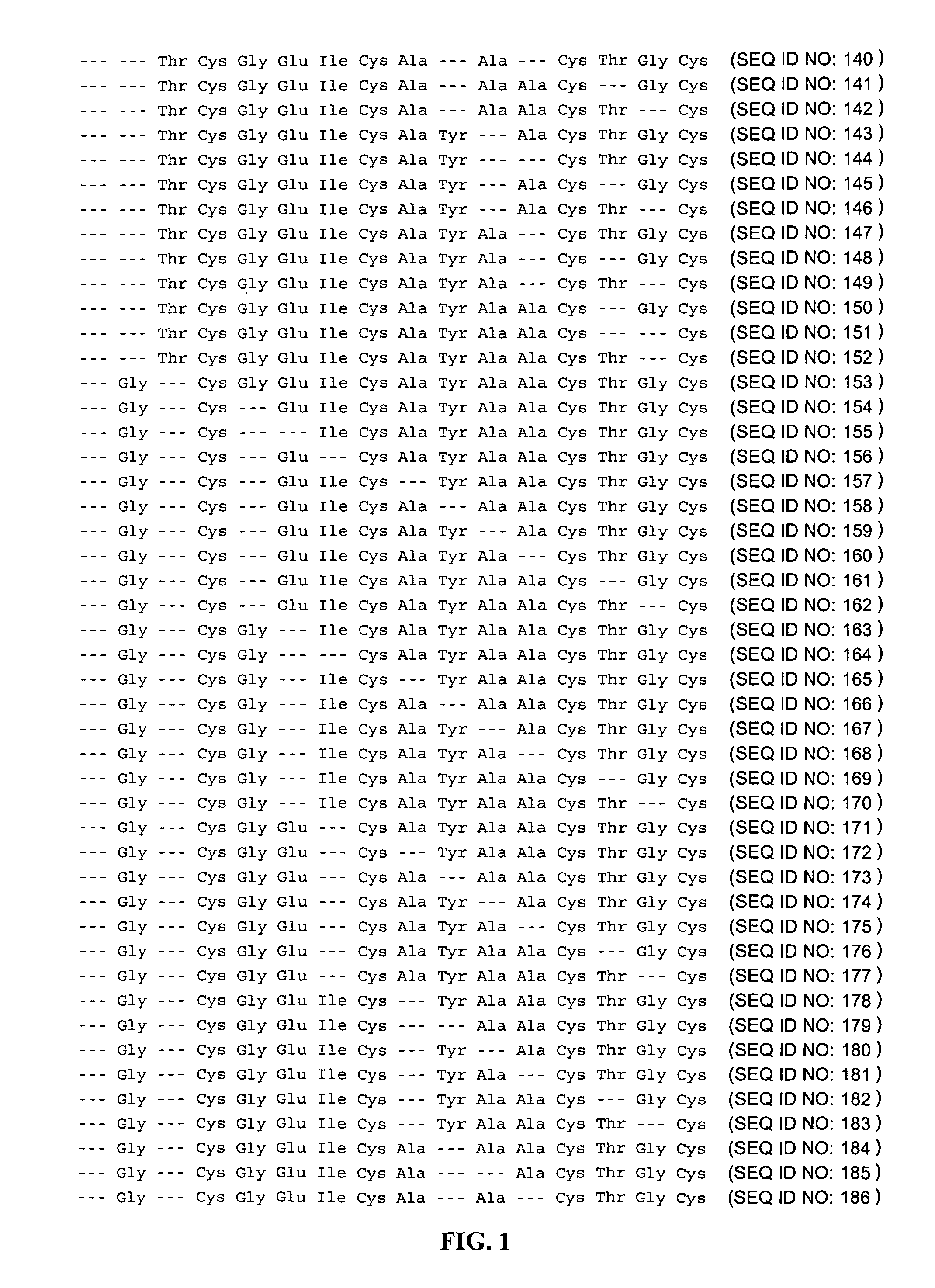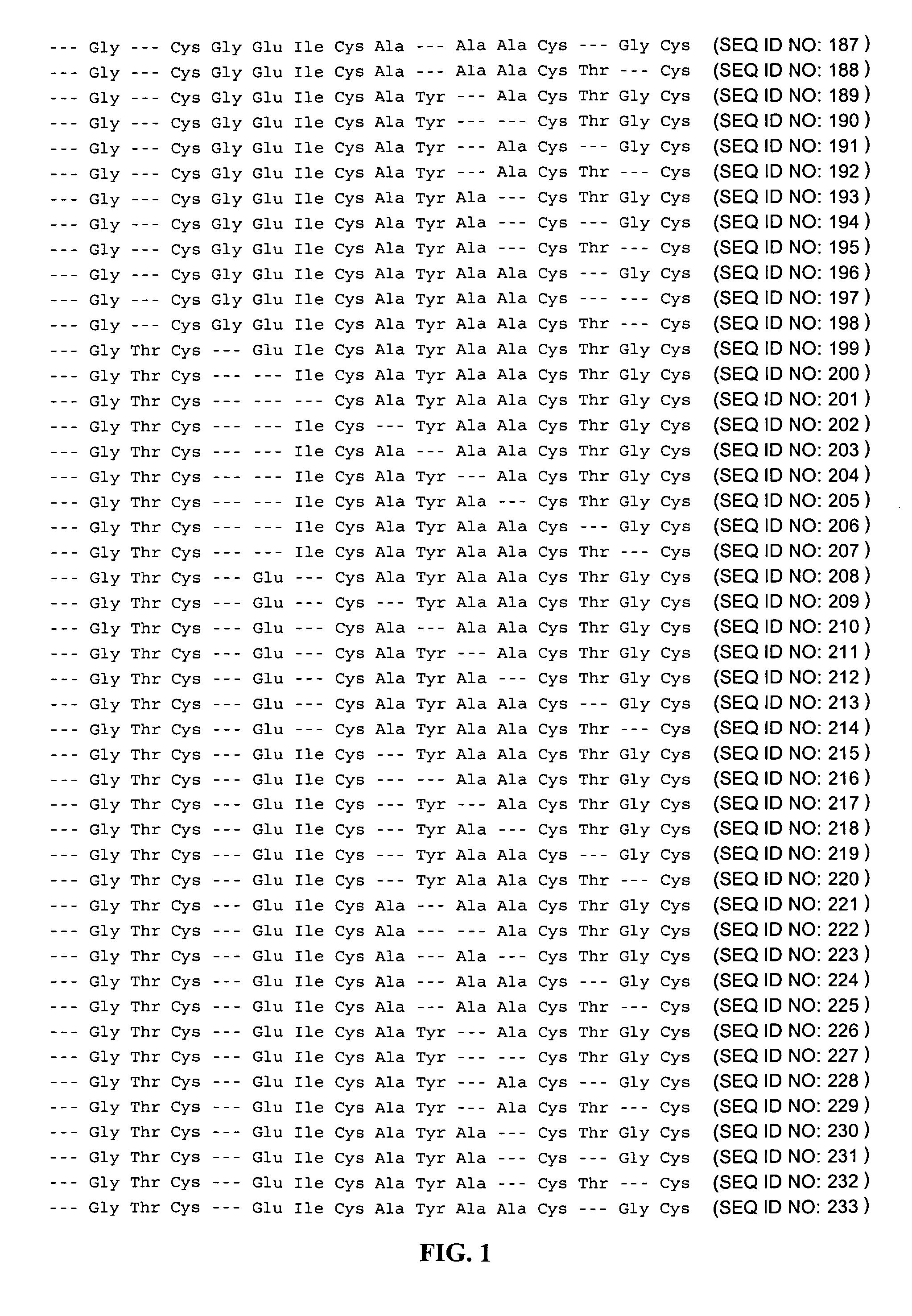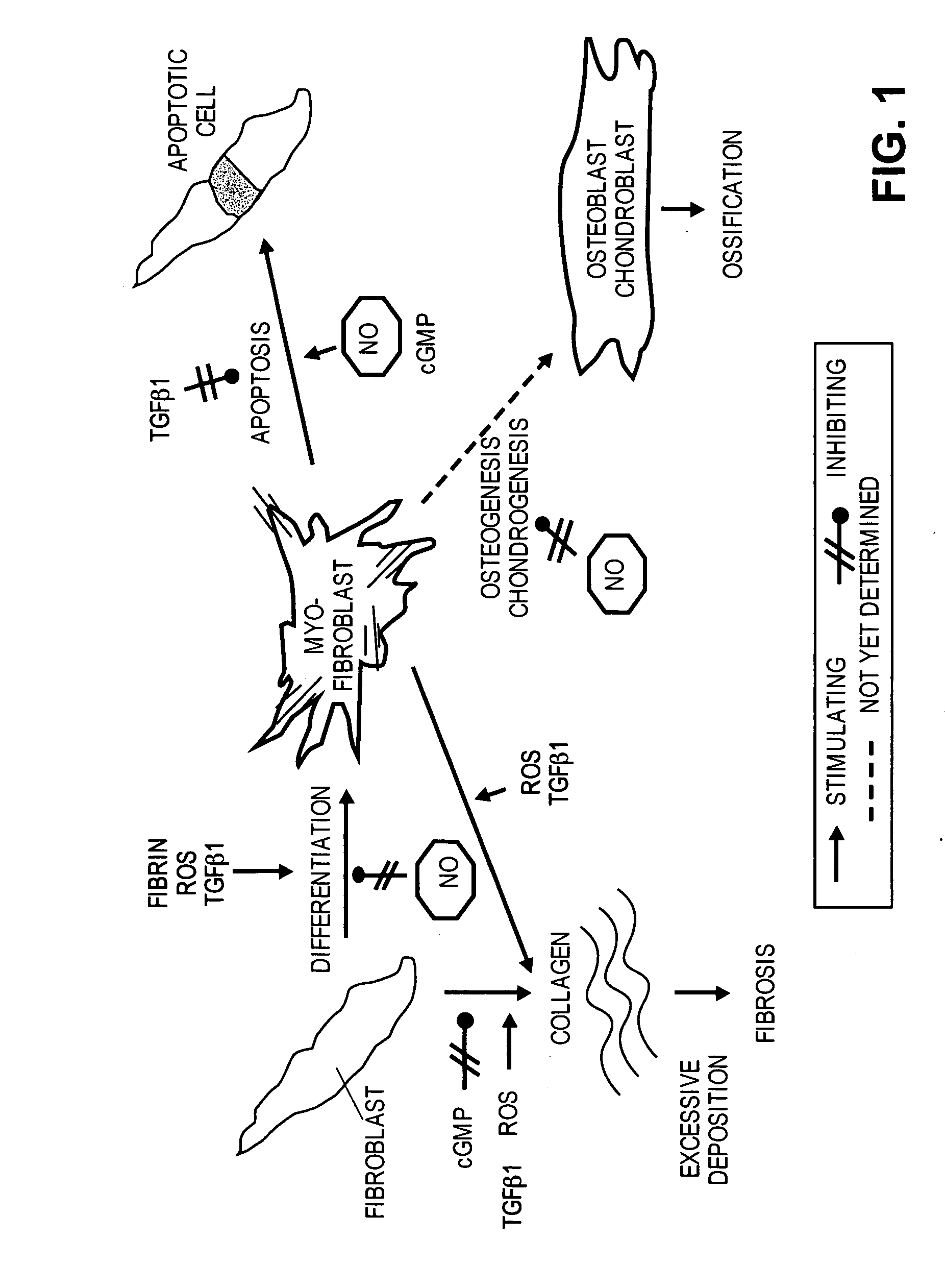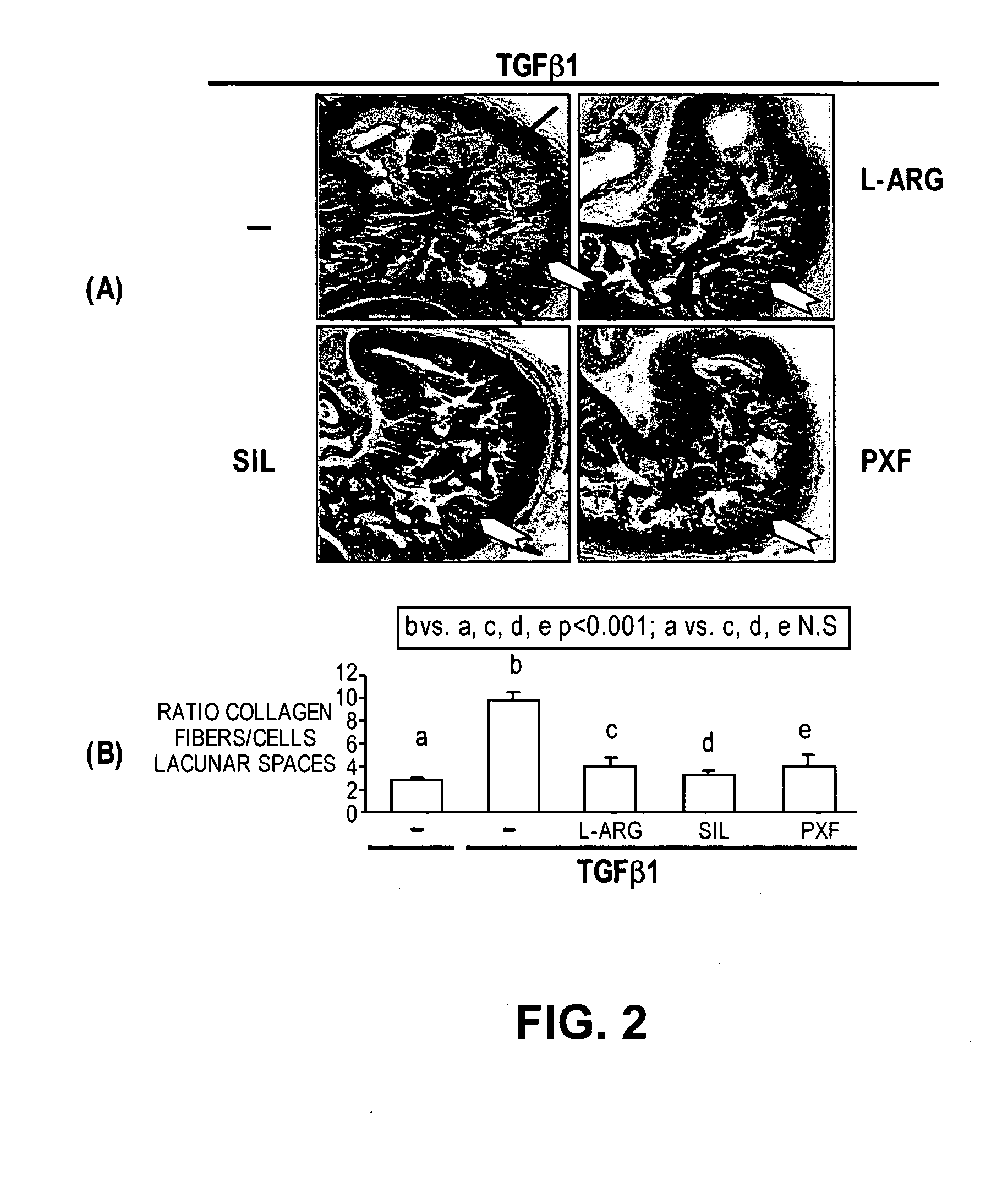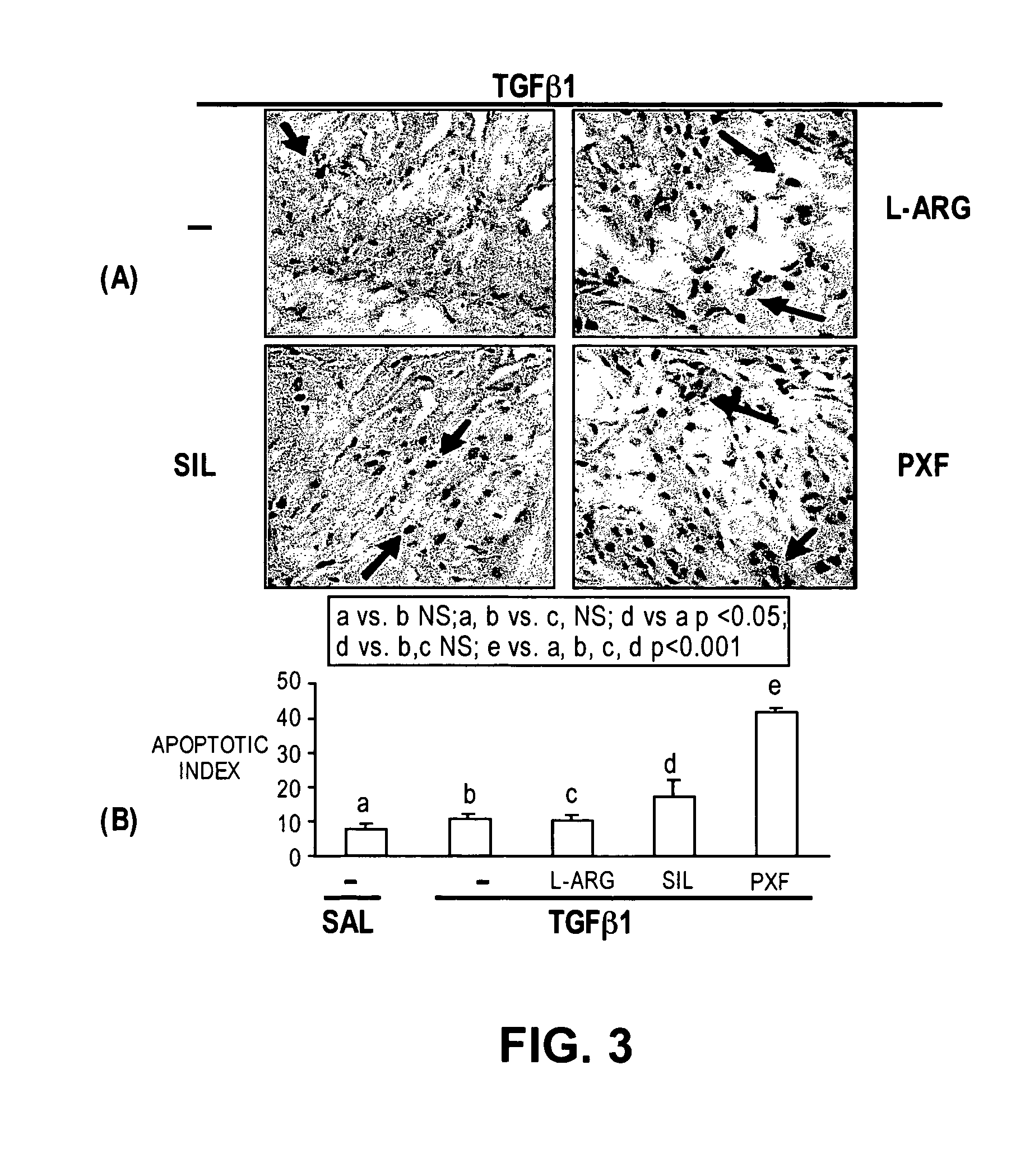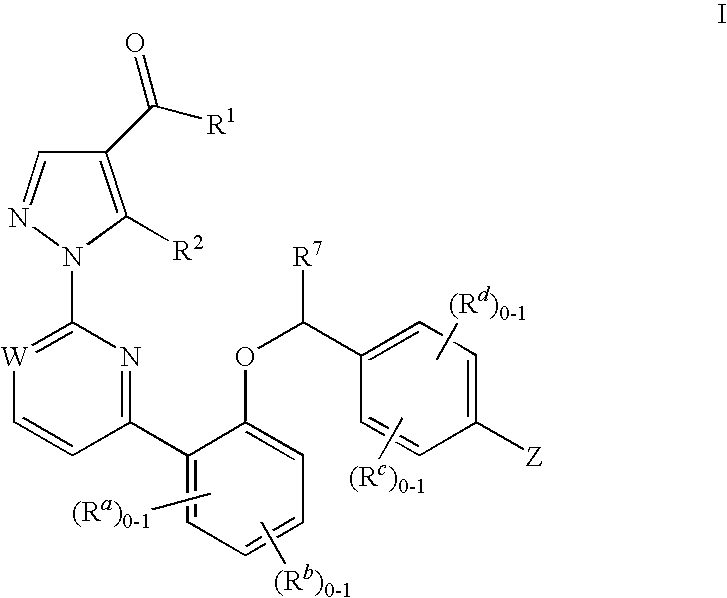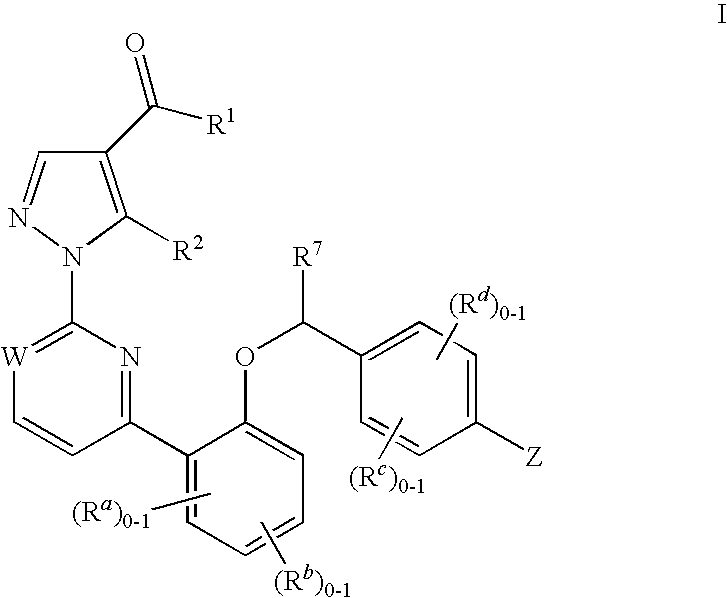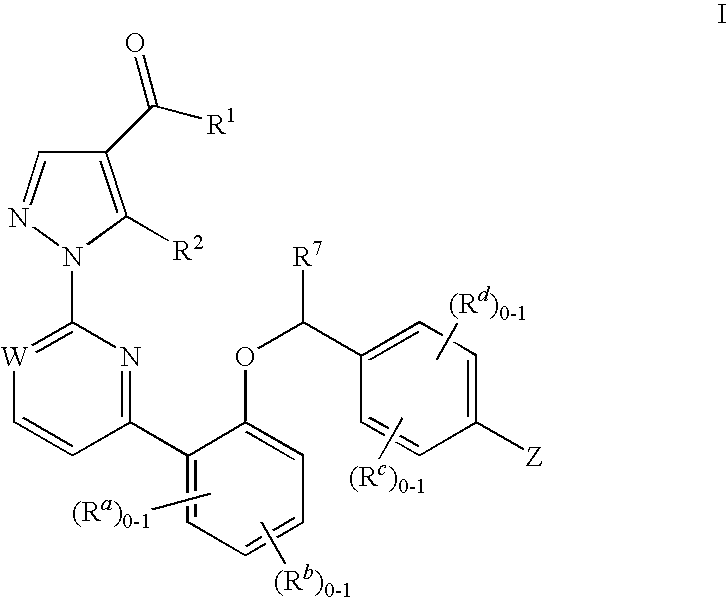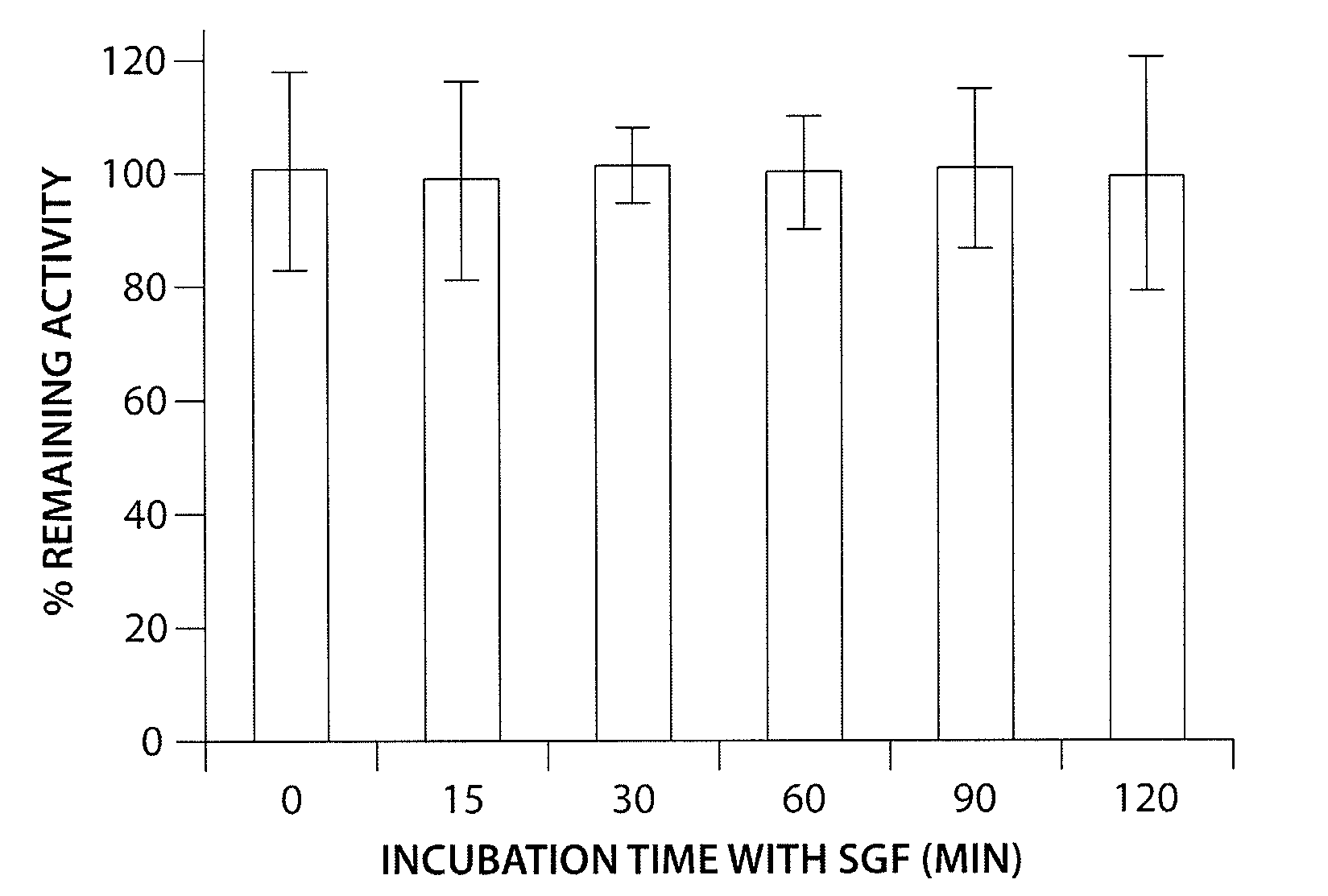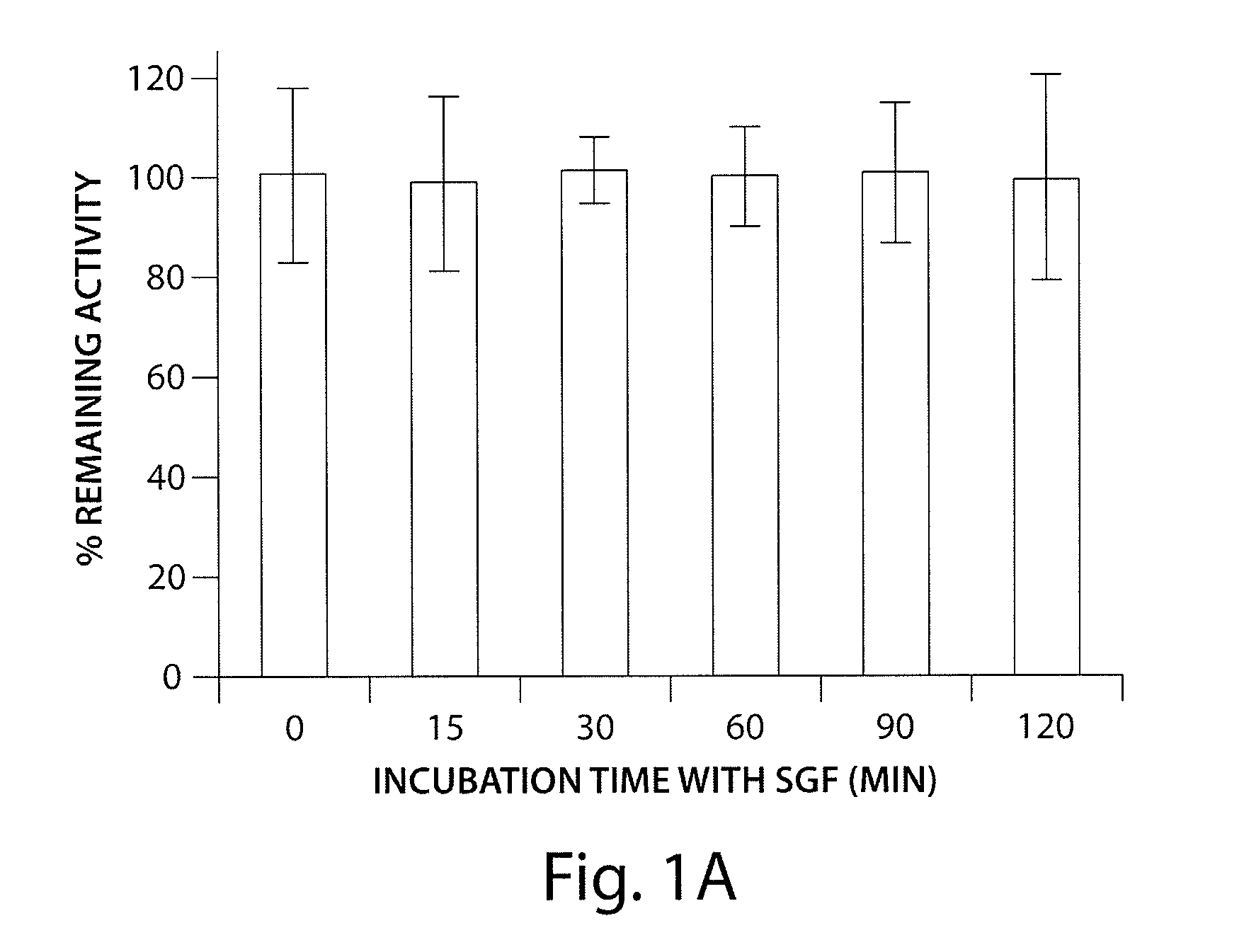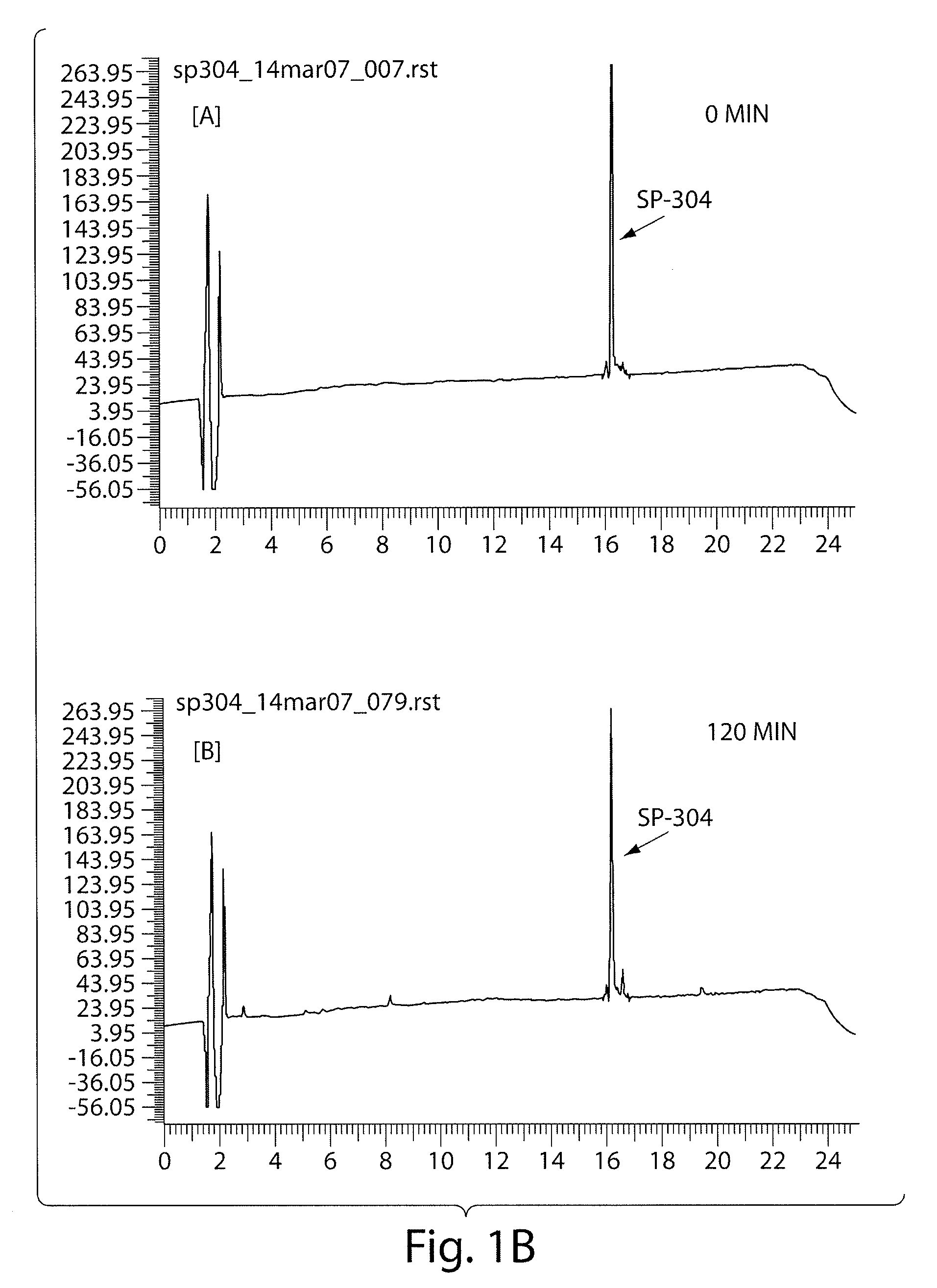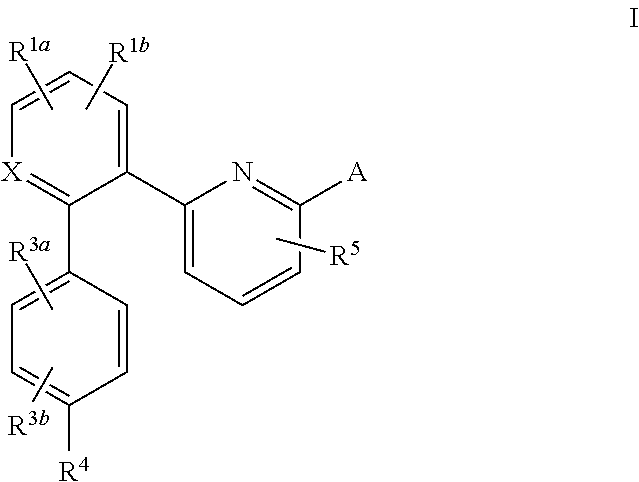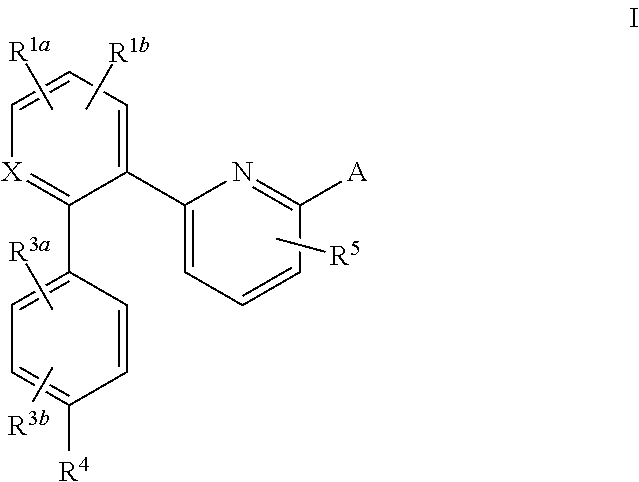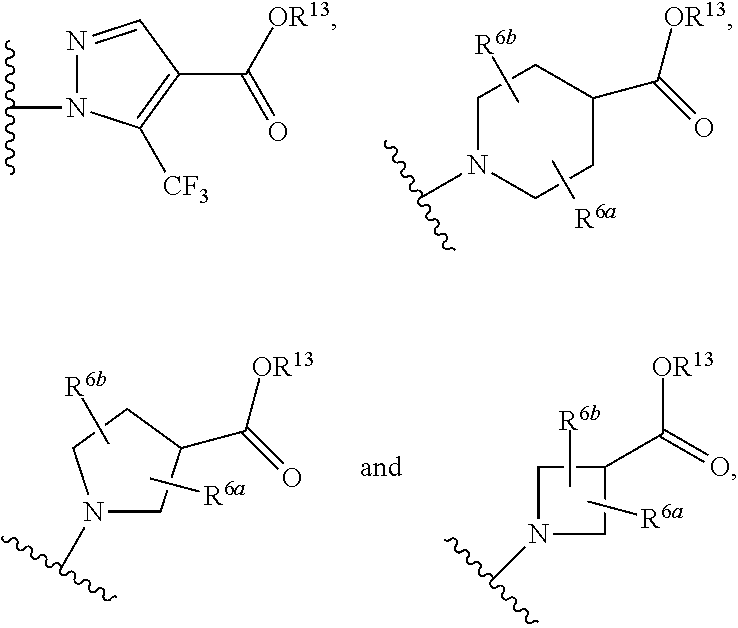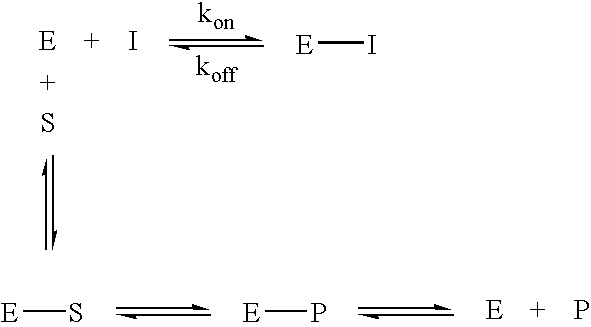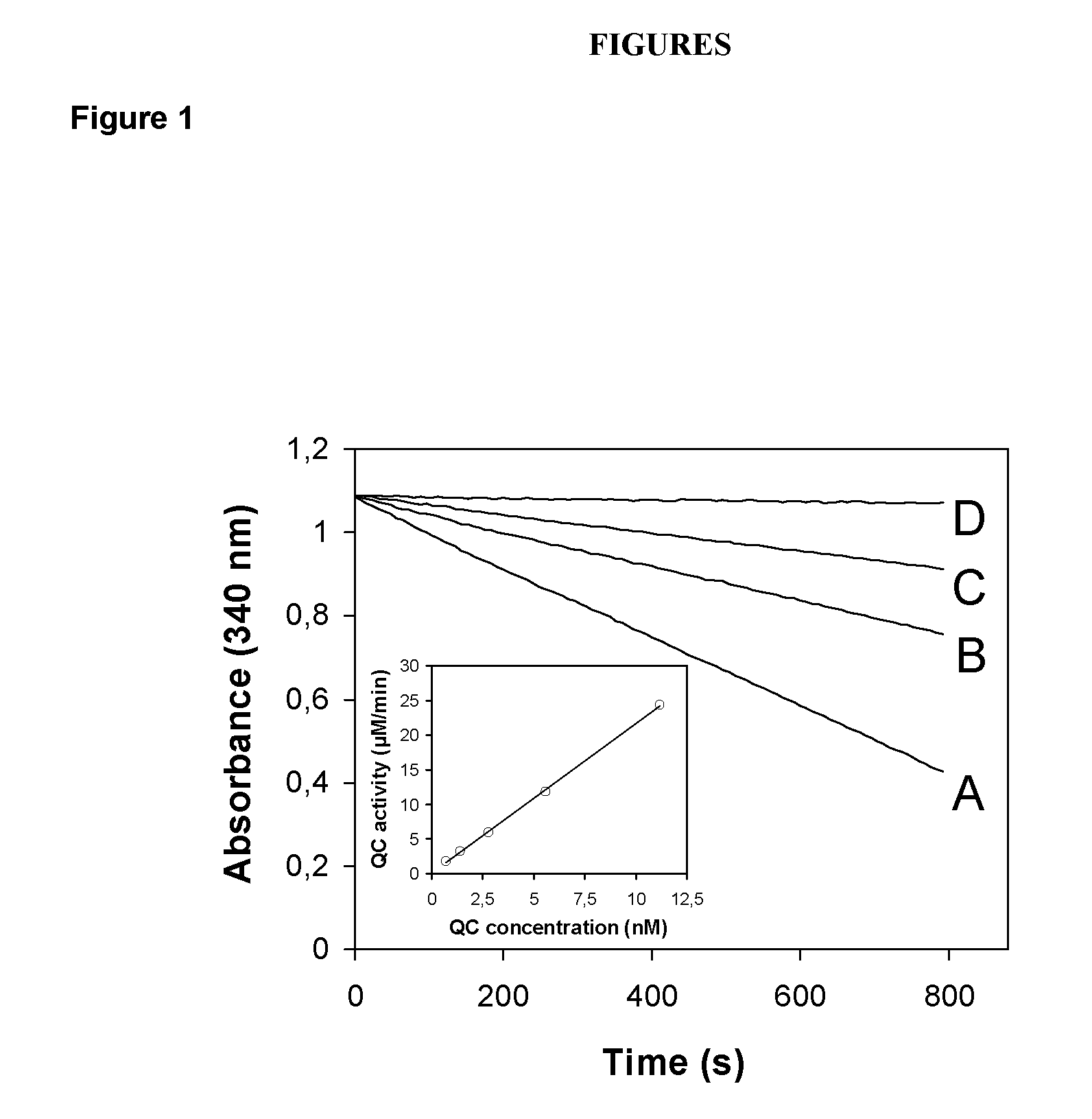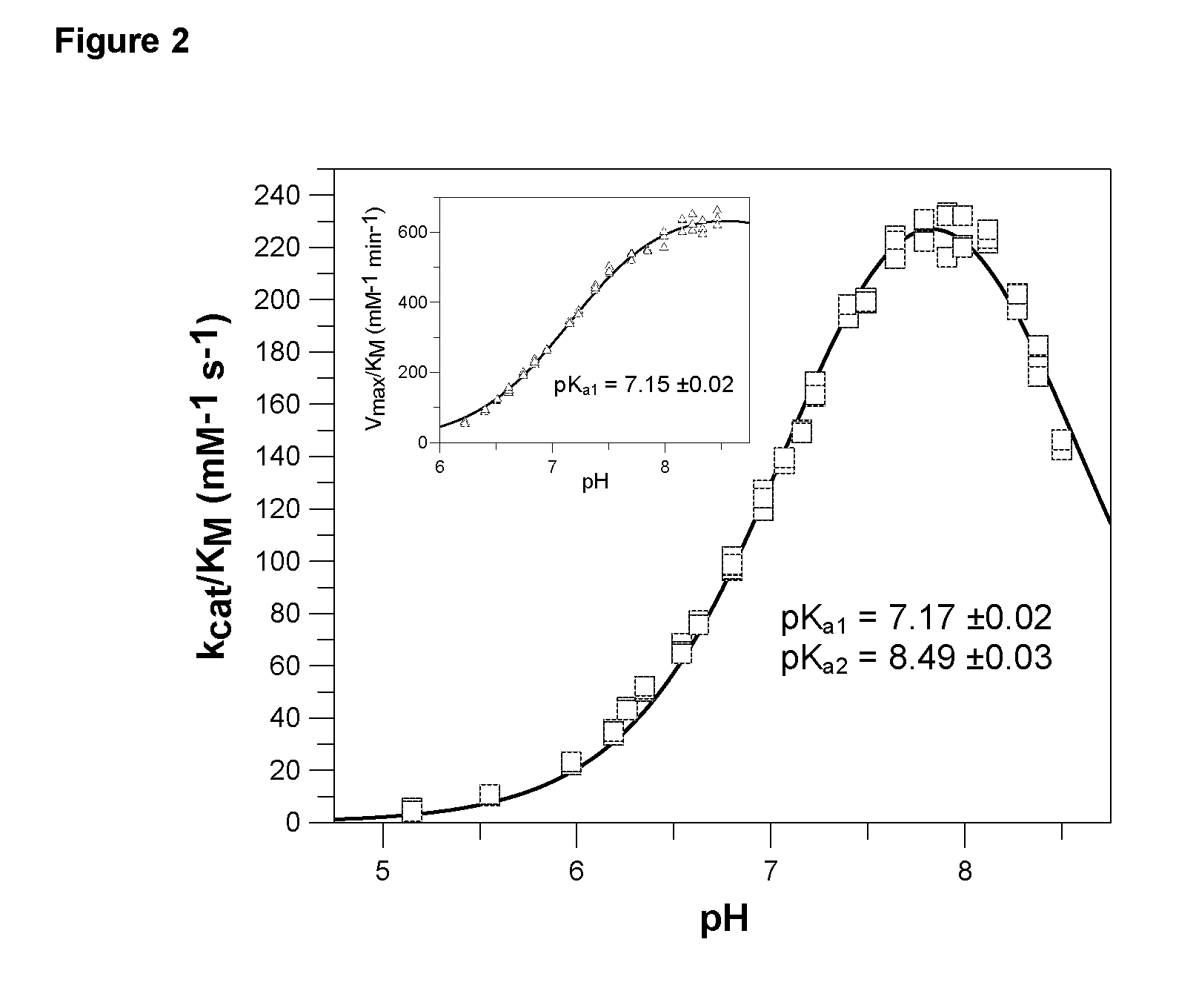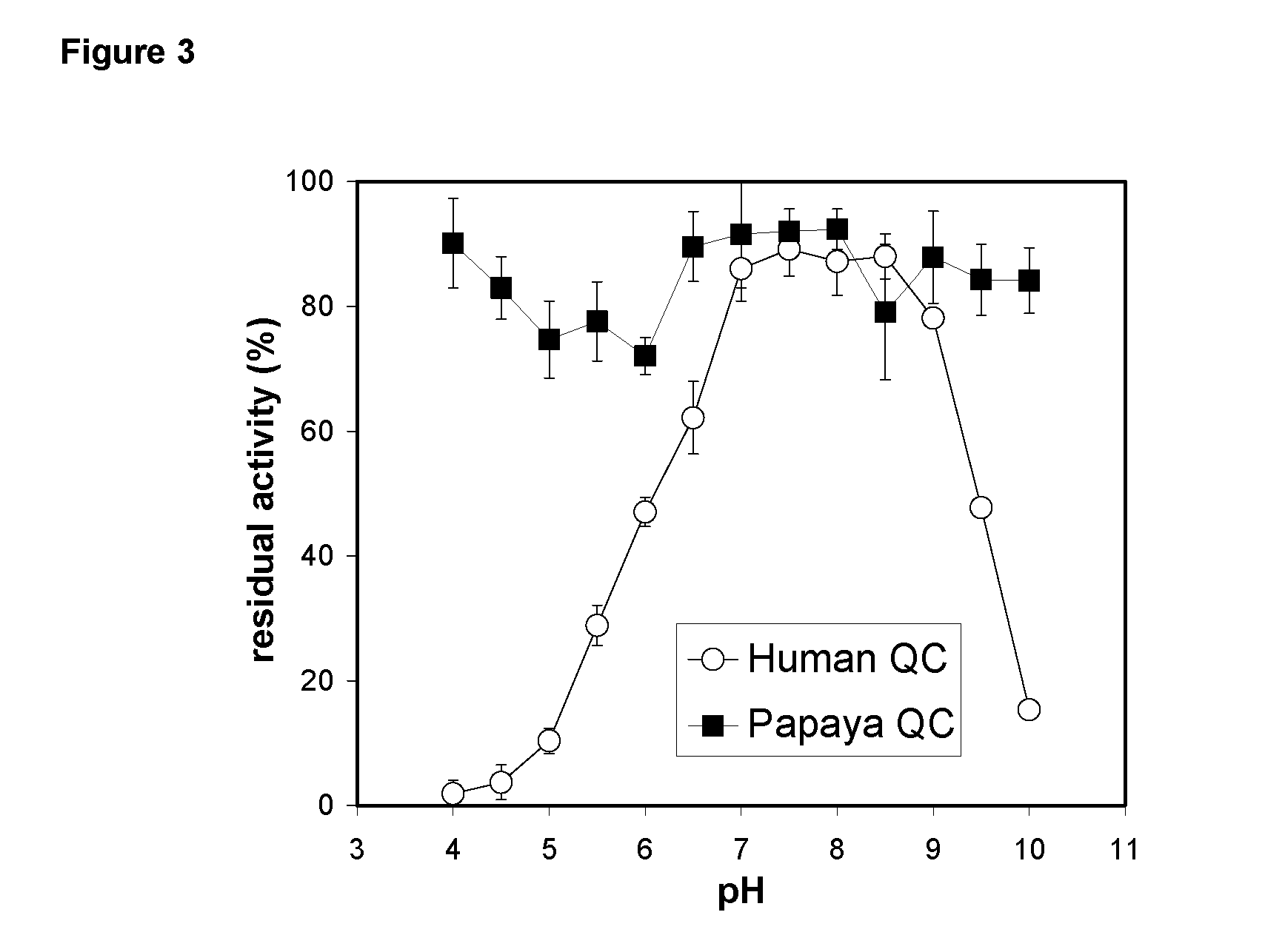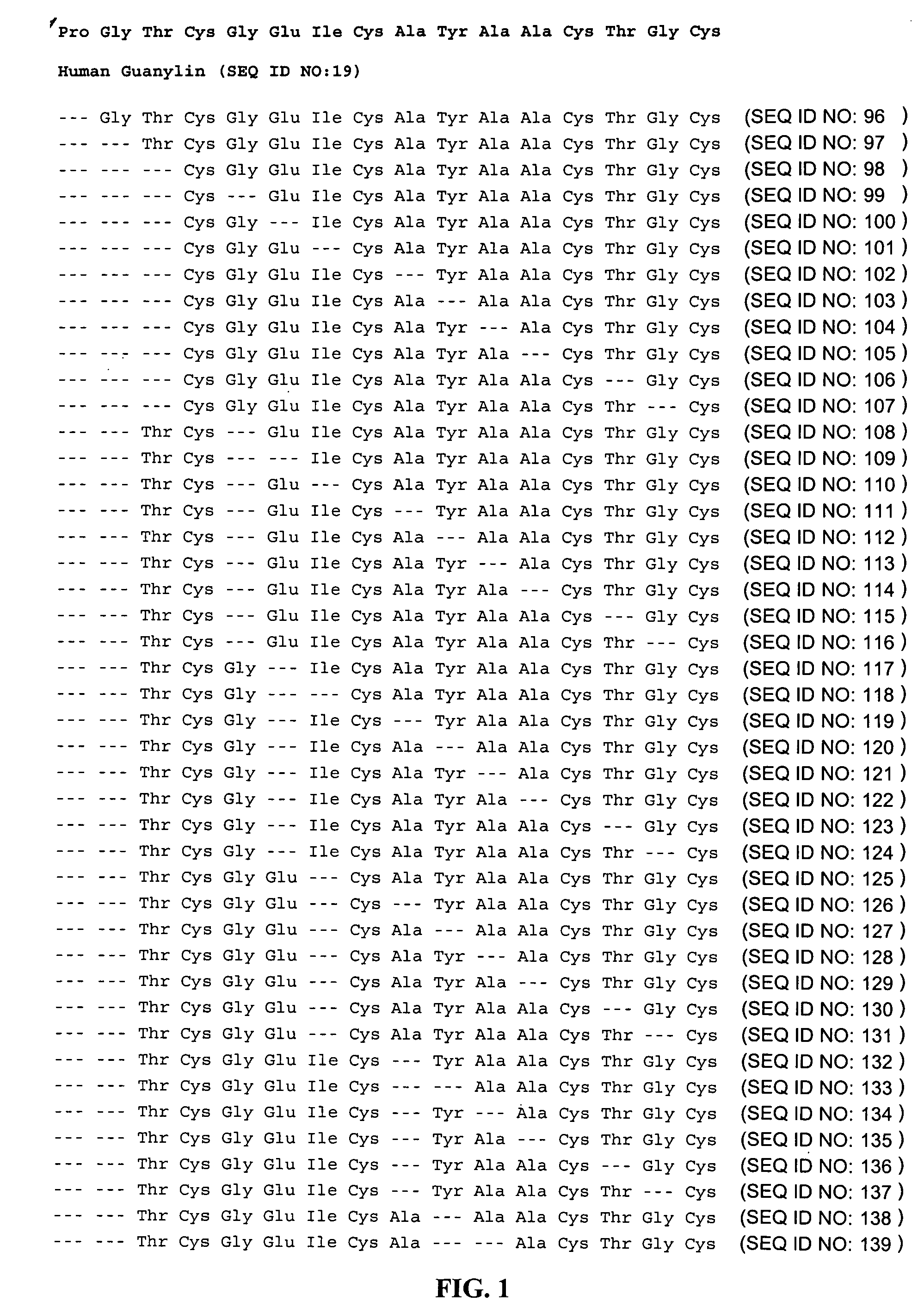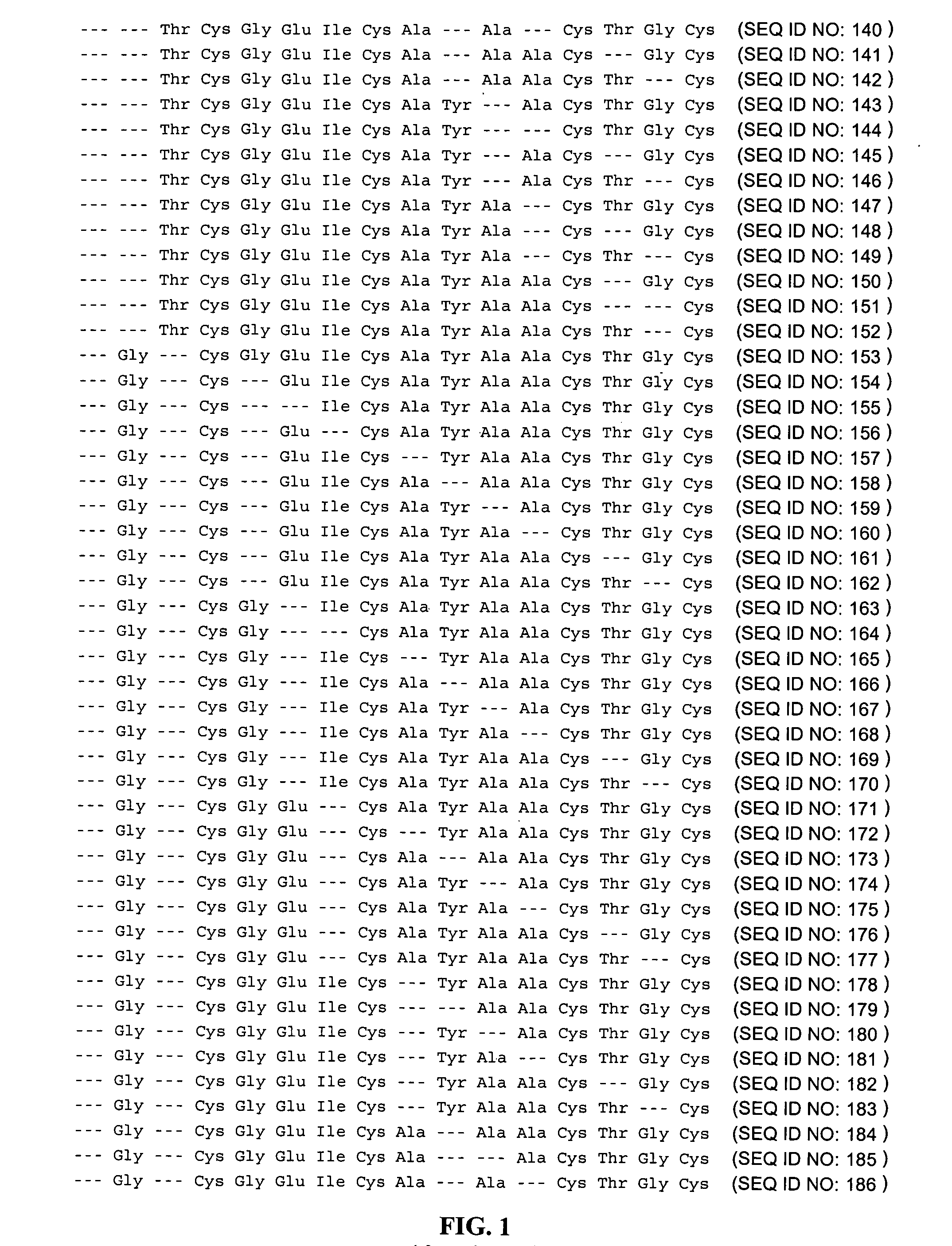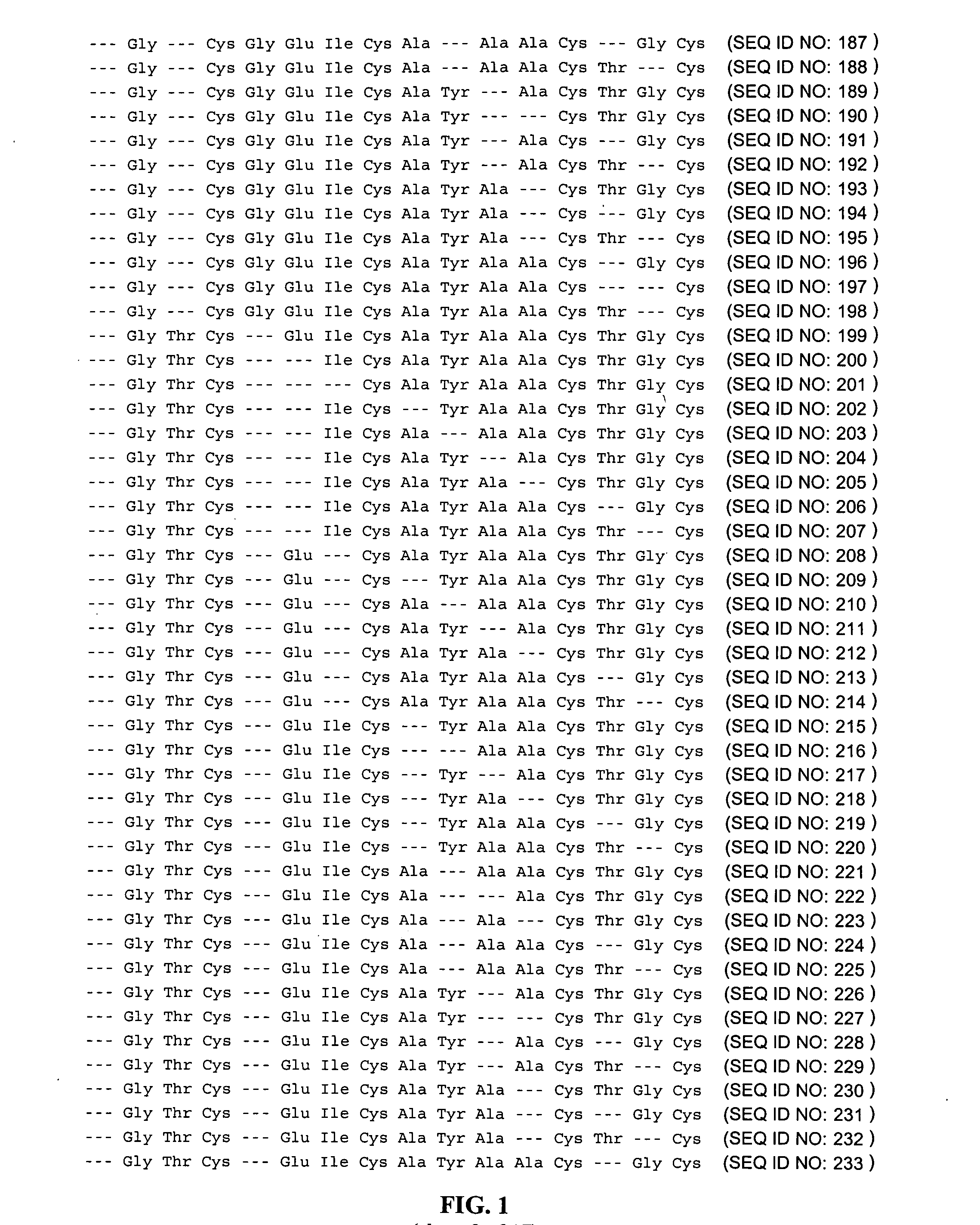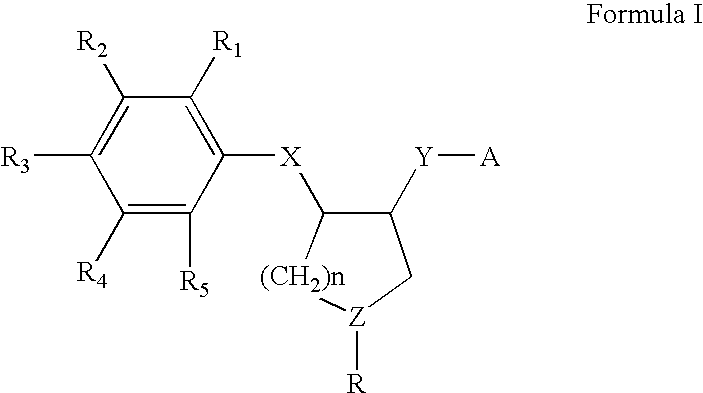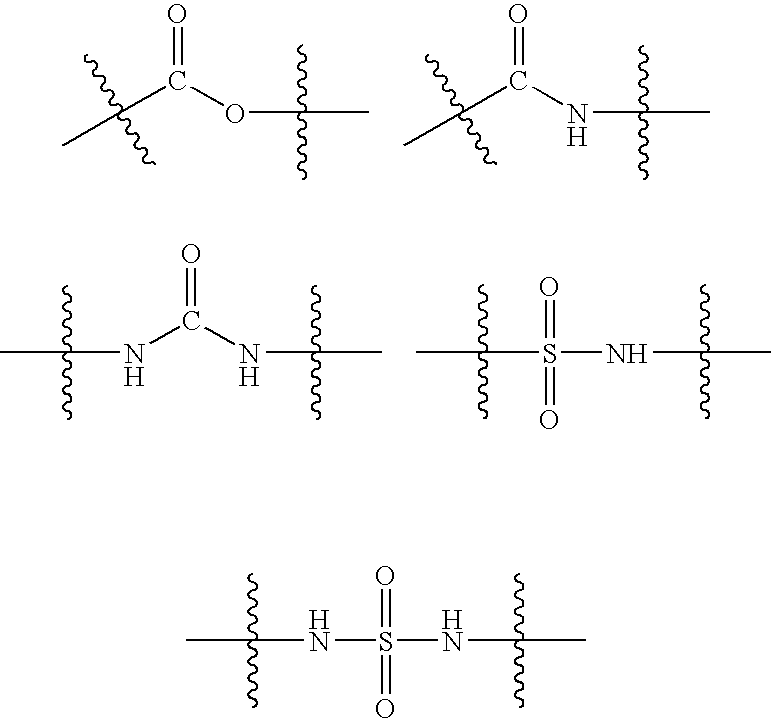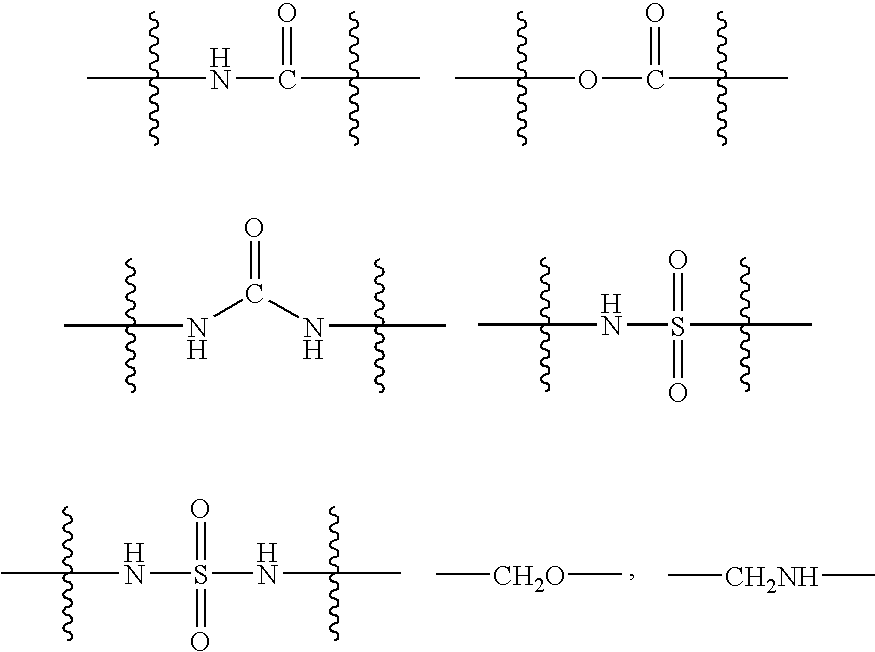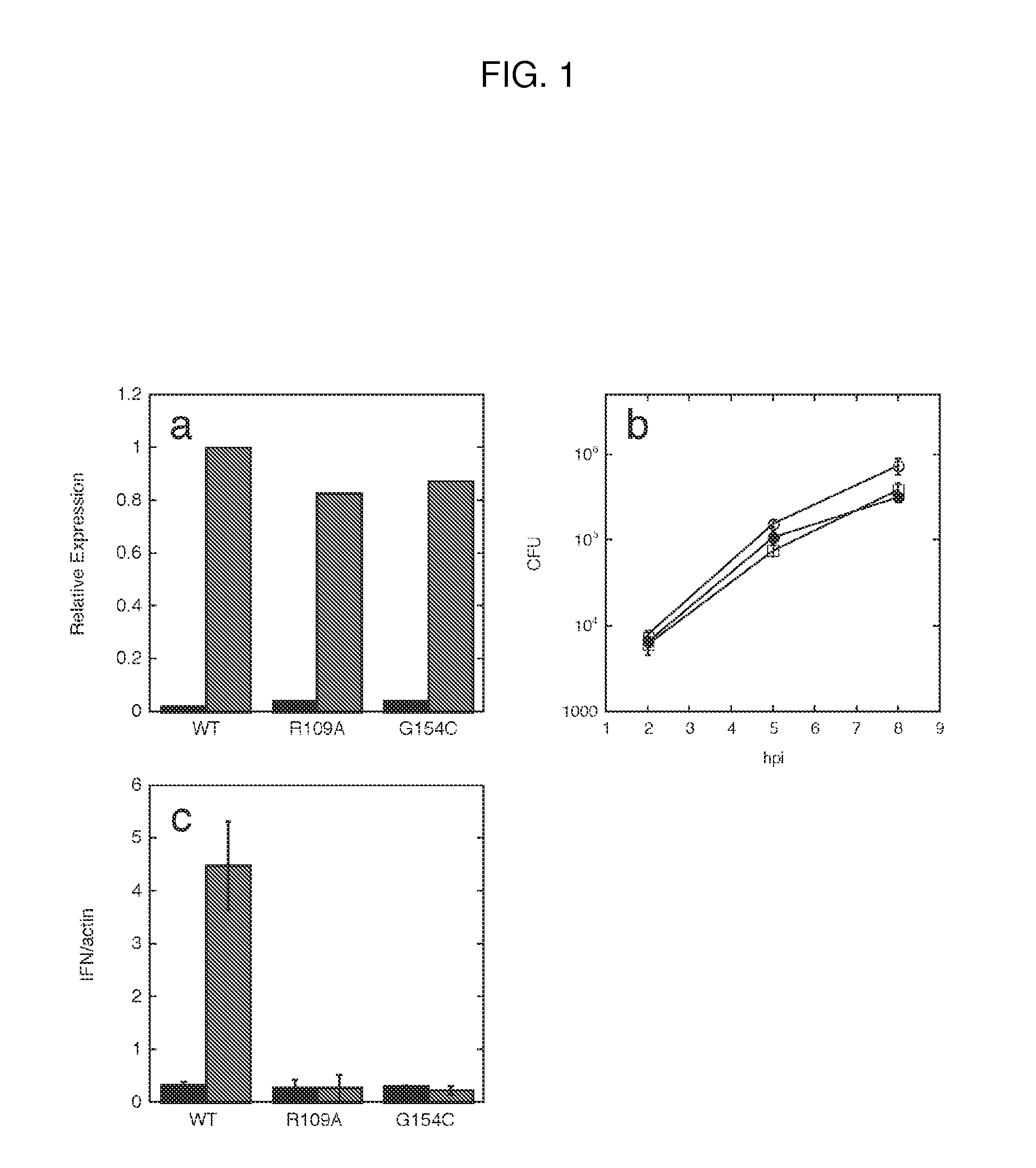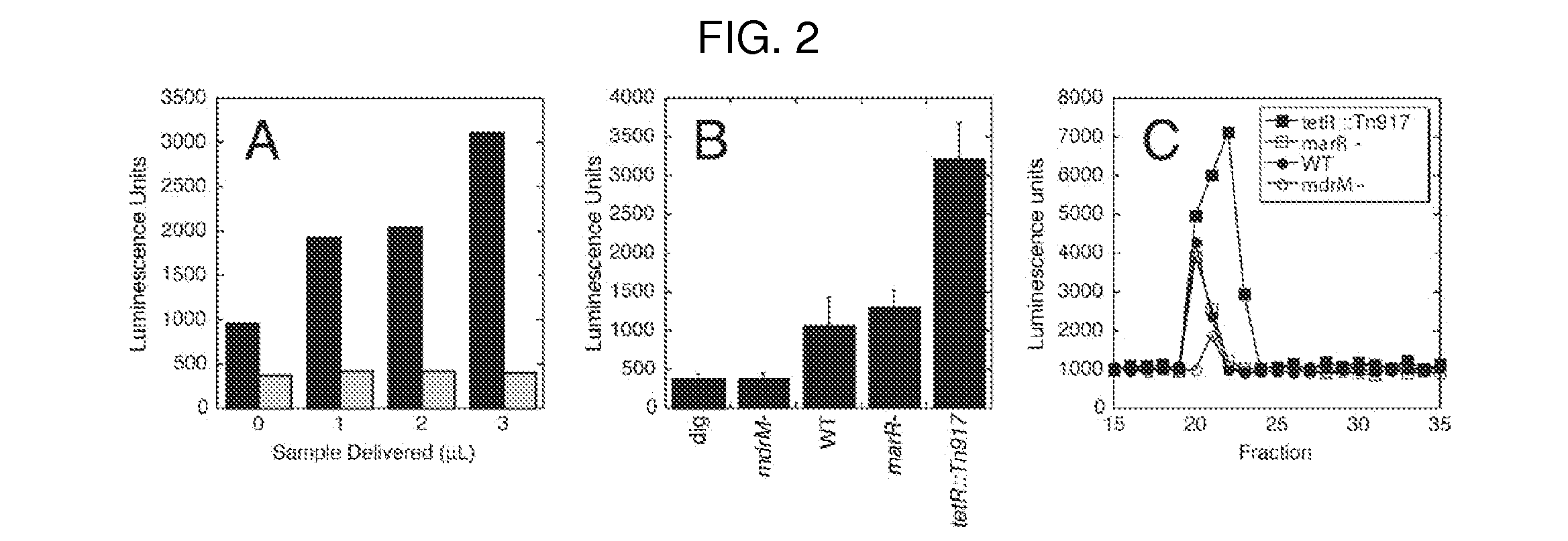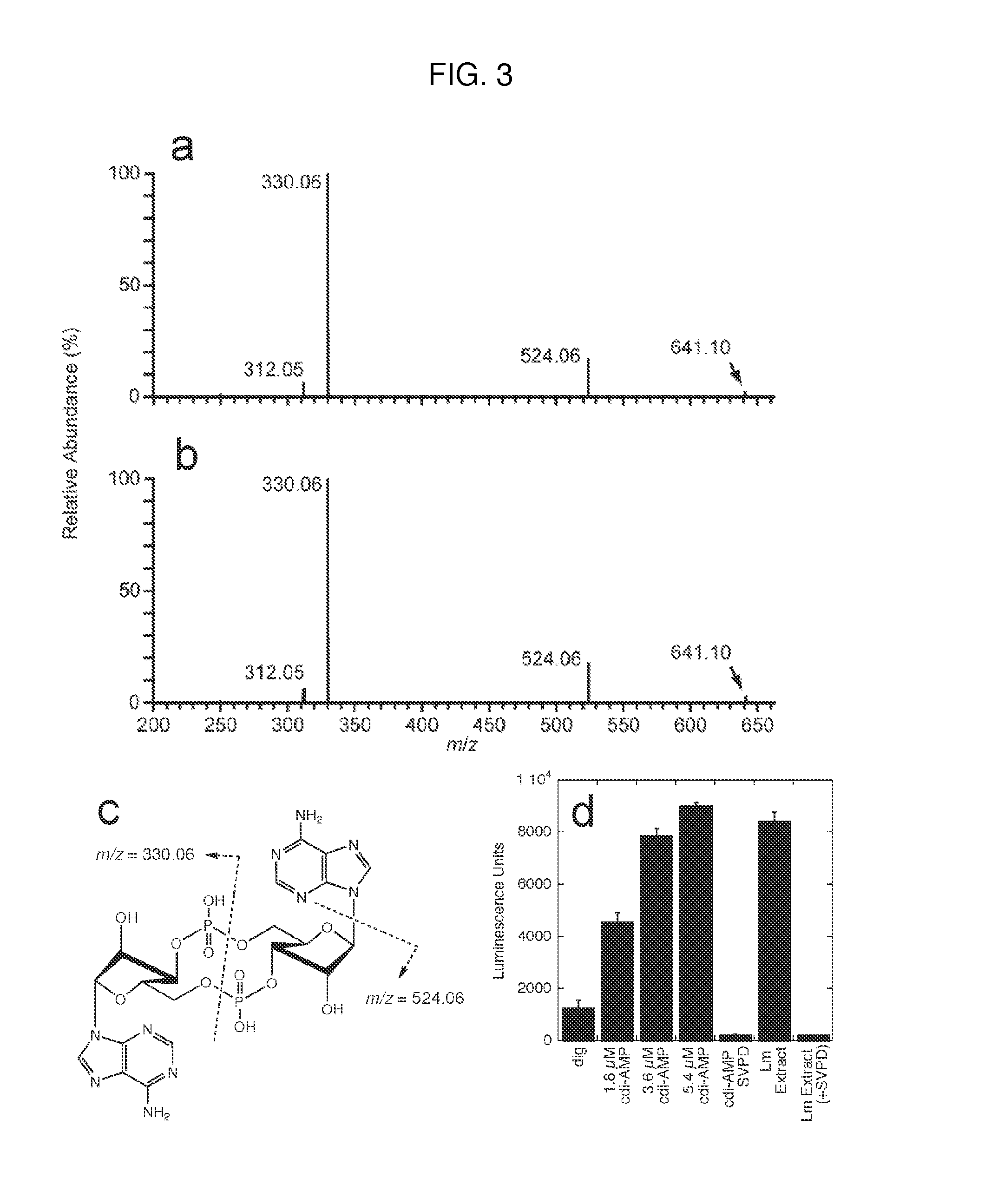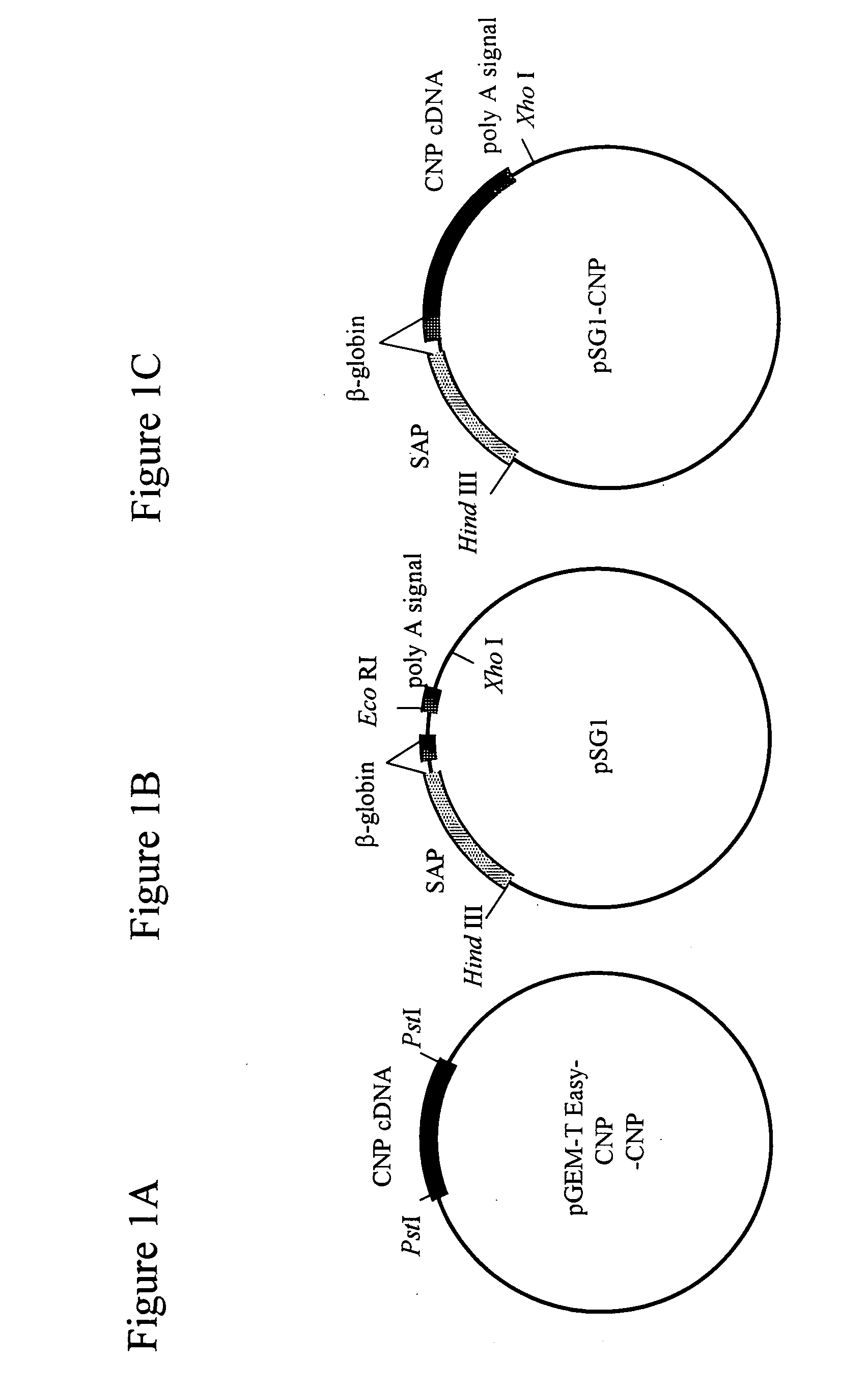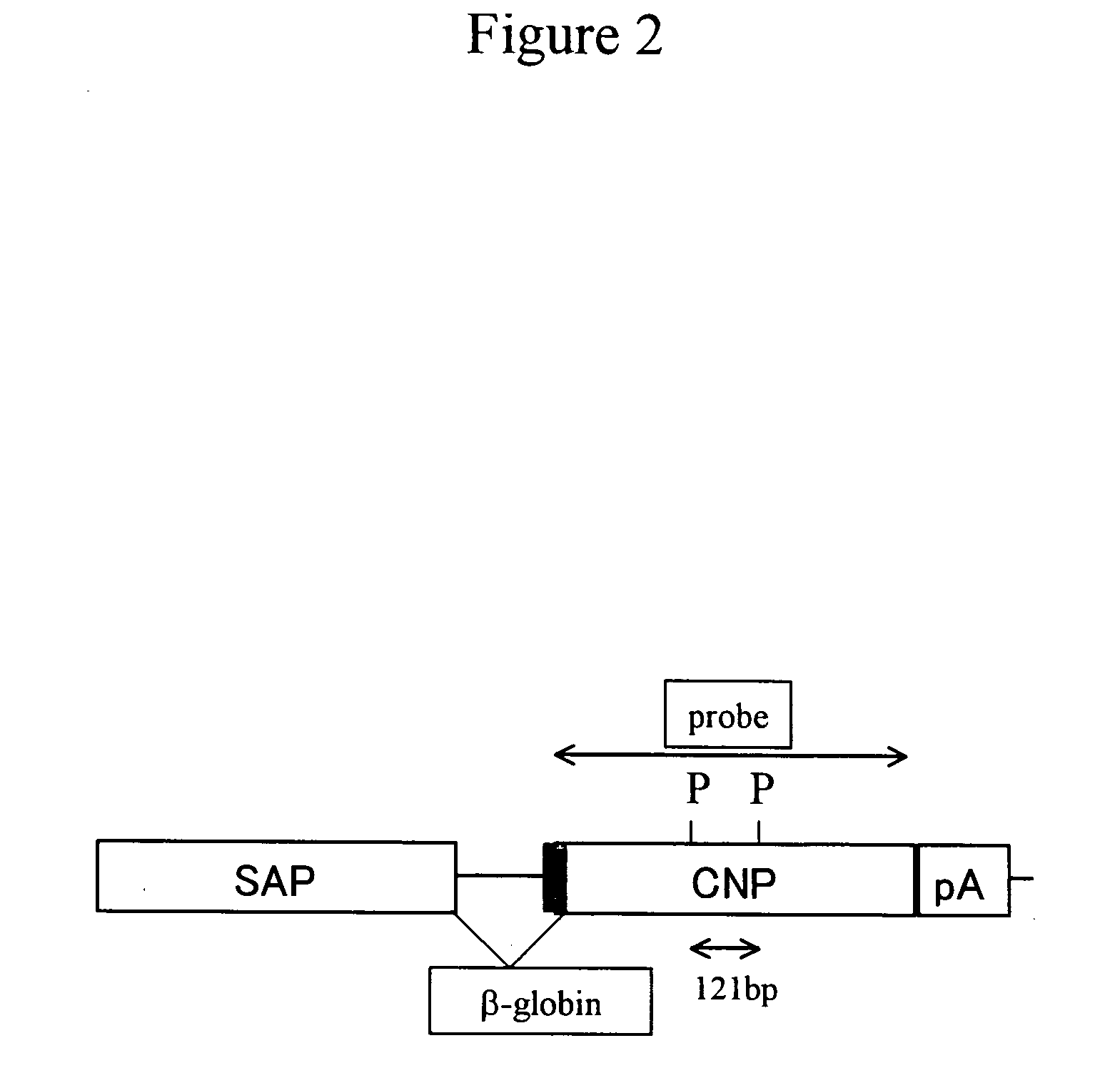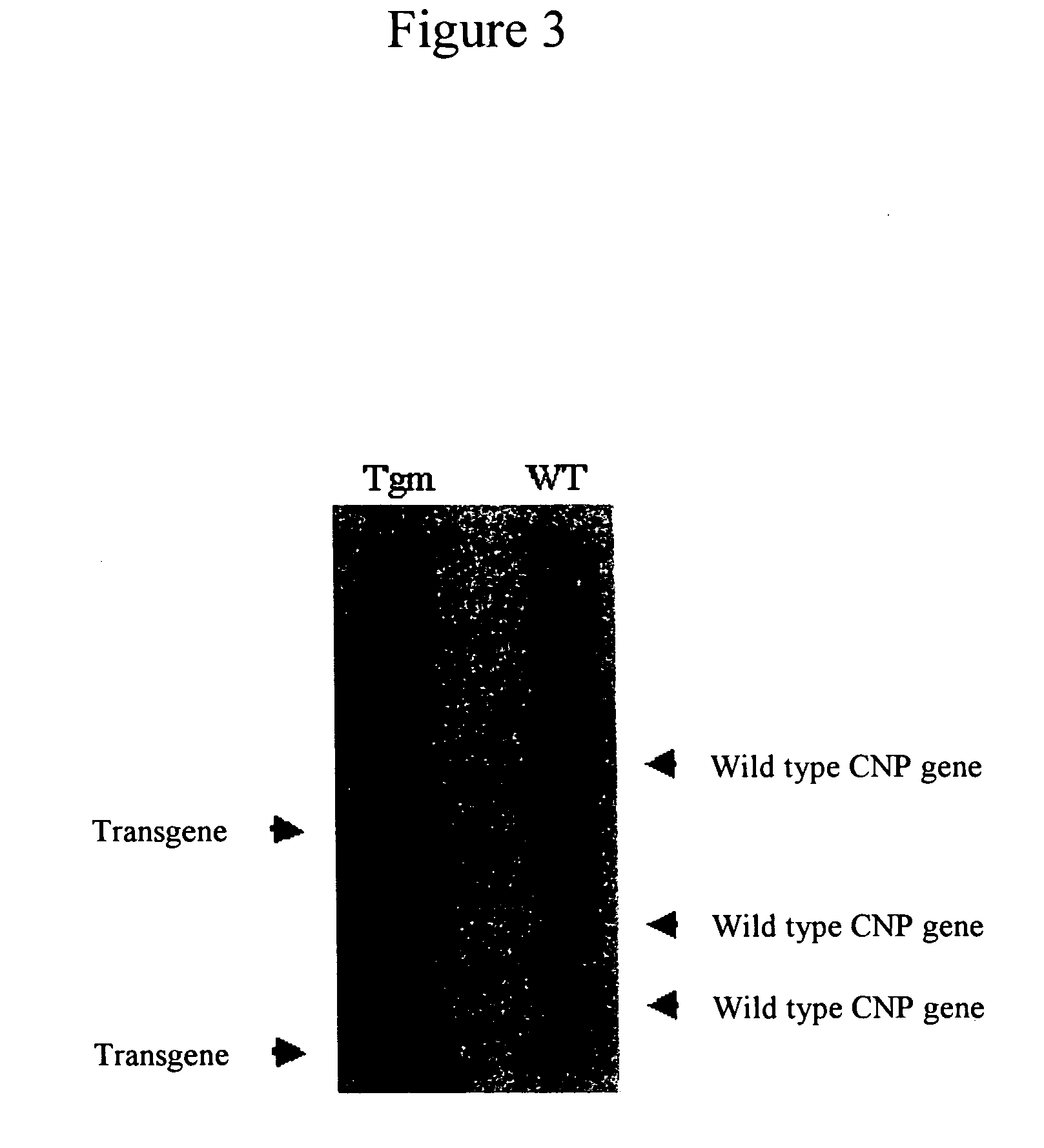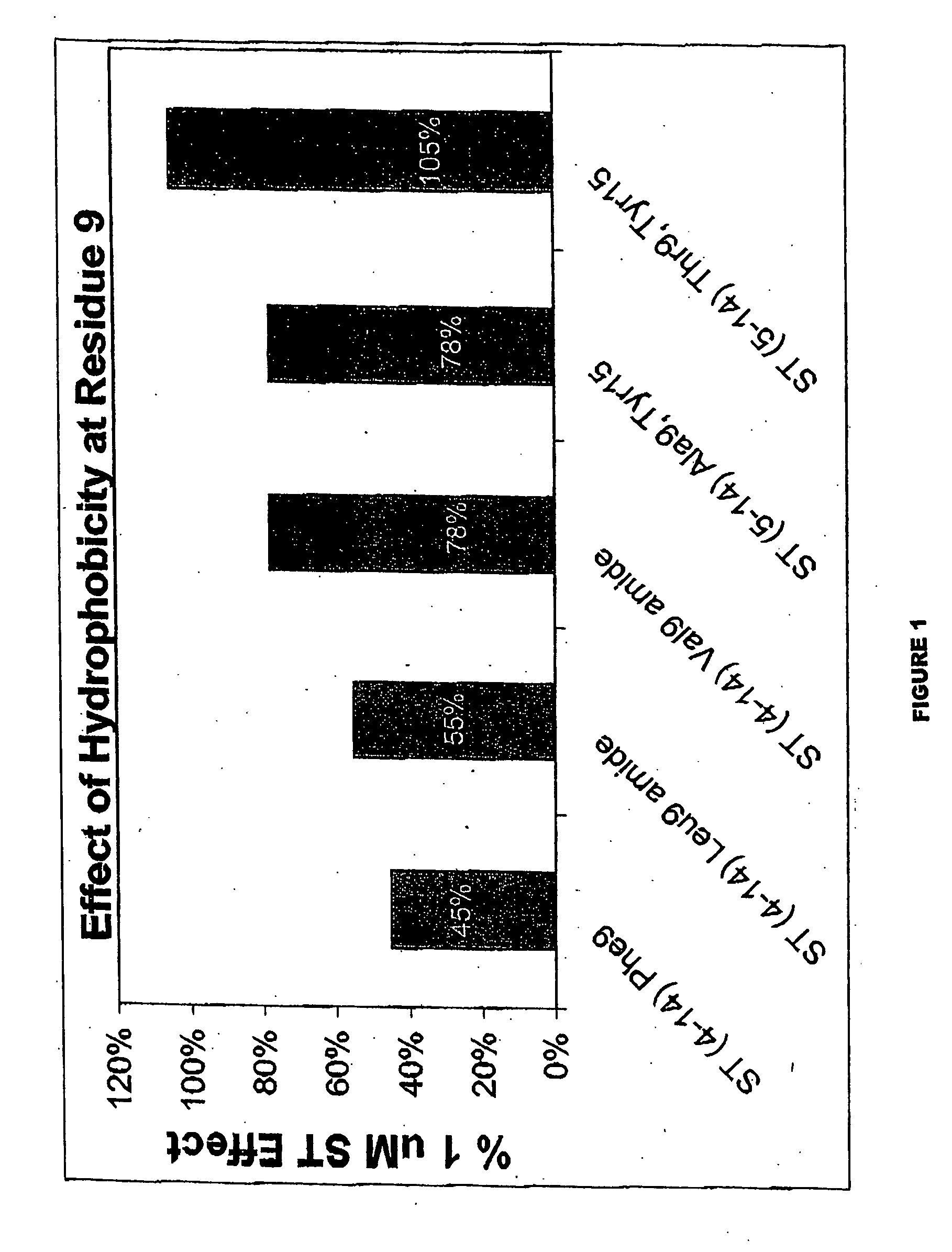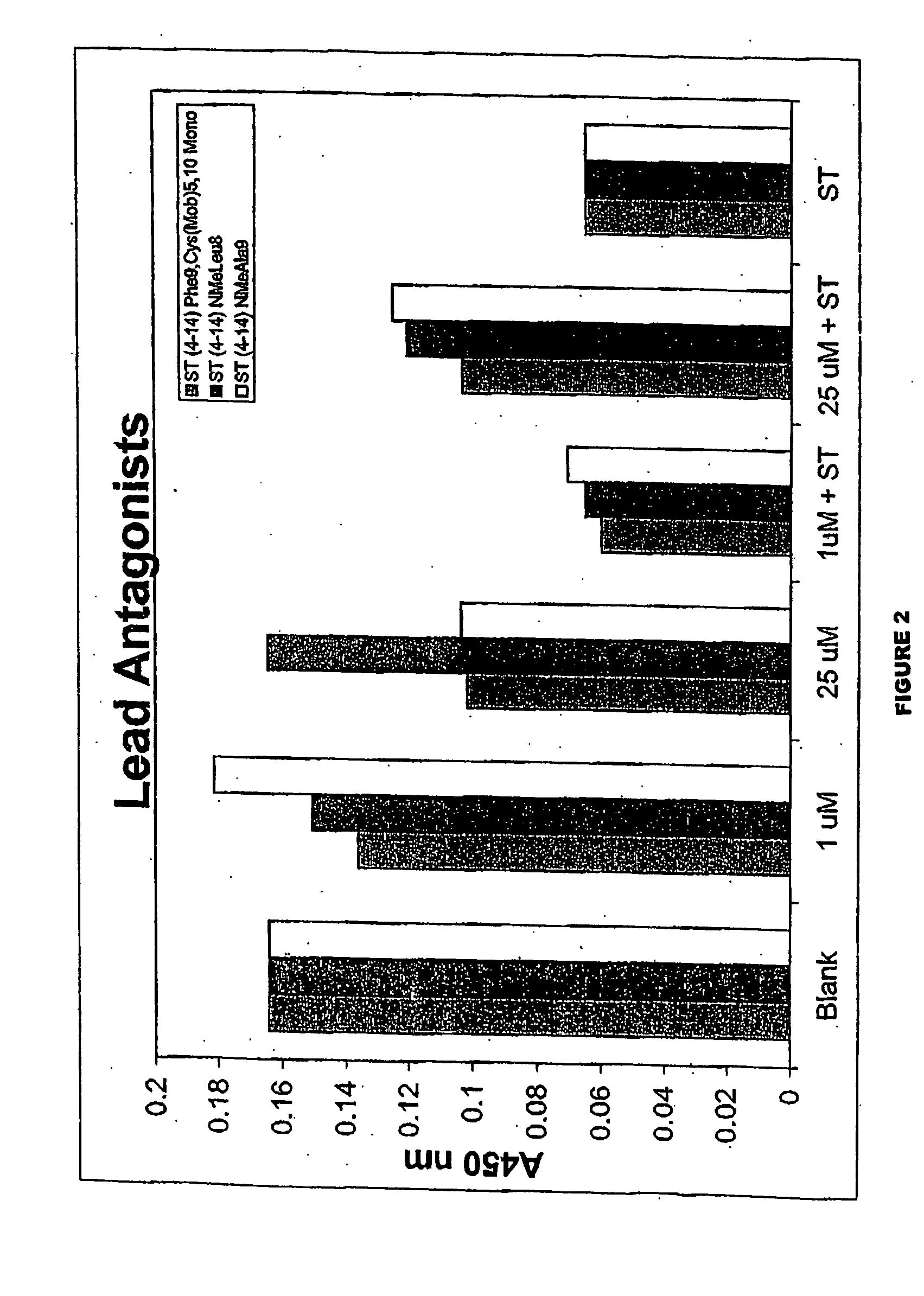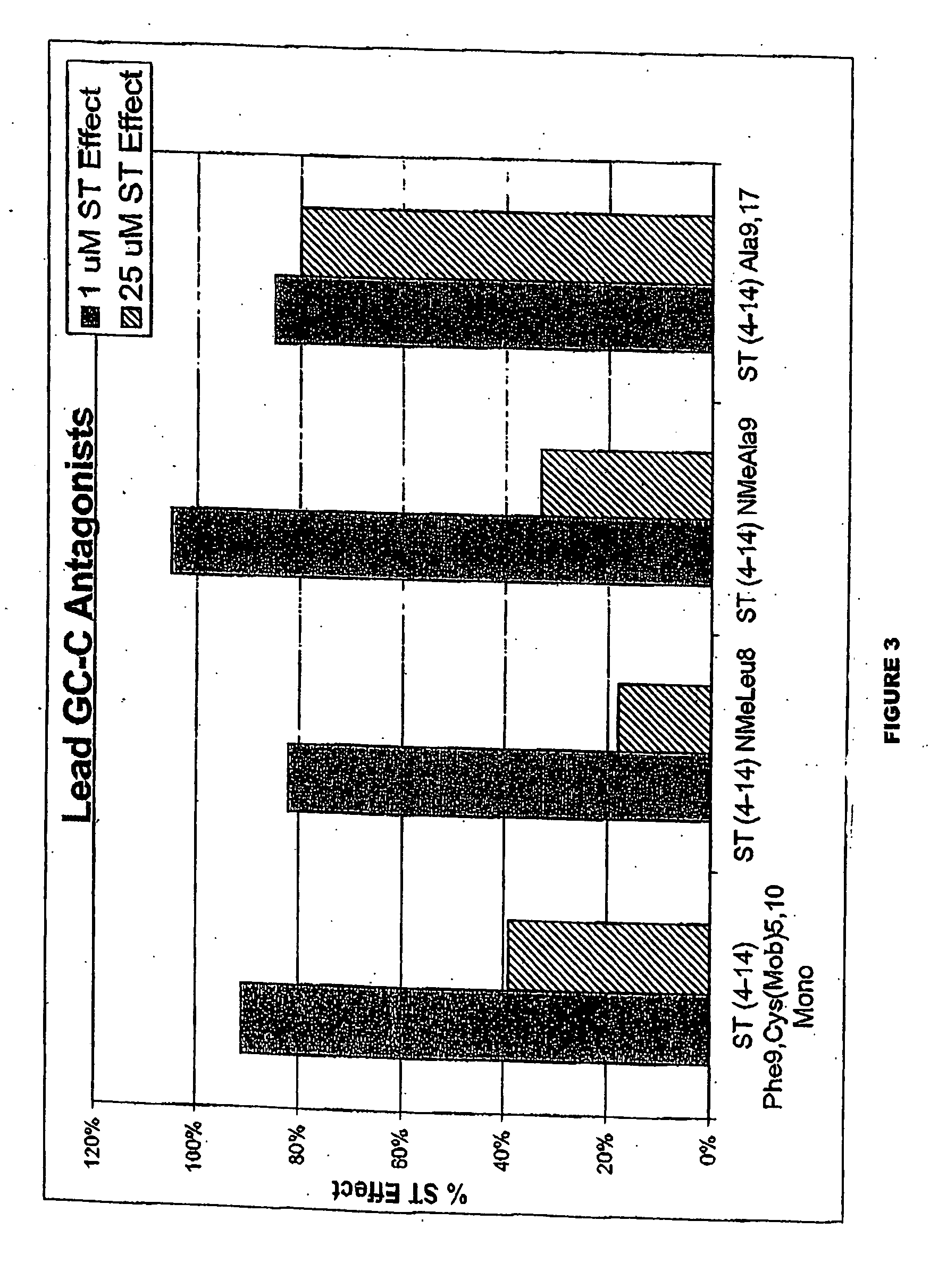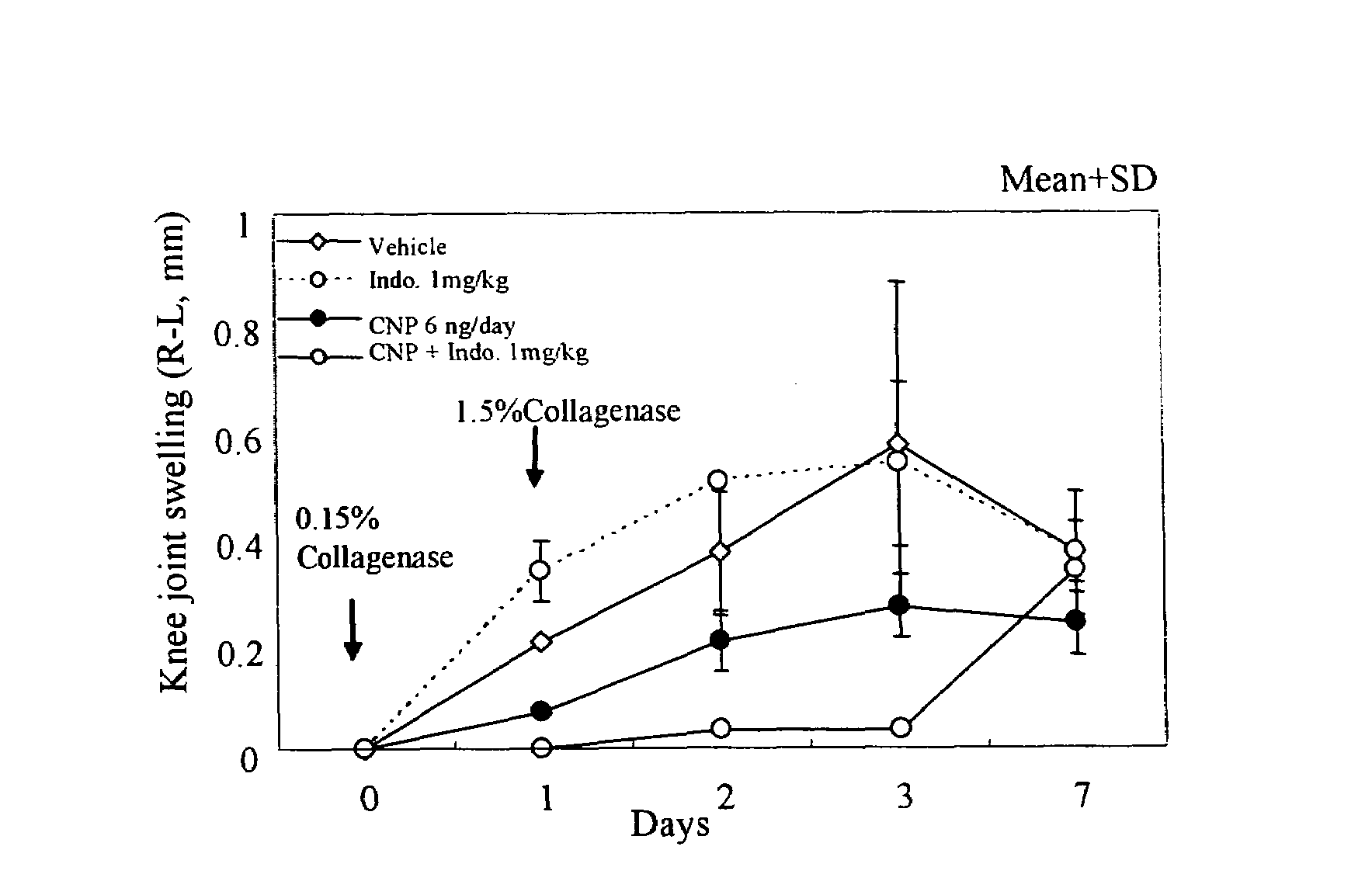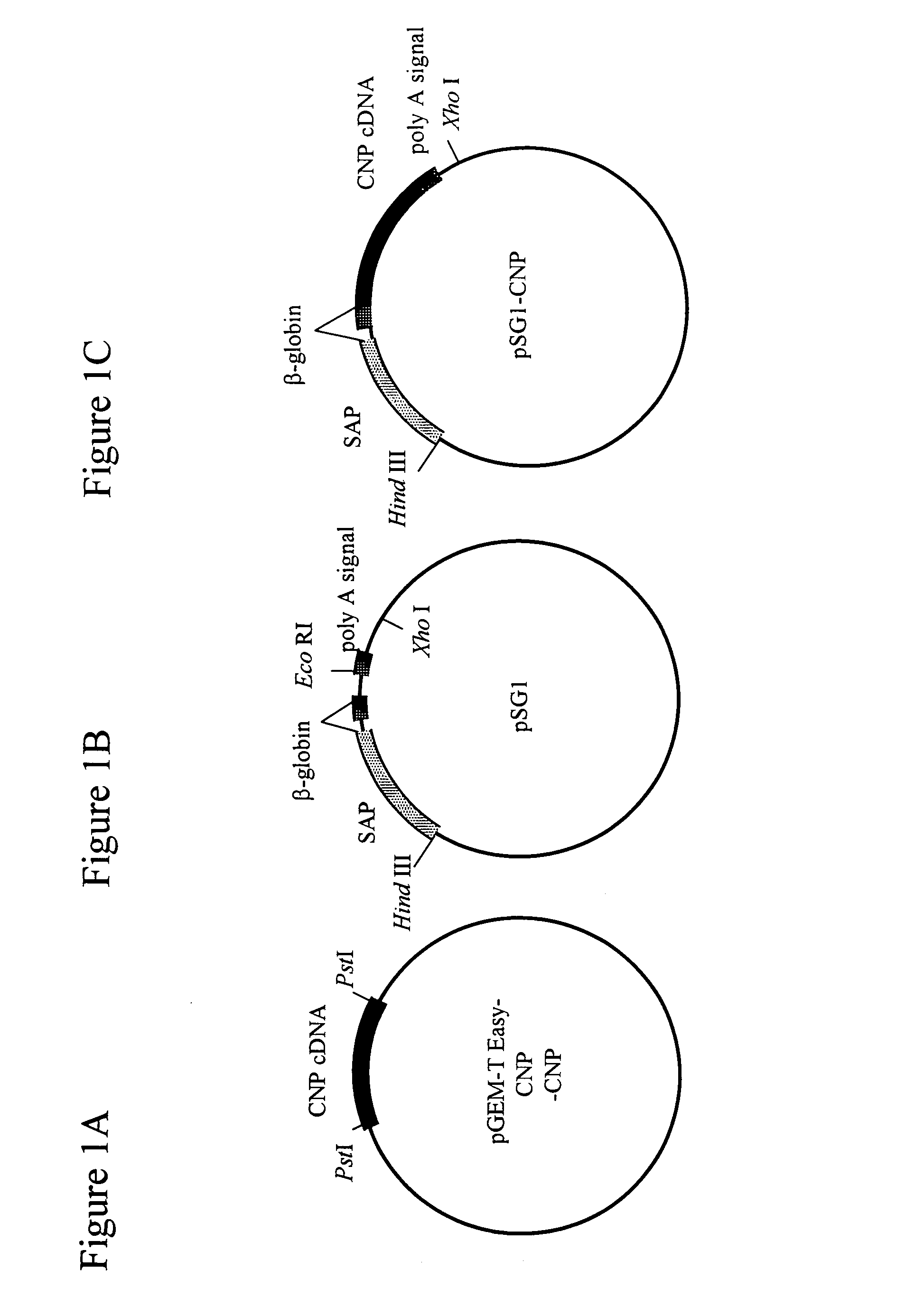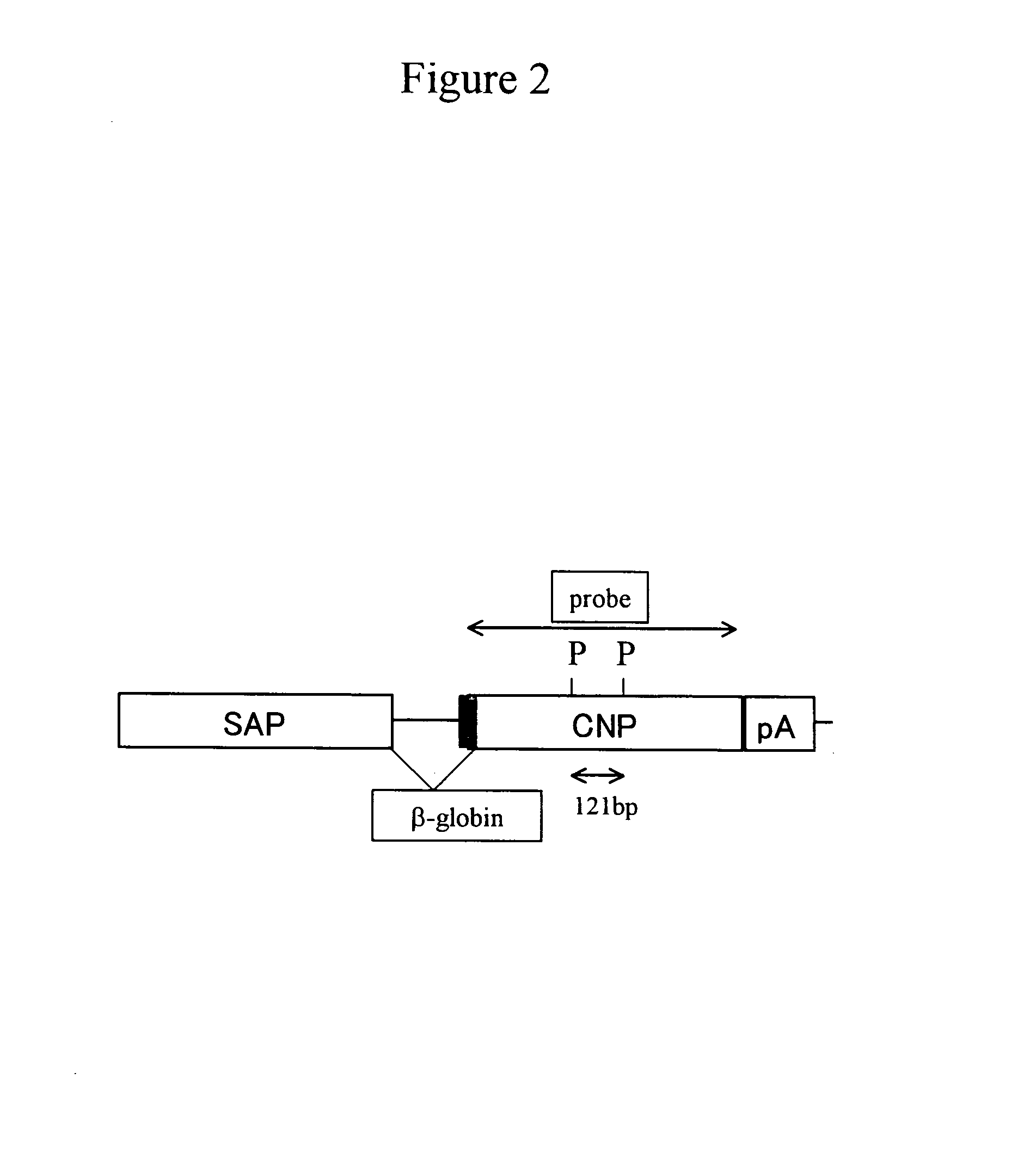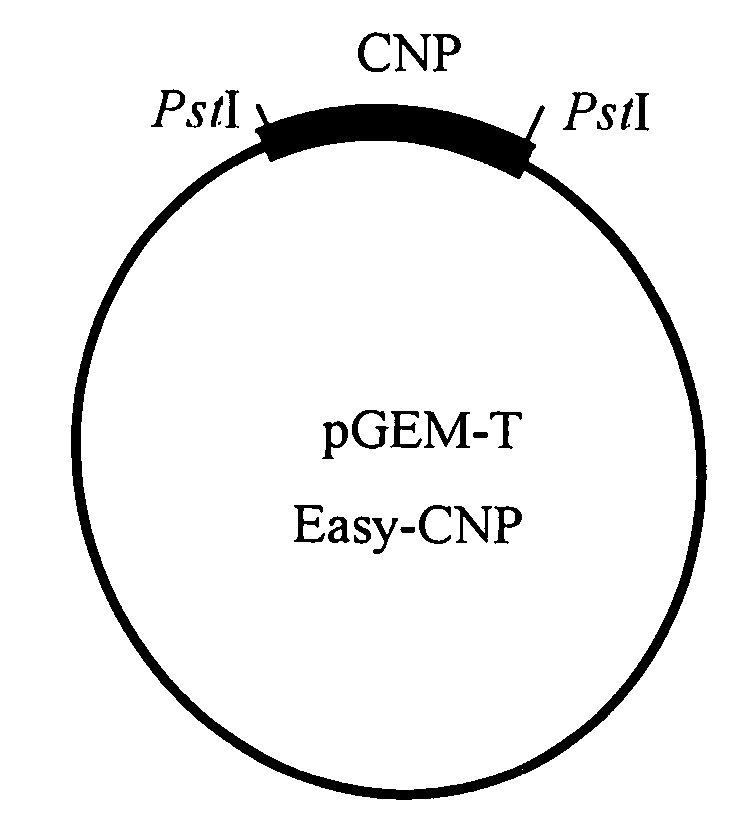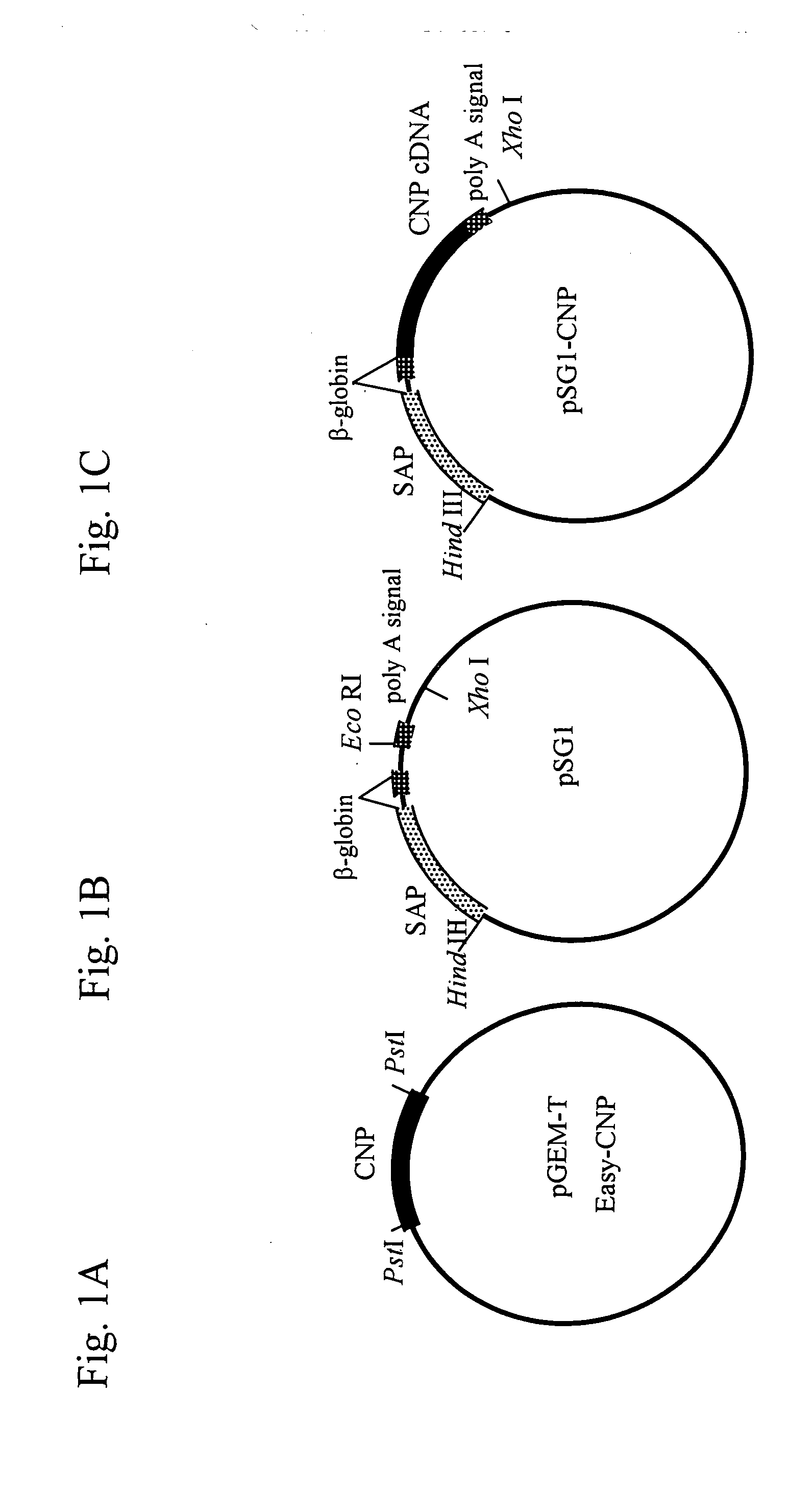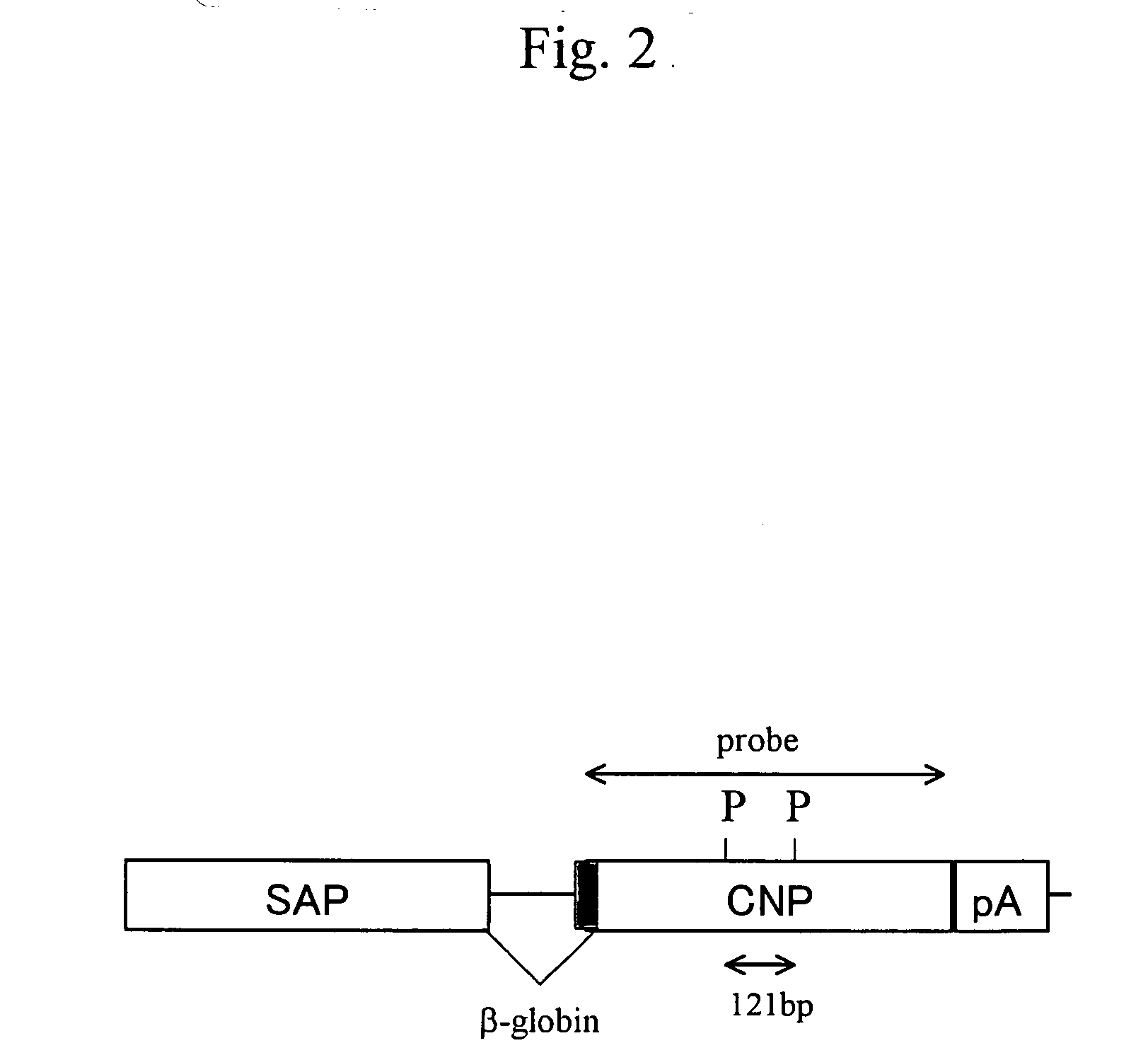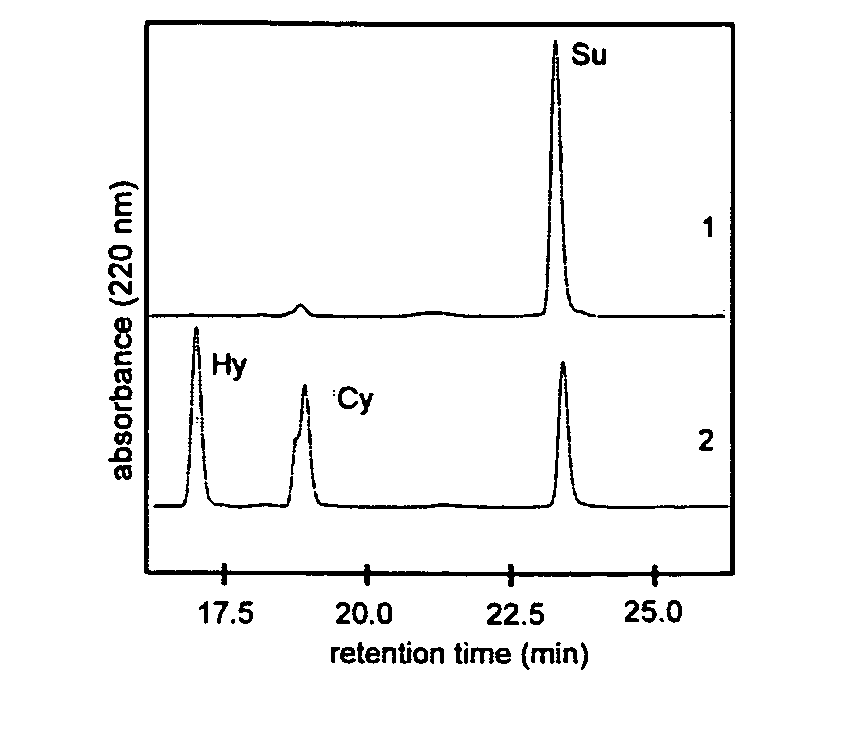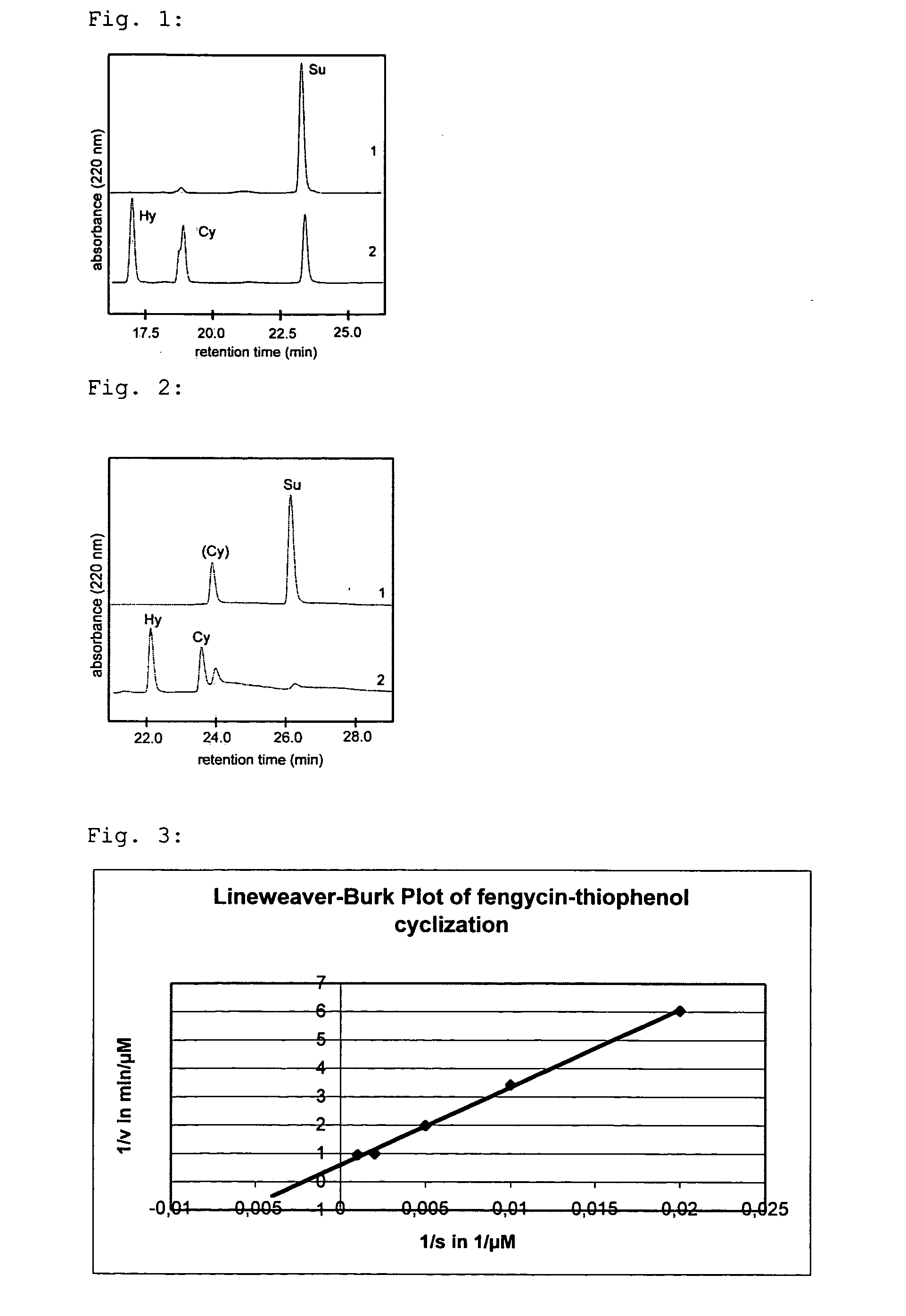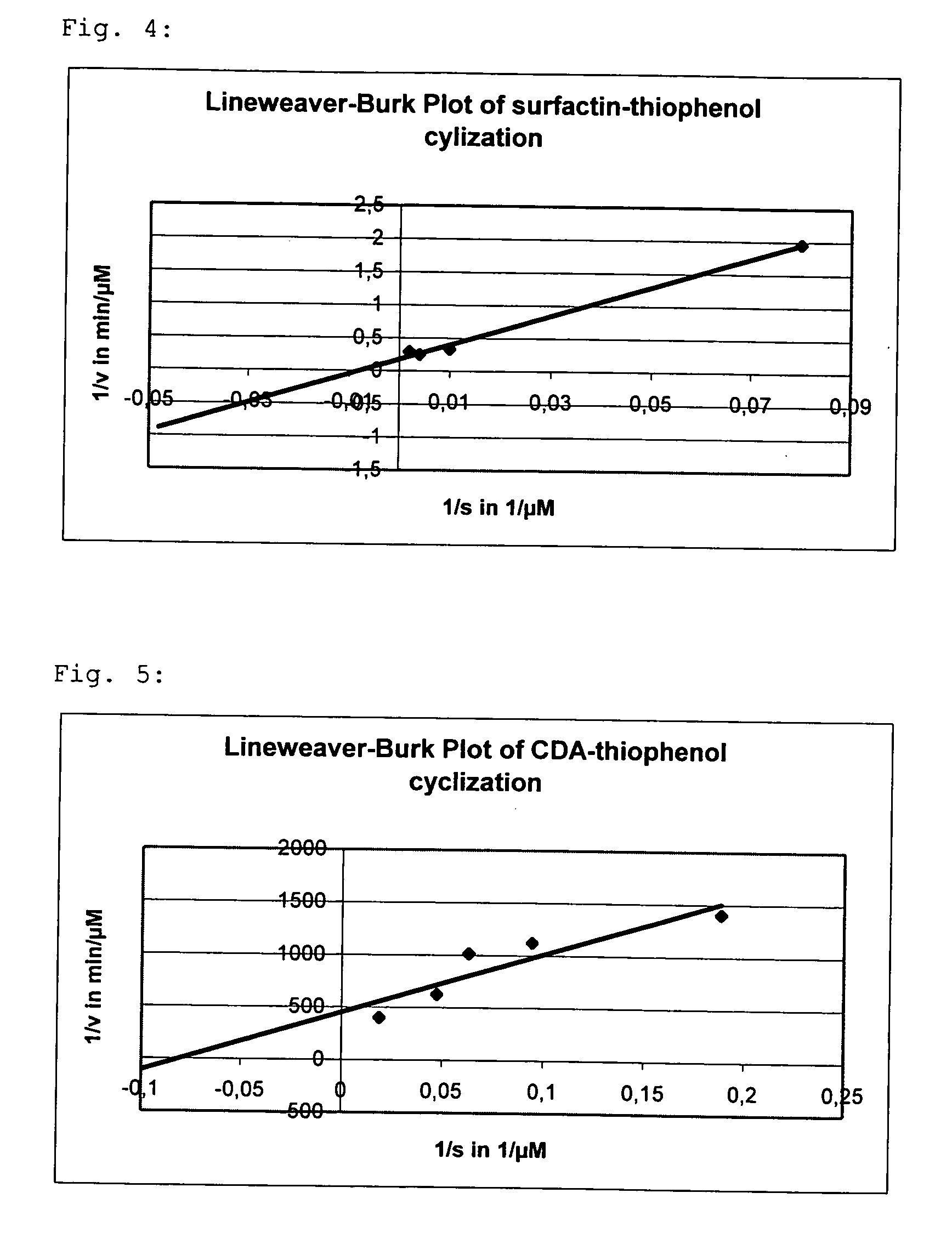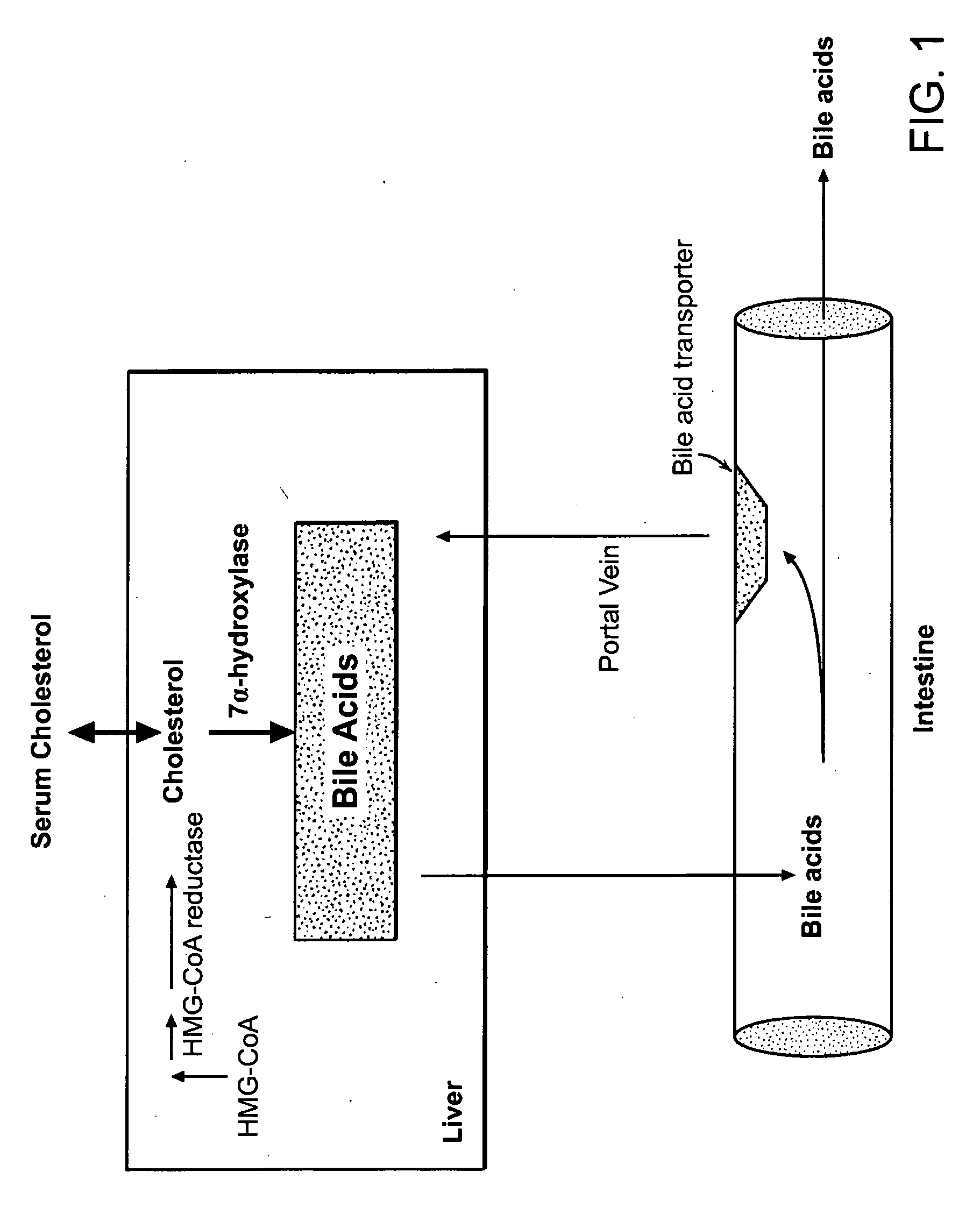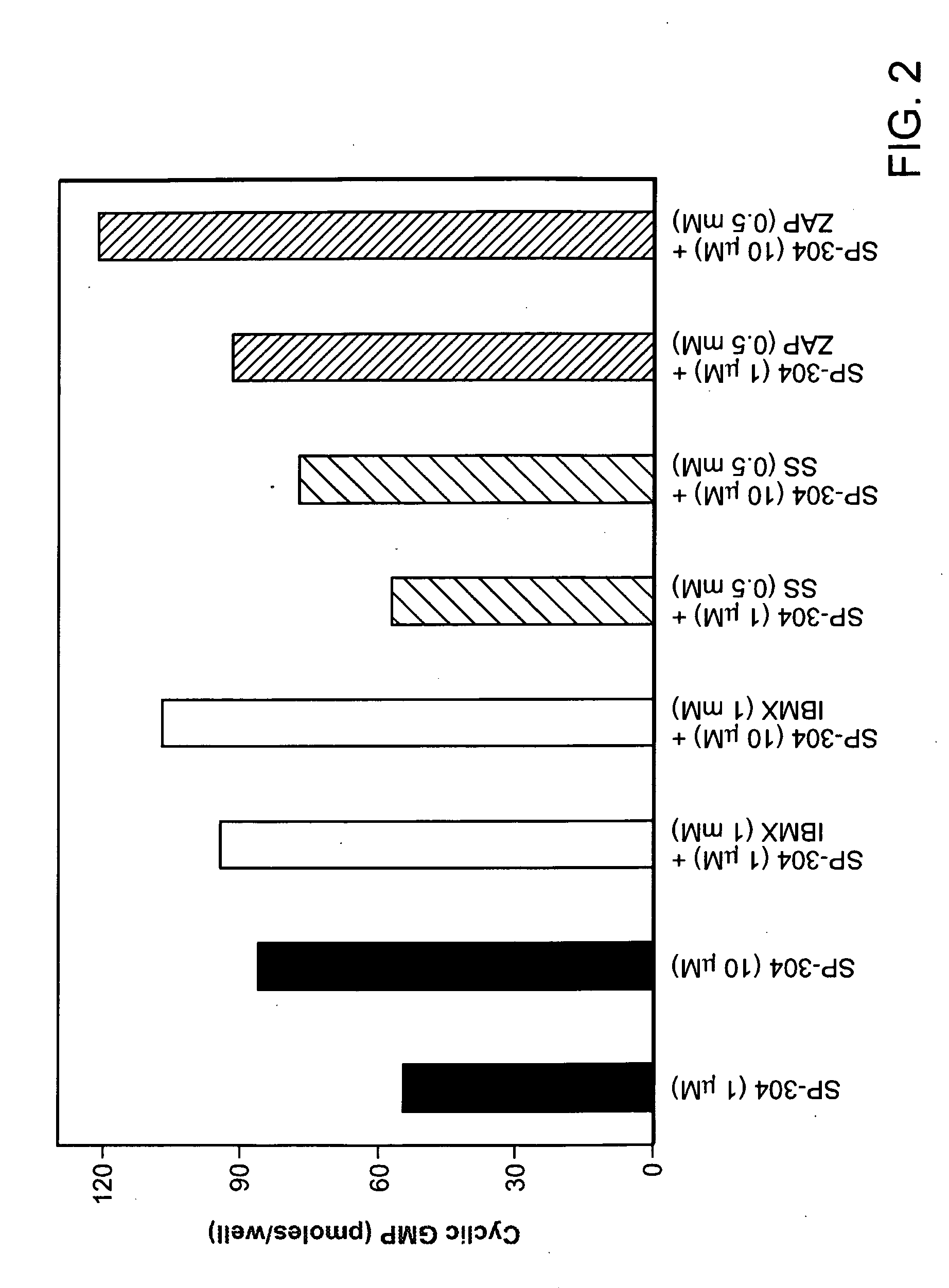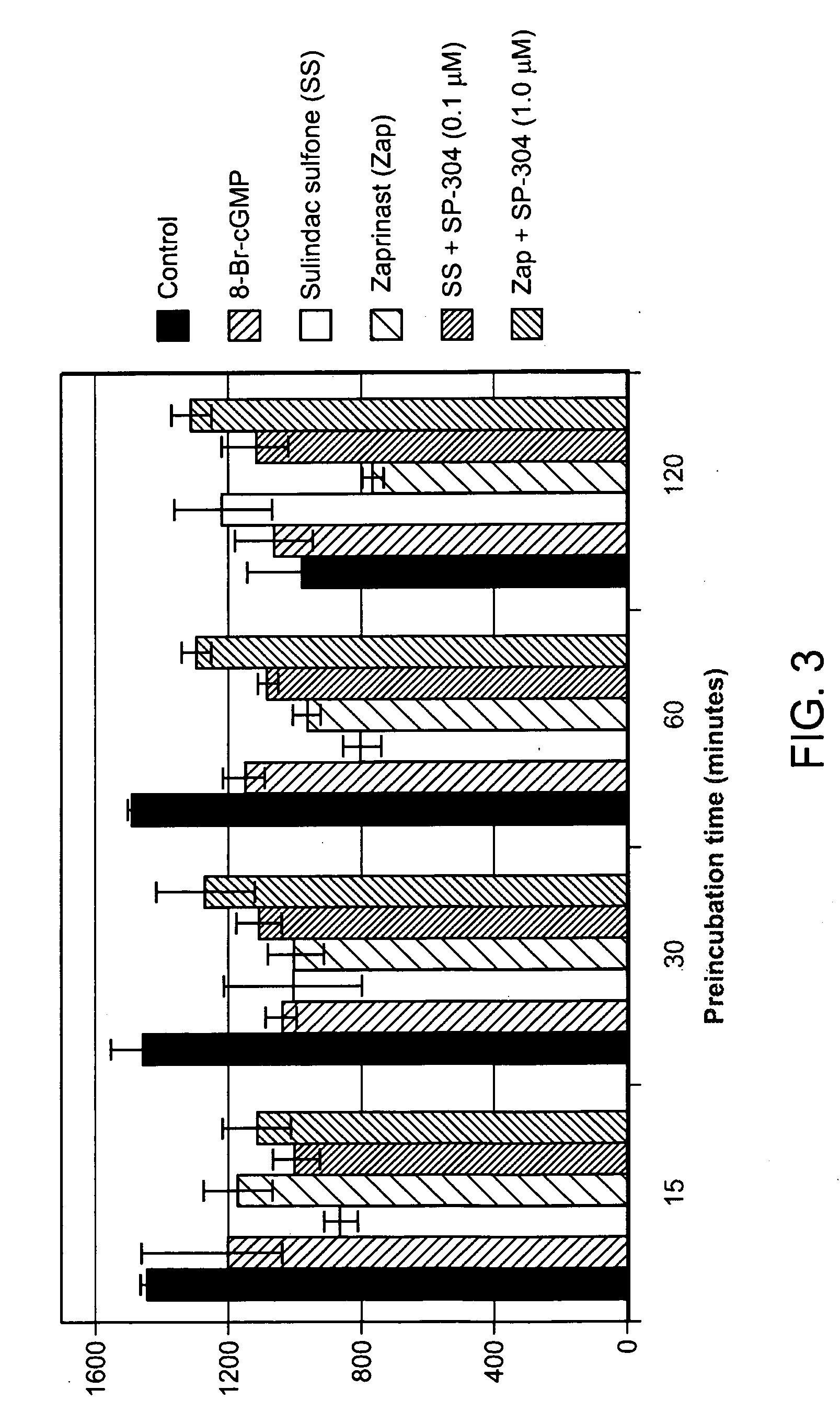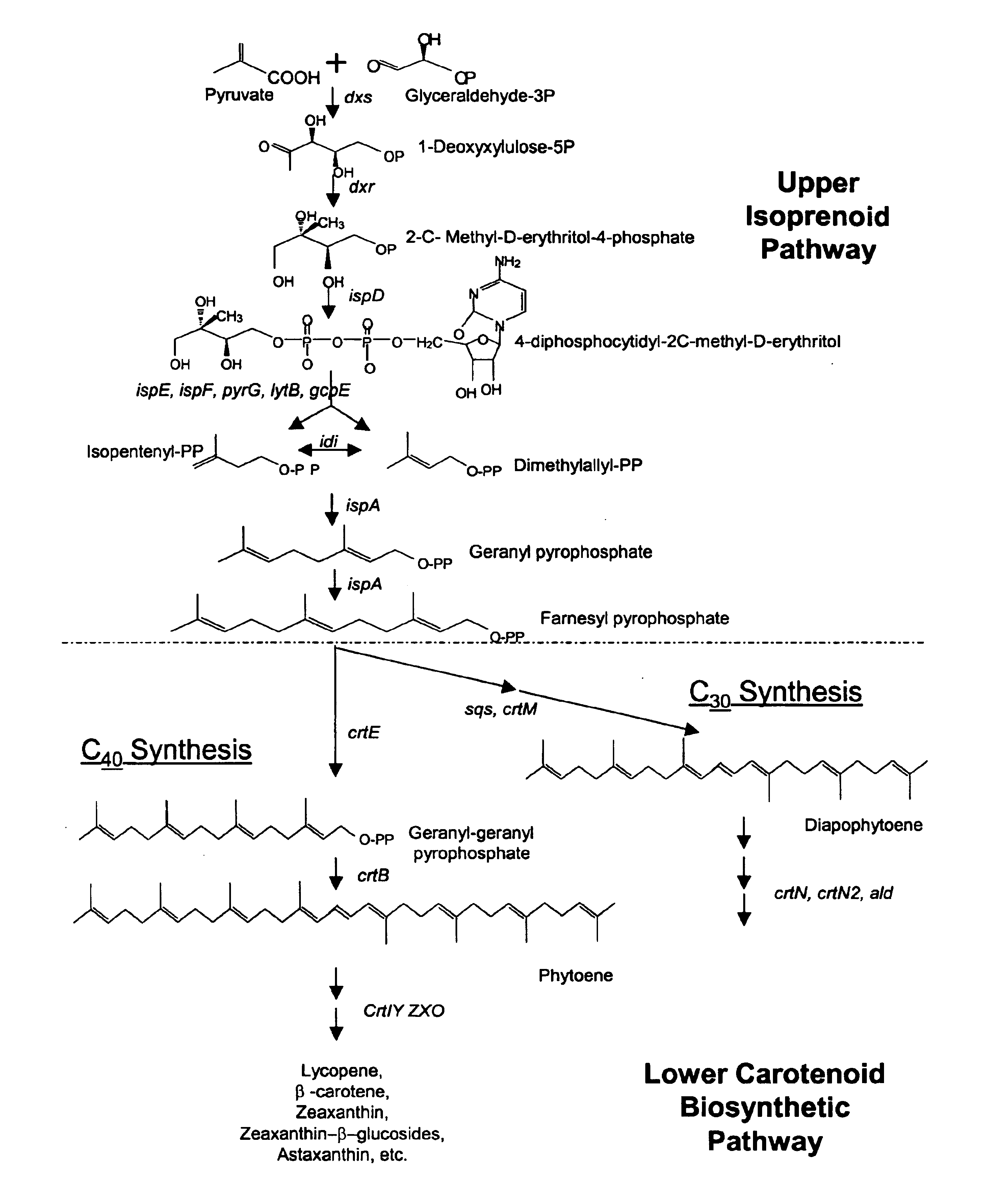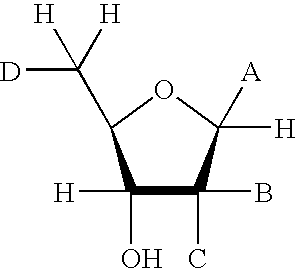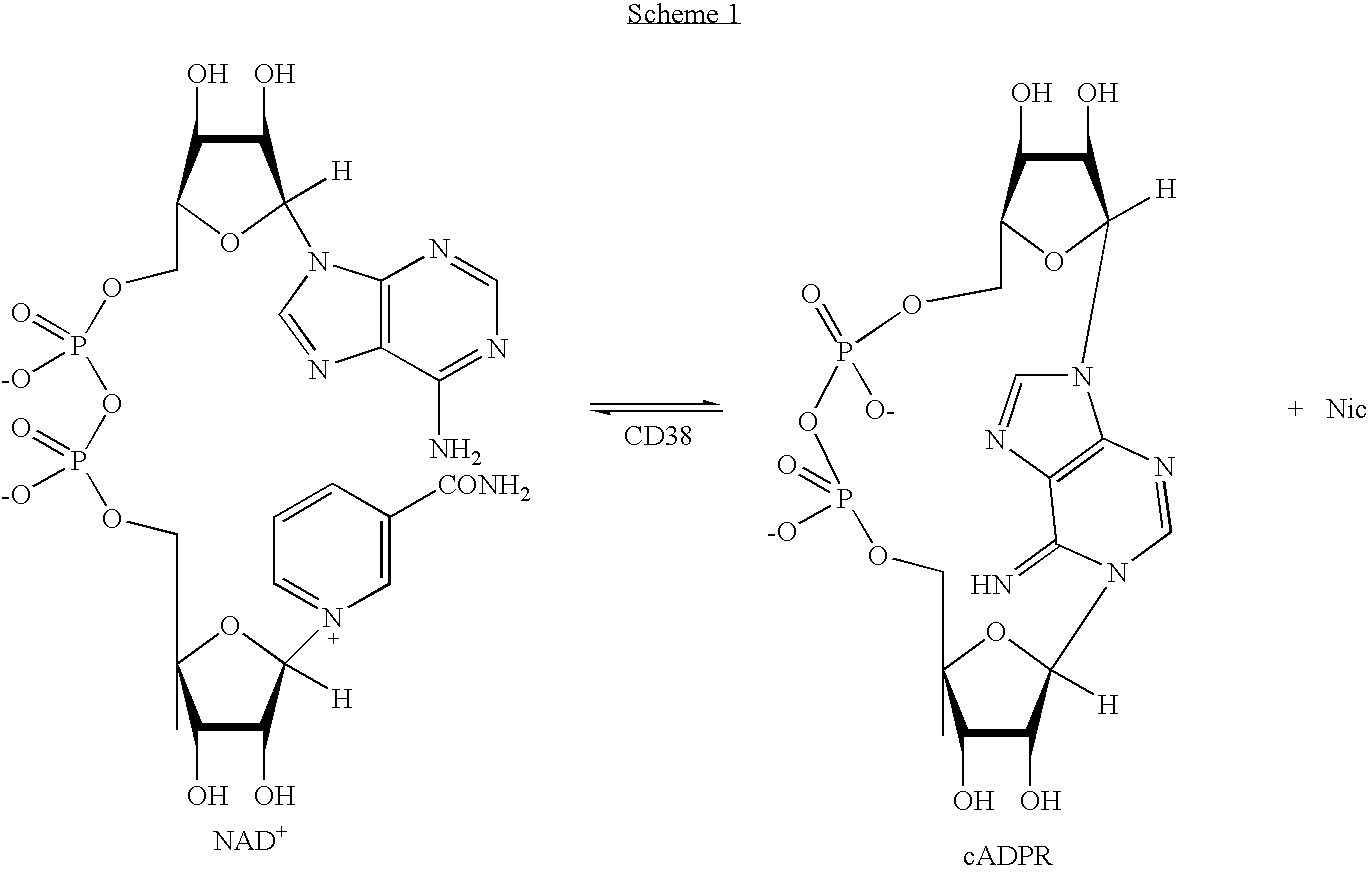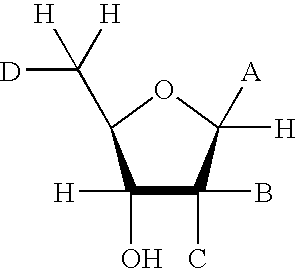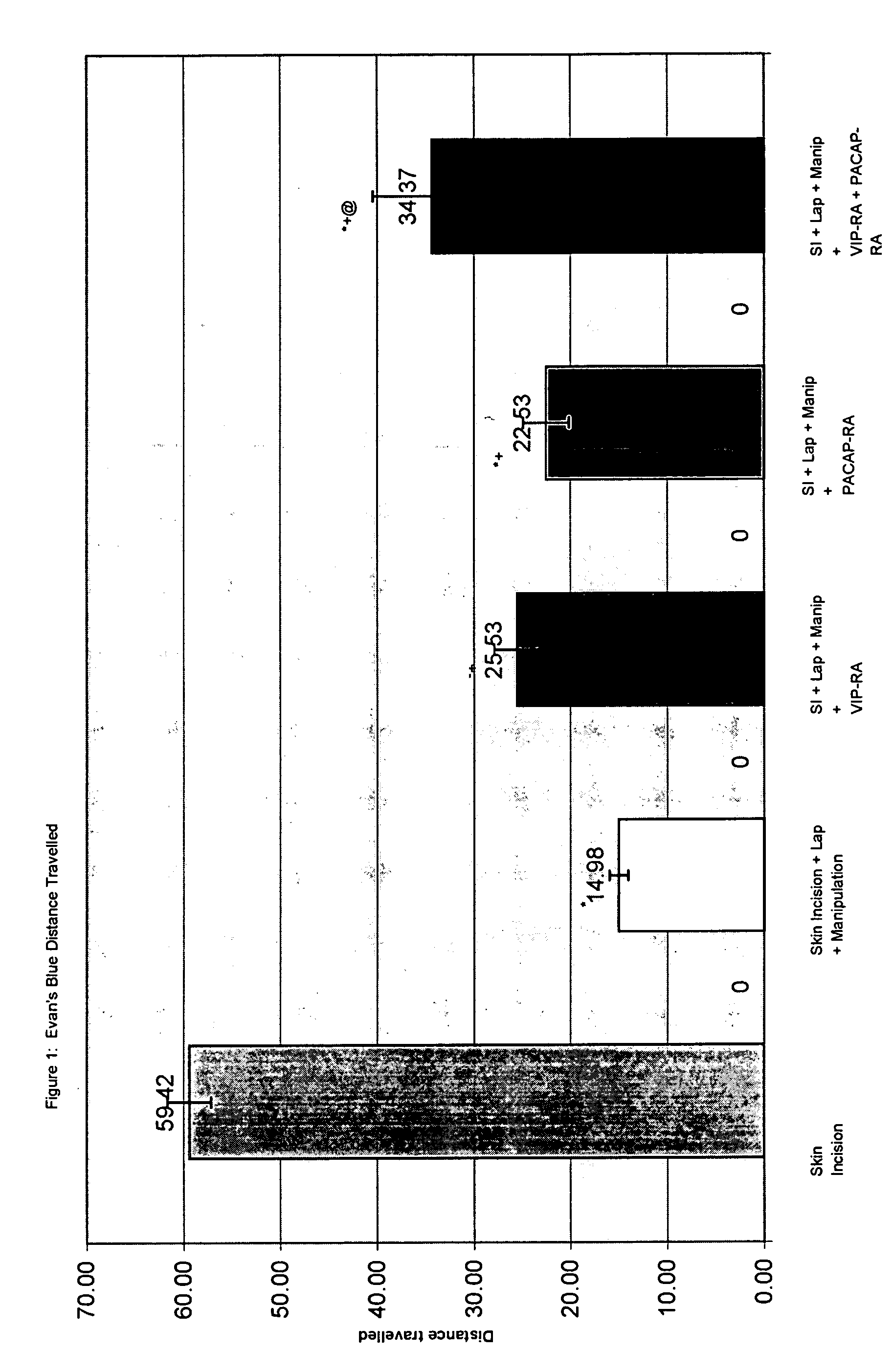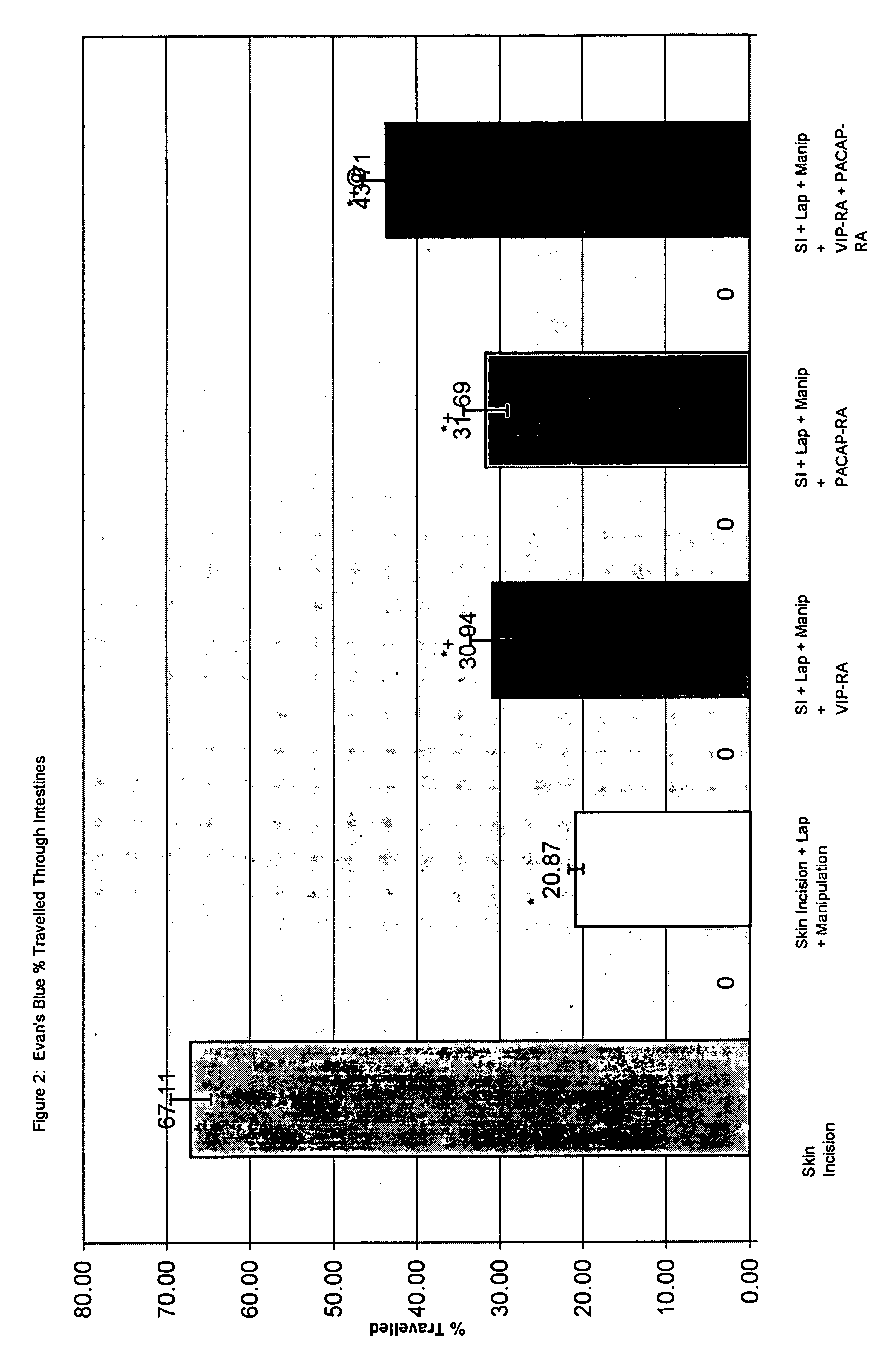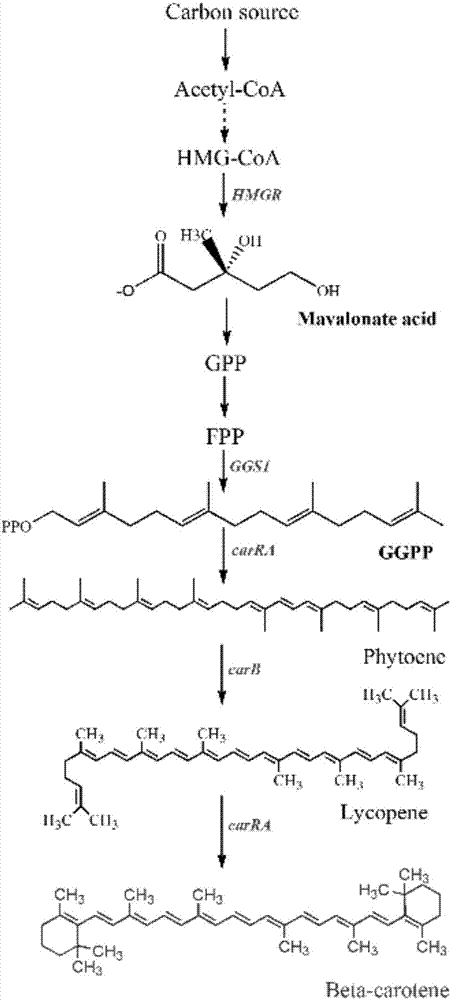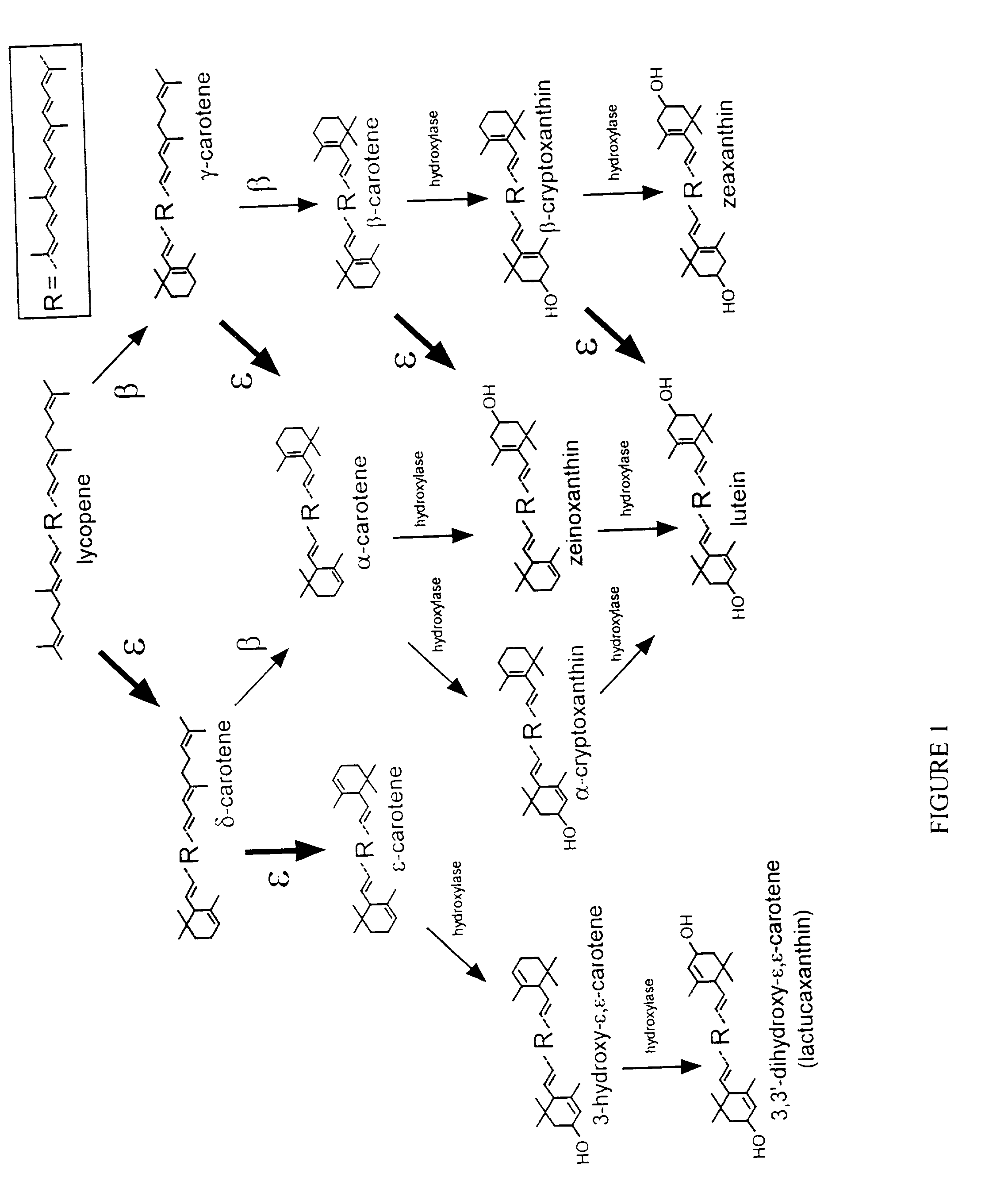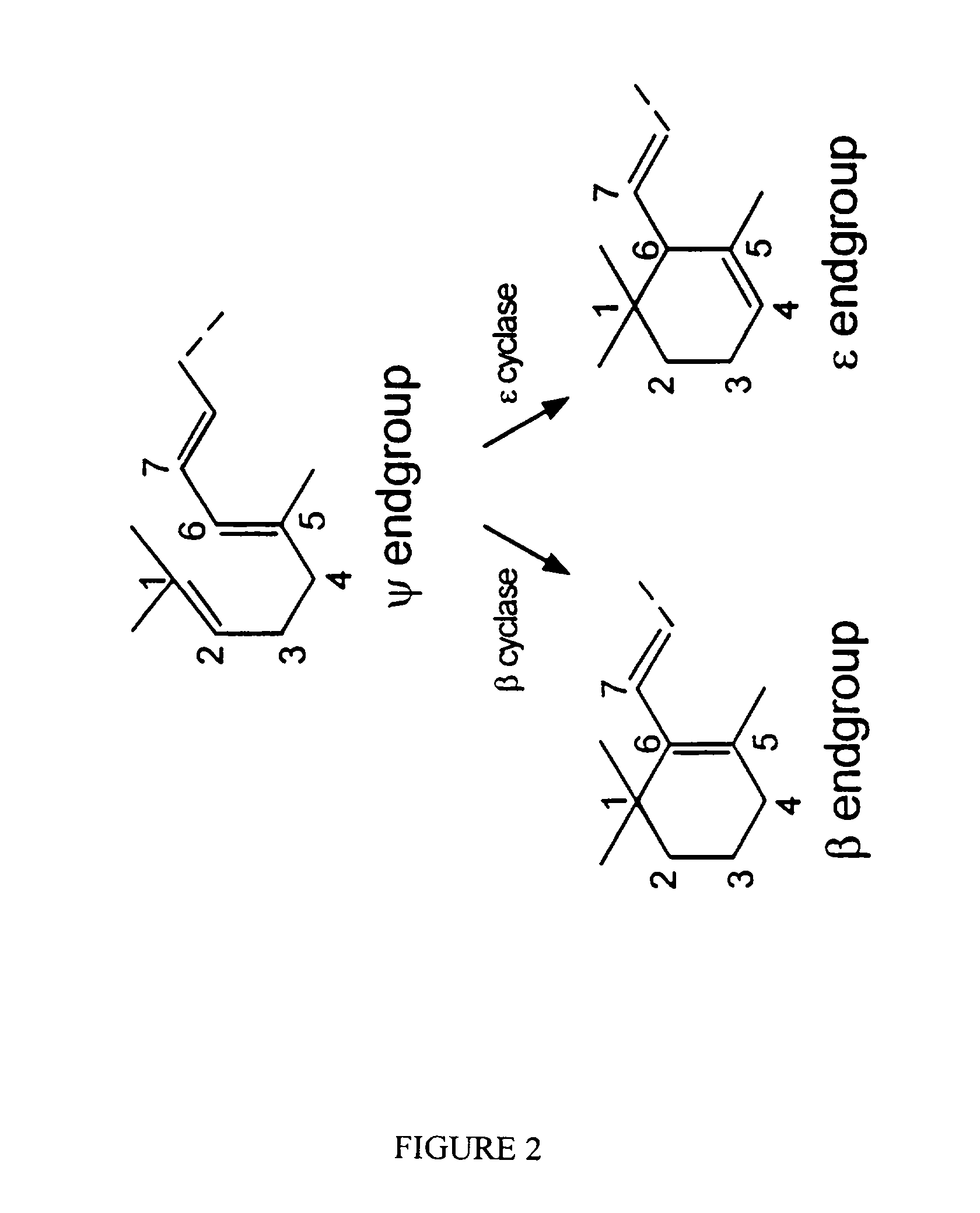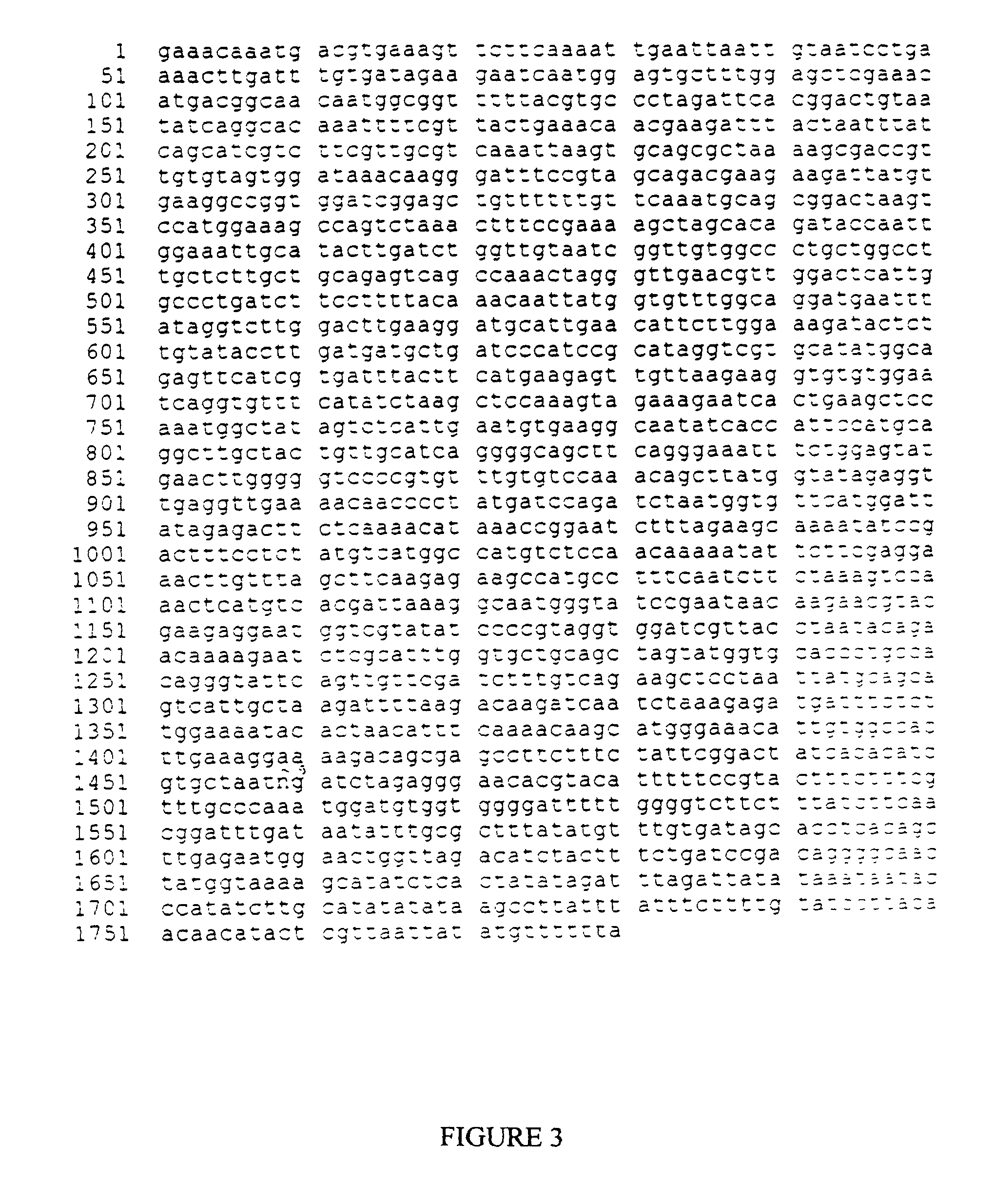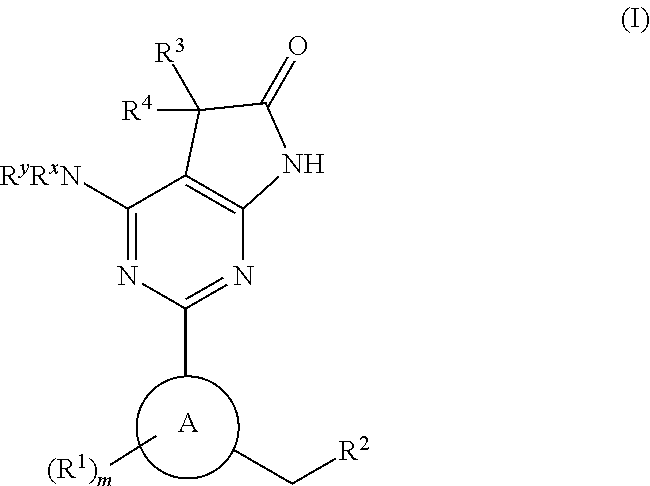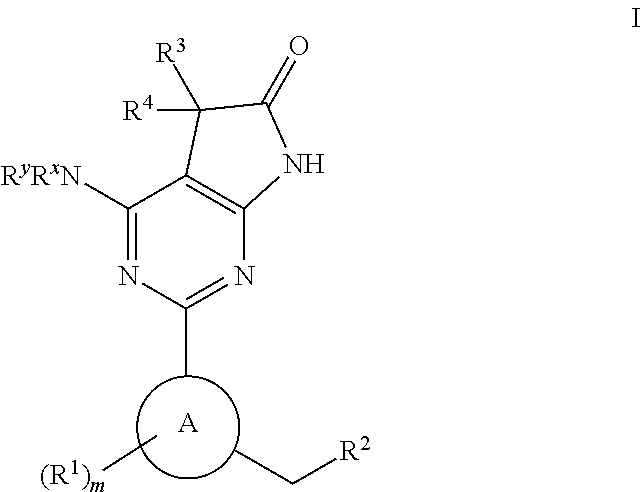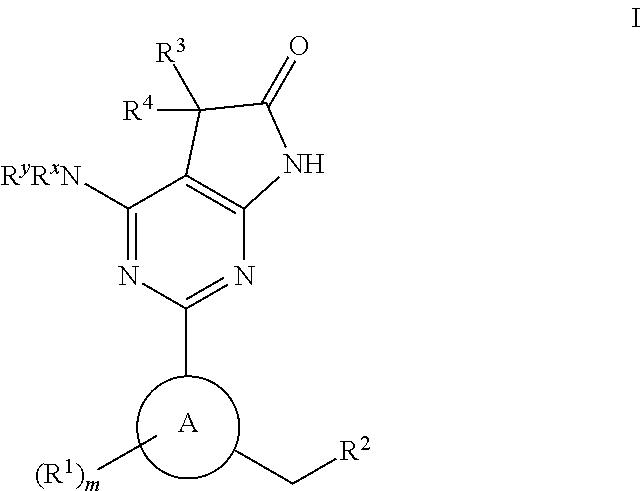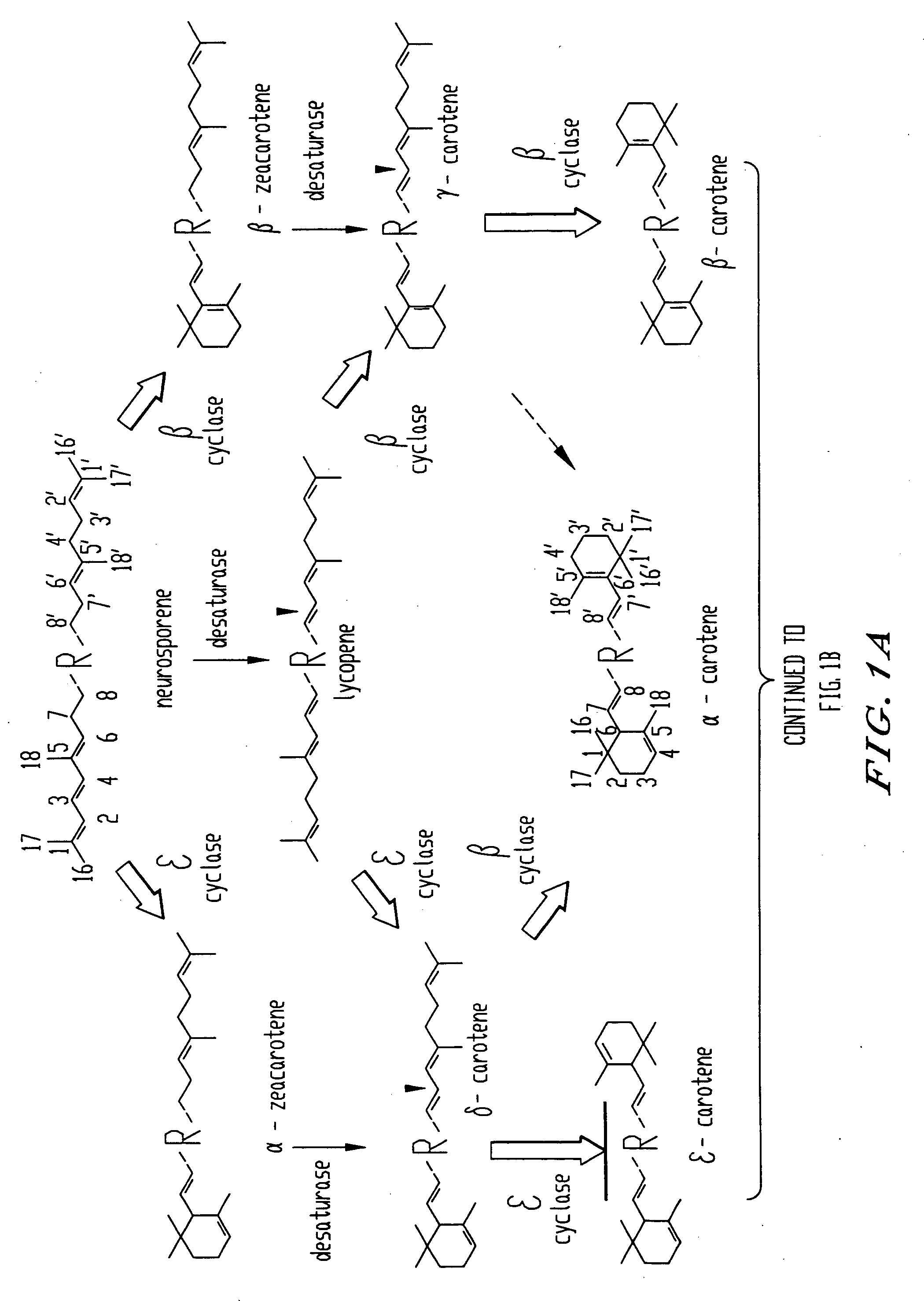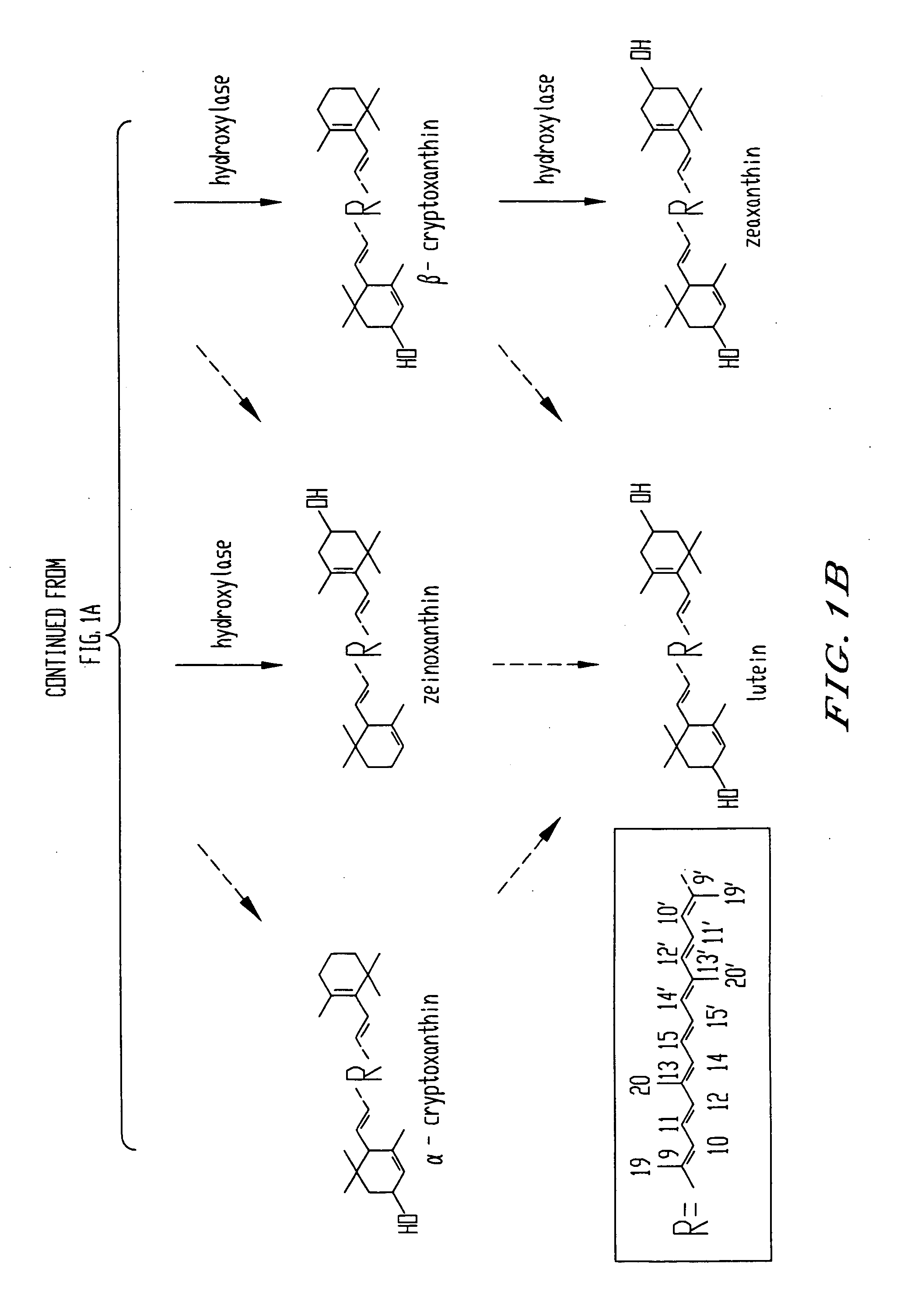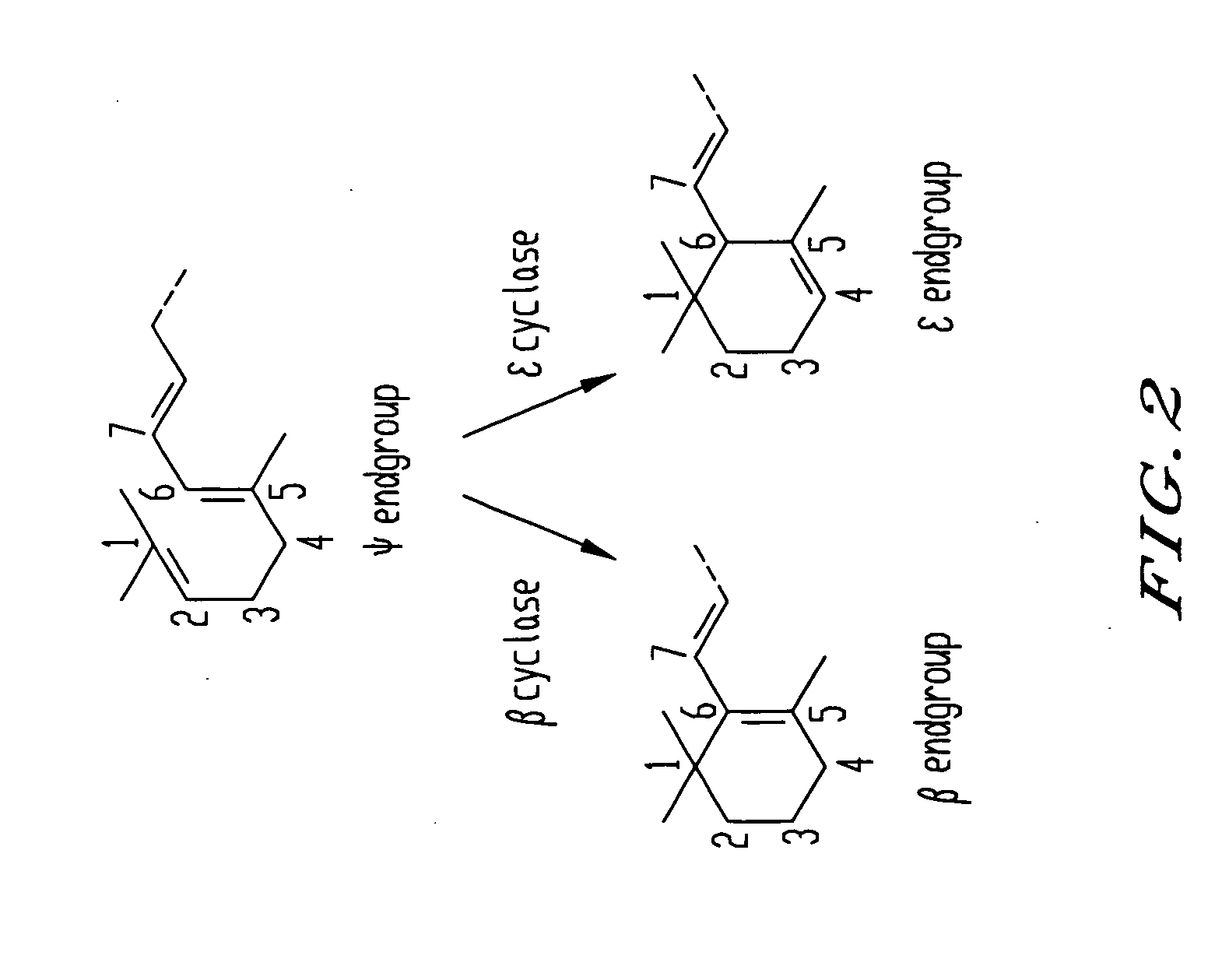Patents
Literature
304 results about "Cyclase" patented technology
Efficacy Topic
Property
Owner
Technical Advancement
Application Domain
Technology Topic
Technology Field Word
Patent Country/Region
Patent Type
Patent Status
Application Year
Inventor
A cyclase is an enzyme, almost always a lyase, that catalyzes a chemical reaction to form a cyclic compound.
Soluble Guanylate Cyclase Activators
This inventions relates to compounds having the structure Formula Iand pharmaceutically acceptable salts thereof which are soluble guanylate cyclase activators. The compounds are useful for treatment or prevention of cardiovascular diseases, endothelial dysfunction, diastolic dysfunction, atherosclerosis, hypertension, pulmonary hypertension, angina pectoris, thromboses, restenosis, myocardial infarction, strokes, cardiac insufficiency, pulmonary hypertonia, erectile dysfunction, asthma bronchiale, chronic kidney insufficiency, diabetes, or cirrhosis of the liver.
Owner:MERCK SHARP & DOHME LLC
Soluble guanylate cyclase activators
A compound having the structureuseful for treatment or prevention of cardiovascular diseases, endothelial dysfunction, diastolic dysfunction, atherosclerosis, hypertension, angina pectoris, thromboses, restenoses, myocardial infarction, strokes, cardiac insufficiency, pulmonary hypertonia, erectile dysfunction, asthma bronchiale, chronic kidney insufficiency, diabetes, or cirrhosis of the liver in a human or animal patient.
Owner:MERCK SHARP & DOHME CORP
Soluble guanylate cyclase activators
A compound of Formula (I): or a pharmaceutically acceptable salt thereof, are capable of modulating the body's production of cyclic guanosine monophosphate (“cGMP”) and are generally suitable for the therapy and prophylaxis of diseases which are associated with a disturbed cGMP balance. The invention furthermore relates to processes for preparing compounds of Formula I, or a pharmaceutically acceptable salt thereof, for their use in the therapy and prophylaxis of the abovementioned diseases and for preparing pharmaceuticals for this purpose, and to pharmaceutical preparations which comprise compounds of Formula (I) or a pharmaceutically acceptable salt thereof.
Owner:MERCK SHARP & DOHME LLC
Soluble guanylate cyclase activators
A compound having the structureuseful for treatment or prevention of cardiovascular diseases, endothelial dysfunction, diastolic dysfunction, atherosclerosis, hypertension, angina pectoris, thromboses, restenoses, myocardial infarction, strokes, cardiac insufficiency, pulmonary hypertonia, erectile dysfunction, asthma bronchiale, chronic kidney insufficiency, diabetes, or cirrhosis of the liver in a human or animal patient.
Owner:MERCK SHARP & DOHME LLC
Soluble guanylate cyclase activators
The invention relates to compounds having the structure of Formula (I) and pharmaceutically acceptable salts thereof, which are soluble guanylate cyclase activators. The compounds are capable of modulating the body's production of cyclic guanosine monophosphate (“cGMP”) and are generally suitable for the therapy and prophylaxis of diseases which are associated with a disturbed cGMP balance. The compounds are useful for treatment or prevention of cardiovascular diseases, endothelial dysfunction, diastolic dysfunction, atherosclerosis, hypertension, pulmonary hypertension, angina pectoris, thromboses, restenosis, myocardial infarction, strokes, cardiac insufficiency, pulmonary hypertonia, erectile dysfunction, asthma bronchiale, chronic kidney insufficiency, diabetes, or cirrhosis of the liver.
Owner:MERCK SHARP & DOHME LLC
Method and compositions for the treatment of gastrointestinal disorders
ActiveUS20060094658A1Reduce accumulationIncrease gastrointestinal motilityPeptide/protein ingredientsMetabolism disorderGastroparesisInflammatory Bowel Diseases
Compositions and related methods for treating IBS and other gastrointestinal disorders and conditions (e.g., gastrointestinal motility disorders, functional gastrointestinal disorders, gastroesophageal reflux disease (GERD), duodenogastric reflux, Crohn's disease, ulcerative colitis, inflammatory bowel disease, functional heartburn, dyspepsia (including functional dyspepsia or nonulcer dyspepsia), gastroparesis, chronic intestinal pseudo-obstruction (or colonic pseudoobstruction), and disorders and conditions associated with constipation, e.g., constipation associated with use of opiate pain killers, post-surgical constipation, and constipation associated with neuropathic disorders as well as other conditions and disorders are described. The compositions feature peptides that activate the guanylate cyclase C (GC-C) receptor.
Owner:IRONWOOD PHARMA
Methods of use of inhibitors of phosphodiesterases and modulators of nitric oxide, reactive oxygen species, and metalloproteinases in the treatment of peyronie's disease, arteriosclerosis and other fibrotic diseases
ActiveUS20050085486A1Increasing NO levelReduce expressionBiocidePharmaceutical delivery mechanismFemale Sexual Arousal DisorderCyclase
The present methods and compositions are of use for treatment of conditions involving fibrosis, such as Peyronie's disease plaque, penile corporal fibrosis, penile veno-occlusive dysfunction, Dupuytren's disease nodules, vaginal fibrosis, clitoral fibrosis, female sexual arousal disorder, abnormal wound healing, keloid formation, general fibrosis of the kidney, bladder, prostate, skin, liver, lung, heart, intestines or any other localized or generalized fibrotic condition, vascular fibrosis, arterial intima hyperplasia, atherosclerosis, arteriosclerosis, restenosis, cardiac hypertrophy, hypertension or any condition characterized by excessive fibroblast or smooth muscle cell proliferation or deposition of collagen and extracellular matrix in the blood vessels and / or heart. In certain embodiments, the compositions may comprise a PDE-4 inhibitor, a PDE-5 inhibitor, a compound that elevates cGMP and / or PKG, a stimulator of guanylyl cyclase and / or PKG, a combination of a compound that elevates cGMP, PKG or NO with an antioxidant that decreases ROS, or a compound that increases MMP activity.
Owner:LOS ANGELES BIOMEDICAL RES INST AT HARBOR UCLA MEDICAL CENT
Soluble guanylate cyclase activators
This inventions relates to compounds having the structure Formula Iand pharmaceutically acceptable salts thereof which are soluble guanylate cyclase activators. The compounds are useful for treatment or prevention of cardiovascular diseases, endothelial dysfunction, diastolic dysfunction, atherosclerosis, hypertension, pulmonary hypertension, angina pectoris, thromboses, restenosis, myocardial infarction, strokes, cardiac insufficiency, pulmonary hypertonia, erectile dysfunction, asthma bronchiale, chronic kidney insufficiency, diabetes, or cirrhosis of the liver.
Owner:MERCK SHARP & DOHME LLC
Agonists of guanylate cyclase useful for the treatment of gastrointestinal disorders, inflammation, cancer and other disorders
ActiveUS20090048175A1Maintain good propertiesIncrease resistanceOrganic active ingredientsSenses disorderPhosphodiesteraseGastrointestinal cancer
The invention provides novel guanylate cyclase-C agonist peptides and their use in the treatment of human diseases including gastrointestinal disorders, inflammation or cancer (e.g., a gastrointestinal cancer). The peptides can be administered either alone or in combination with an inhibitor of cGMP-dependent phosphodiesterase. The gastrointestinal disorder may be classified as either irritable bowel syndrome, constipation, or excessive acidity etc. The gastrointestinal disease may be classified as either inflammatory bowel disease or other GI condition, including Crohn's disease and ulcerative colitis, and cancer.
Owner:BAUSCH HEALTH IRELAND LTD
Soluble guanylate cyclase activators
This inventions relates to compounds having the structure Formula I and pharmaceutically acceptable salts thereof which are soluble guanylate cyclase activators. The compounds are useful for treatment or prevention of cardiovascular diseases, endothelial dysfunction, diastolic dysfunction, atherosclerosis, hypertension, pulmonary hypertension, angina pectoris, thromboses, restenosis, myocardial infarction, strokes, cardiac insufficiency, pulmonary hypertonia, erectile dysfunction, asthma bronchiale, chronic kidney insufficiency, diabetes, or cirrhosis of the liver.
Owner:MERCK SHARP & DOHME LLC
Inhibitors of glutaminyl cyclase
The present invention relates to novel inhibitors of glutaminyl cyclase and combinations thereof for the treatment of neuronal disorders, especially Alzheimer's disease, Down Syndrome, Parkinson disease, Chorea Huntington, pathogenic psychotic conditions, schizophrenia, impaired food intake, sleep-wakefulness, impaired homeostatic regulation of energy metabolism, impaired autonomic function, impaired hormonal balance, impaired regulation, body fluids, hypertension, fever, sleep dysregulation, anorexia, anxiety related disorders including depression, seizures including epilepsy, drug withdrawal and alcoholism, neurodegenerative disorders including cognitive dysfunction and dementia.
Owner:VIVORYON THERAPEUTICS NV
Use of effectors of glutaminyl and glutamate cyclases
ActiveUS20070191366A1Stimulate gastrointestinal tractPrevent proliferationBiocideNervous disorderCyclaseMedicine
The present invention provides novel physiological substrates of mammalian glutaminyl cyclase (QC, EC 2.3.2.5), new effectors of QC, methods for screening for such effectors, and the use of such effectors and pharmaceutical compositions comprising such effectors for the treatment of conditions that can be treated by modulation of QC-activity. Preferred compositions additionally comprise inhibitors of DP IV or DP IV-like enzymes for the treatment or alleviation of conditions that can be treated by modulation of QC- and DP IV-activity.
Owner:VIVORYON THERAPEUTICS NV
Methods and compositions for the treatment of gastrointestinal disorders
InactiveUS20070010450A1Increase gastrointestinal motilityReduce inflammationPeptide/protein ingredientsMetabolism disorderIntestinal tract diseasesGastroparesis
Compositions and related methods for treating IBS and other gastrointestinal disorders and conditions (e.g., gastrointestinal motility disorders, functional gastrointestinal disorders, gastroesophageal reflux disease (GERD), duodenogastric reflux, Crohn's disease, ulcerative colitis, inflammatory bowel disease, functional heartburn, dyspepsia (including functional dyspepsia or nonulcer dyspepsia), gastroparesis, chronic intestinal pseudo-obstruction (or colonic pseudoobstruction), and disorders and conditions associated with constipation, e.g., constipation associated with use of opiate pain killers, post-surgical constipation, and constipation associated with neuropathic disorders as well as other conditions and disorders are described. The compositions feature peptides that activate the guanylate cyclase C (GC-C) receptor.
Owner:IRONWOOD PHARMA
Neuronal pain pathway
ActiveUS20060216339A1High activityImprove the level ofNervous disorderDipeptide ingredientsCyclasePhosphorylation
The present invention relates to the discovery of a novel molecular pathway involved in long-term hyperexcitability of sensory neurons, which, in higher animals, is associated with persistent pain. It is based on the discovery that, following injury to an axon of a neuron, an increase in nitric oxide synthase activity results in increased nitric oxide production, which, in turn, activates guanylyl cyclase, thereby increasing levels of cGMP. Increased cGMP results in activation of protein kinase G (“PKG”), which then is retrogradely transported along the axon to the neuron cell body, where it phosphorylates MAPKerk.
Owner:THE TRUSTEES OF COLUMBIA UNIV IN THE CITY OF NEW YORK
Cyclic di-amp induction of type i interferon
InactiveUS20120164107A1Increase secretionDecrease c-di-AMP phosphodiesterase activityBiocideBacteriaCyclaseProtein composition
Methods of modulating type-I interferon production in a cell are provided. Aspects of the methods include modulating cytosolic cyclic di-adenosine monophosphate (c-di-AMP) activity in the cell in a manner sufficient to modulate type-I interferon production in the cell. Additional aspects of the invention include c-di-AMP activity modulatory compositions, e.g., c-di-AMP, mutant Listeria bacteria, cyclase and / or phosphodiesterase nucleic acid or protein compositions, etc. The subject methods and compositions find use in a variety of applications, including therapeutic applications.
Owner:RGT UNIV OF CALIFORNIA
Theurapeutic or prophyiactic agent for arthritis
ActiveUS20070197434A1Slow changeIncrease the number ofAntibacterial agentsAntimycoticsCyclaseArthritis therapy
This invention provides a new therapeutic or prophylactic agent for arthritis such as osteoarthritis. Specifically, it provides a therapeutic or prophylactic agent for arthritis such as osteoarthritis, or an agent for promoting the growth of articular chondrocyte, comprising a guanyl cyclase B (GC-B) activator as an active ingredient; or a method for inhibiting arthritis or for promoting the growth of articular chondrocyte by activating GC-B; or a method for screening an agent for promoting the growth of articular chondrocyte or an agent capable of treating arthritis using the GC-B activity as an indication.
Owner:KAZUWA NAKAO +1
Compounds of the inventions of guanylyl cyclase C
InactiveUS20050287067A1Activity can be delayedControllable conversionCompound screeningApoptosis detectionCyclaseMedicine
Owner:THOMAS JEFFERSON UNIV
Agonists of guanylate cyclase useful for the treatment of hypercholesterolemia, atherosclerosis, coronary heart disease, gallstone, obesity and other cardiovascular diseases
ActiveUS20100152118A1Widen the optionsOrganic active ingredientsMetabolism disorderCyclaseCoronary artery disease
This invention also provides a method to prevent, control, and treata lipid metabolism disorder, a billary disorder, cardiovascular disease, obesity or an endocrine disorder by administering at least one agonist of guanalyte cyclase receptor either alone or in combination with a compound typically used to treat the disorder and or with an inhibitor of cGMP-dependent phosphodieasterases.
Owner:BAUSCH HEALTH IRELAND LTD
Method of treating arthritis and promoting growth of articular chondrocytes
ActiveUS7642243B2Increase the number ofReduce degradationAntibacterial agentsAntimycoticsCyclaseArticular chondrocyte
Owner:KAZUWA NAKAO +1
Composition for Increasing Body Height
ActiveUS20080312142A1Increased blood levelsExtend height of bodyCompound screeningApoptosis detectionCyclaseCartilage bone
This invention provides a composition for increasing a body height of a patient with short stature or an individual other than patients with short stature. More specifically, the invention provides: a composition for increasing the body height of an individual comprising a guanyl cyclase B (GC-B) activator as an active ingredient, the composition being to be administered to an individual free from FGFR3 abnormality; a method for increasing the body height of an individual free from FGFR3 abnormality which comprises activating GC-B; a method for screening an agent for increasing the body height of an individual which comprises selecting an agent for increasing the body height using GC-B activity as an indication; and a method for extending a cartilage bone free from FGFR3 abnormality which comprises activating GC-B in an individual.
Owner:KAZUWA NAKAO
Method for the poduction of cyclic molecules
InactiveUS20070184516A1High yieldImprove reaction speedPeptide preparation methodsCyclic peptide ingredientsCyclaseThioester synthesis
The invention at hand describes a method for the cyclization of peptides and proteins in which linear thioesters serve as substrates. The cyclization is catalyzed by thioesterase domains of NRPS or PKS cyclases. The substrates according to the present invention are composed of one linear peptide on which a charge-stabilized aromatic, heteroaromatic or araliphatic leaving group is bound. These substrates lead to higher yields and reaction rates than linear peptides able to be cyclized with methods known so far and, furthermore, allow the cyclization of such peptides which were previously not able to be cyclized.
Owner:ZYRUS BET GMBH & CO PATENTE I KG
Agonists of Guanylate Cyclase Useful for the Treatment of Hypercholesterolemia, Atherosclerosis, Coronary Heart Disease, Gallstone, Obesity and Other Cardiovascular Diseases
This invention also provides a method to prevent, control, and treata lipid metabolism disorder, a biliary disorder, cardiovascular disease, obesity or an endocrine disorder by administering at least one agonist of guanalyte cyclase receptor either alone or in combination with a compound typically used to treat the disorder and or with an inhibitor of cGMP-dependent phosphodieasterases.
Owner:BAUSCH HEALTH IRELAND LTD
Genes encoding carotenoid compounds
A unique carotenogenic biosynthetic gene cluster has been isolated from Panteoa agglomerans strain DC404, wherein the genetic organization of the cluster is crtE-idi-crtY-crtI-crtB-crtZ. The genes contained within this cluster encode geranylgeranyl pyrophosphate (GGPP) synthetase (CrtE), isopentenyl pyrophosphate isomerase (Idi), lycopene cyclase (CrtY), phytoene desaturase (CrtI), phytoene synthase (CrtB), and β-carotene hydroxylase (CrtZ). The gene cluster, genes and their products are useful for the conversion of farnesyl pyrophosphate to carotenoids. Vectors containing those DNA segments, host cells containing the vectors and methods for producing those enzymes by recombinant DNA technology in transformed host organisms are disclosed.
Owner:EI DU PONT DE NEMOURS & CO
Inhibitors of ADP-ribosyl transferases, cyclases, and hydrolases
The present invention provides compounds having the formula: wherein A is a nitrogen-, oxygen-, or sulfur-linked aryl, alkyl, cyclic, or heterocyclic group, the group being further substituted with an electron contributing moiety; B is hydrogen, or a halogen, amino, or thiol group; C is hydrogen, or a halogen, amino, or thiol group; and D is a primary alcohol, a hydrogen, or an oxygen, nitrogen, carbon, or sulfur linked to phosphate, a phosphoryl group, a pyrophosphoryl group, or adenosine monophosphate through a phosphodiester or carbon-, nitrogen-, or sulfur-substituted phosphodiester bridge, or to adenosine diphosphate through a phosphodiester or carbon-, nitrogen-, or sulfur-substituted pyrophosphodiester bridge. The present invention also provides pharmaceutical compositions containing the above compounds, methods of using the above compounds as pharmaceuticals, and processes for preparing the above compounds. Also provided are methods for inhibiting an ADP-ribosyl transferase, ADP-ribosyl cyclase, ADP-ribosyl hydrolase, or NAD-dependent deacetylase enzyme, and methods for treating a disease or condition associated with an ADP-ribosyl transferase, ADP-ribosyl cyclase, ADP-ribosyl hydrolase, or NAD-dependent deacetylase enzyme in a subject in need of treatment thereof.
Owner:ALBERT EINSTEIN COLLEGE OF MEDICINE OF YESHIVA UNIV
Compositions and methods for treating ileus
InactiveUS20050075290A1Preventing ileusEffective amountPeptide/protein ingredientsPeptide preparation methodsCyclasePituitary adenylate cyclase-activating peptide
The present invention is directed to compositions useful in treating or preventing ileus in a patient. The compositions of the invention include a pituitary adenylate cyclase activating peptide (PACAP) receptor antagonist and / or a vasoactive intestinal peptide (VIP) receptor antagonist in an amount sufficient to treat or prevent ileus in a patient. In one embodiment both a PACAP and VIP receptor antagonists are present, preferably in a combination that blocks vasoactive pituitary cyclase 1 (VPAC1), VPAC2 and pituitary adenylate cyclase 1 (PAC1) receptors. Methods of using such composition to treat or prevent ileus in a patient are also encompassed by the invention.
Owner:VIPOGEN
Agonists of guanylate cyclase useful for the treatment of hypercholesterolemia, atherosclerosis, coronary heart disease, gallstone, obesity and other cardiovascular diseases
This invention also provides a method to prevent, control, and treat a lipid metabolism disorder, a billary disorder, cardiovascular disease, obesity or an endocrine disorder by administering at least one agonist of guanalyte cyclase receptor either alone or in combination with a compound typically used to treat the disorder and or with an inhibitor of cGMP-dependent phosphodieasterases.
Owner:BAUSCH HEALTH IRELAND LTD
Recombinant bacterium for producing beta-carotene as well as construction method and application of recombinant bacterium
The invention discloses a recombinant bacterium for producing beta-carotene as well as a construction method and application of the recombinant bacterium. The construction method comprises the following steps: respectively constructing superstrong gene expression modules of protein phytoene synthetase / lycopene cyclase coded by beta-carotene synthetic genes optimized by codons, phytoene dehydrogenase, protein geranyl diphosphate synthase coded by MAV (micro aerial vehicle) pathway genes and 3-hydroxy-3-methylglutaryl coenzyme A reductase; assembling the gene expression modules in vitro, so as to obtain four plasmids of the gene expression modules, integrating the plasmids into a host bacteria genome which does not produce beta-carotene and screening orange single colonies, so as to obtain the recombinant bacterium for producing beta-carotene. The recombinant bacterium disclosed by the invention is adopted for producing beta-carotene by fermental cultivation, and the yield of beta-carotene can reach 26.03mg / g DCW. Therefore, the recombinant bacterium has high performance of producing beta-carotene.
Owner:SHAANXI NORMAL UNIV
Genes encoding epsilon lycopene cyclase and method for producing bicyclic carotene
The present invention relates to the DNA sequence for eukaryotic genes encoding epsi cyclase isolated from romaine lettuce as well as vectors containing the same and hosts transformed with said vectors. The present invention provides methods for controlling the ratio of various carotenoids in a host and to the production of novel carotenoid pigments. The present invention also provides a method for treating disease by administering carotenoids obtained from transformed hosts, or by administering a composition containing the transformed hosts.
Owner:UNIV OF MARYLAND
Soluble guanylate cyclase activators
A compound of Formula (I): or a pharmaceutically acceptable salt thereof, are capable of modulating the body's production of cyclic guanosine monophosphate (“cGMP”) and are generally suitable for the therapy and prophylaxis of diseases which are associated with a disturbed cGMP balance. The invention furthermore relates to processes for preparing compounds of Formula I, or a pharmaceutically acceptable salt thereof, for their use in the therapy and prophylaxis of the abovementioned diseases and for preparing pharmaceuticals for this purpose, and to pharmaceutical preparations which comprise compounds of Formula (I) or a pharmaceutically acceptable salt thereof.
Owner:MERCK SHARP & DOHME LLC
Genes encoding epsilon lycopene cyclase and method for producing bicyclic epsilon carotene
The present invention relates to the DNA sequence for eukaryotic genes encoding ε cyclase isolated from romaine lettuce as well as vectors containing the same and hosts transformed with said vectors. The present invention provides methods for controlling the ratio of various carotenoids in a host and to the production of novel carotenoid pigments. The present invention also provides a method for treating disease by administering carotenoids obtained from transformed hosts, or by administering a composition containing the transformed hosts.
Owner:UNIV OF MARYLAND
Features
- R&D
- Intellectual Property
- Life Sciences
- Materials
- Tech Scout
Why Patsnap Eureka
- Unparalleled Data Quality
- Higher Quality Content
- 60% Fewer Hallucinations
Social media
Patsnap Eureka Blog
Learn More Browse by: Latest US Patents, China's latest patents, Technical Efficacy Thesaurus, Application Domain, Technology Topic, Popular Technical Reports.
© 2025 PatSnap. All rights reserved.Legal|Privacy policy|Modern Slavery Act Transparency Statement|Sitemap|About US| Contact US: help@patsnap.com
